iAlogue
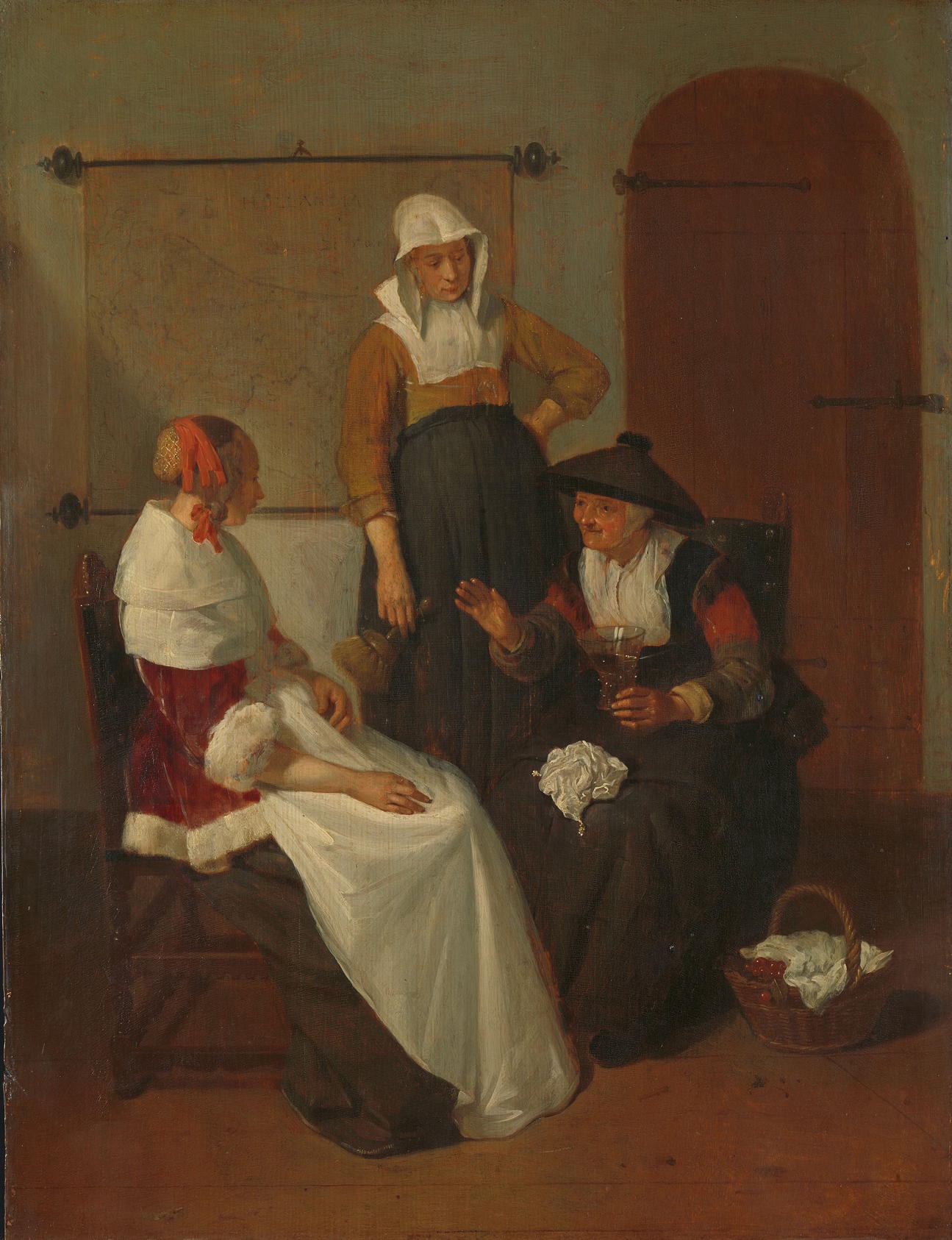
Quiringh Gerritsz. van Brekelenkam:
A Confidential Chat (1661)
" … engaging in solo dialogue …"
It's accepted wisdom within the publishing business that an author must know his comparables. This essential knowledge becomes critical when classifying a work, and classifying has always been necessary before a work can become a marketable book, for without a classification, no librarian or bookseller could know where to display the damned thing. So, a few years ago, I asked a friend who teaches library science at a prestigious Eastern university to gift me with a classification for my work. He returned with one I found only distantly satisfying: Historical Autobiographical Philosophical Fiction. He claimed this grouping included many of the most popular authors publishing today. I felt flattered to be included in any category, let alone such a prestigious one, but I couldn't help feeling like I was still missing something.
The authors he listed as comparables didn't seem to be in the same business as I had been.
HowIDo2
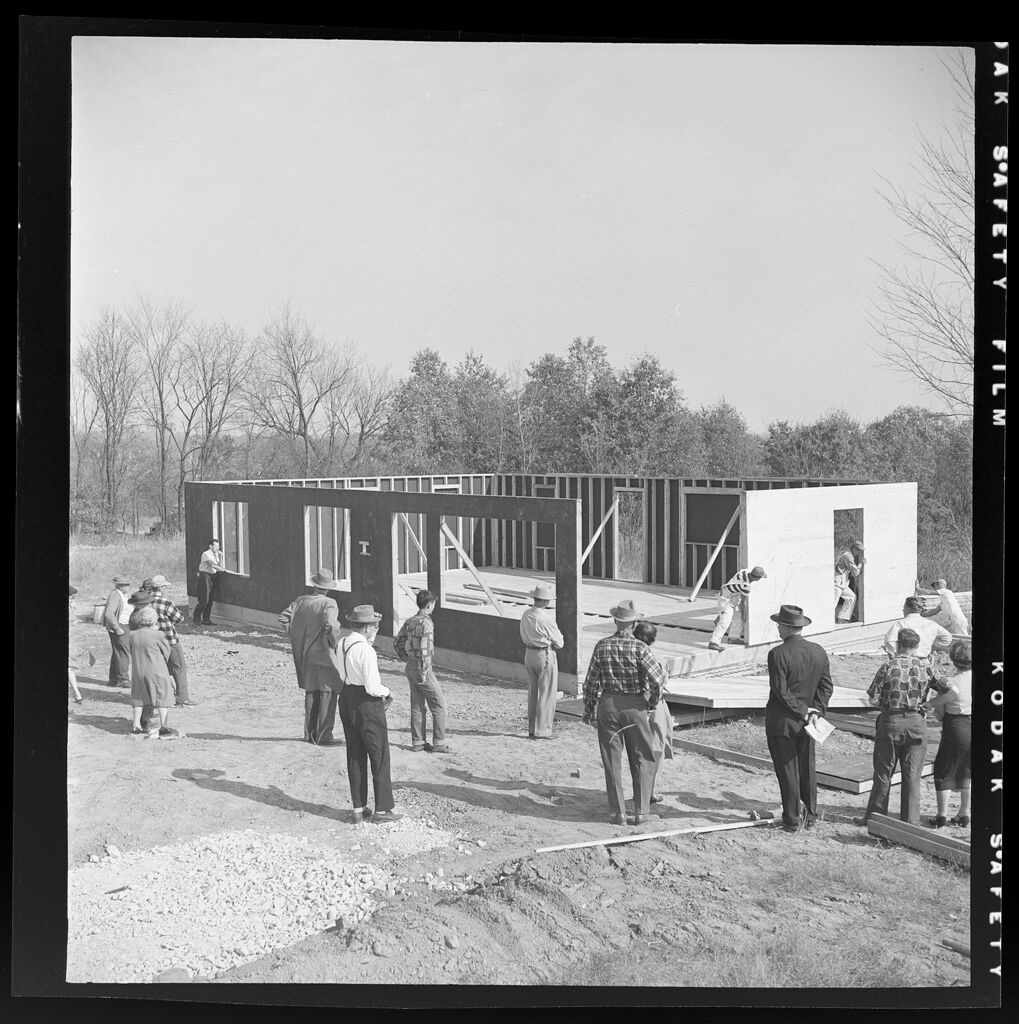
Jack Gould:
Untitled [workmen constructing new house] (1950)
“Another GoodNuff Story's published!”
Like with all activities, "finishing" does not necessarily mean done. I say I'm writing even though the writing might take up less than half the time I spend "writing." As I said in the last installment, the writing, initiated after lengthy context and content-setting work, occurs in timeless space. I must not think too much while writing lest I disrupt what might pass for flow. I learned long ago to separate editing from writing, for instance, because the two activities remain antagonistic and seem better left sequential. Once I've "finished" writing, I begin editing. If anything, I've increased my editing efforts in more recent years. I once over-revered my native voice, preserving my hems and haws as representing greater authenticity. In most realities, many asides make for difficult reading. Editing can streamline stream-of-consciousness writing, rendering it more palatable, understandable, and, therefore, more enjoyable to read.
I start my editing passes by slowing myself down.
HowIDo
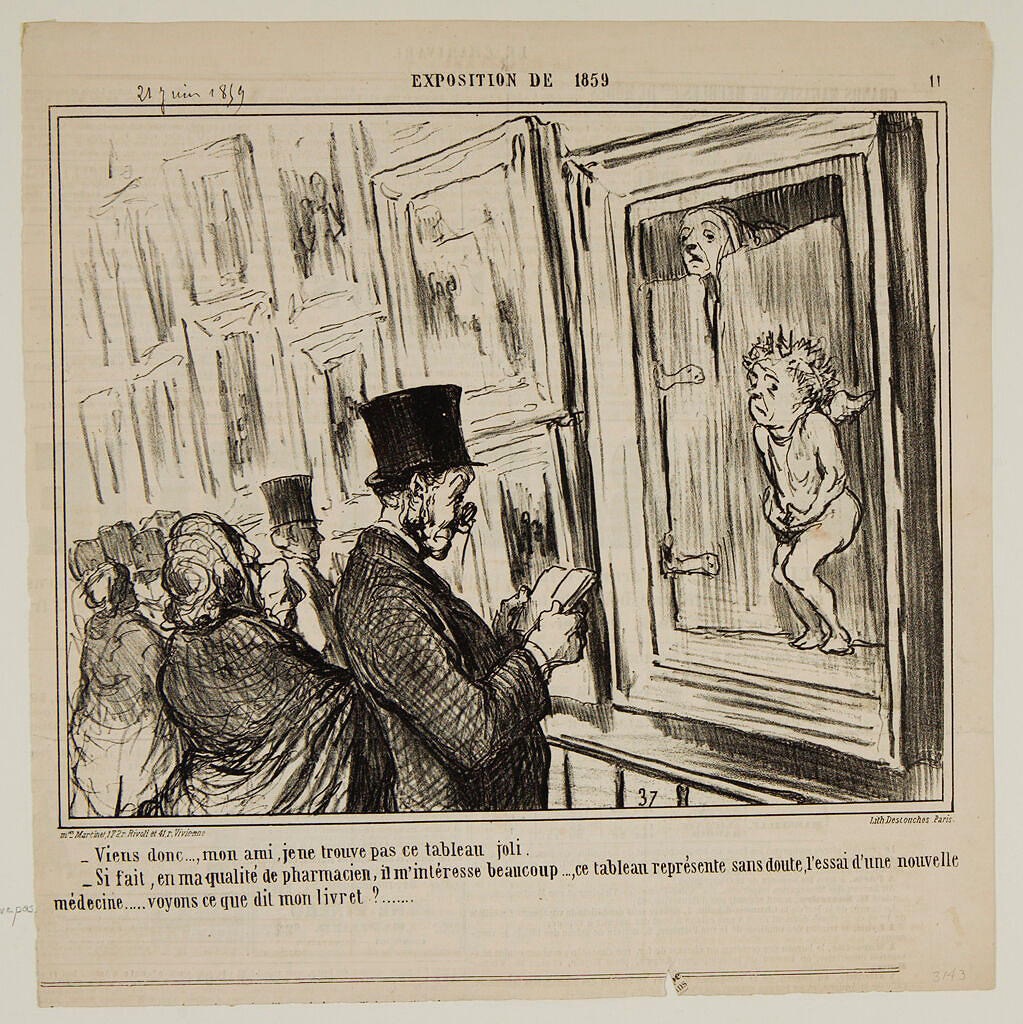
Honoré-Victorin Daumier:
"Let's go..., my friend, I do not find this painting pretty..."
From the book:
L' Exposition de 1859, 11 (Le Charivari, 21 June 1859)
Original Language Title:
"Viens donc..., mon ami, je ne trouve pas..." (1859)
Writing, like all activities, has little to do with itself. The activity of writing seems almost beside the point, for much context-setting and content-framing work must occur before writing can productively commence. These set-up activities sometimes prove insurmountable, especially if a writer cannot transform many into rote routines or preparatory rituals. I think of my writing set-up routine as sacred since all I produce must first pass through it. Without it, I could produce precisely nothing, so my HowIDo explanation seems worthy of perhaps even an overly wordy presentation with pictures. Here come some picky details:
Who knows where the idea of a story originates?
WhatIWillNot
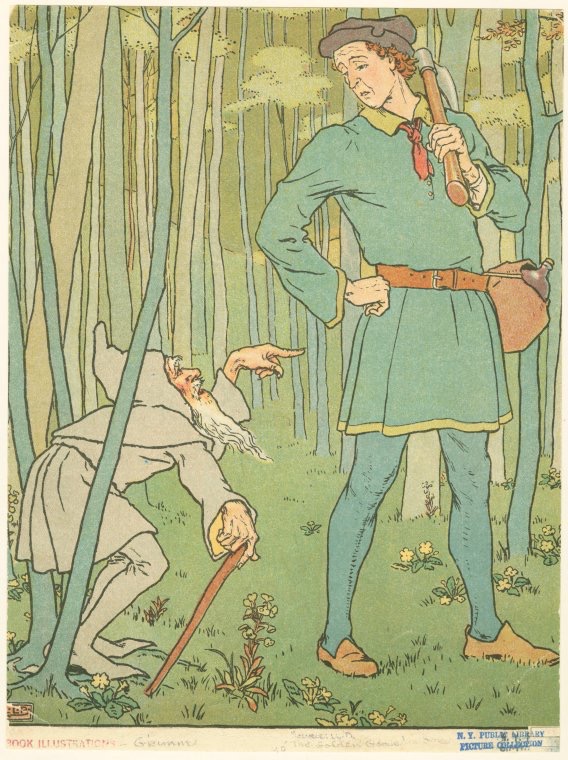
Leonard Leslie Brooke:
The eldest son refuses the old grey man
[from The Golden Goose Book] 1905
"I am my own audience."
I have made some decisions over the years I have engaged in this writing experiment. I have been honing my skills, which always involves removing some of the blade to improve performance. Less becomes more. I would write about anything early on, for my explorations remained relatively unconstrained. I had yet to develop many preferences and had not formed what I might describe as taste. I would catch myself being myself and sometimes quake at what I witnessed. That much of my early work was uninformed by very much of a body of preferences showed in ten thousand ways. With many repetitions, some druthers emerged slowly, ranging from preference choices to down-right insistences. Mark Twain insisted that the primary difference between the common jackass and the typical human has always been that there are some things a common jackass won't do. With adequate iteration, though, even the typical human might manage to back into a list of things he steadfastly refuses to do.
I refuse to dispense advice.
WhatIDo
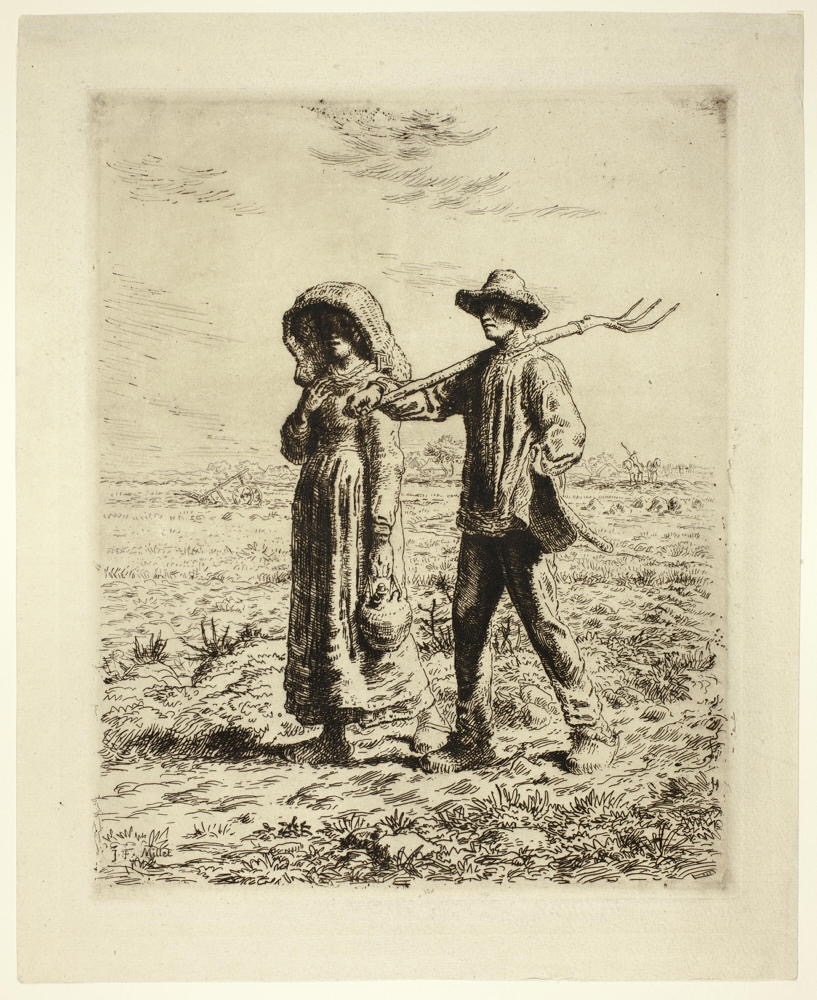
Jean François Millet: Peasants Going to Work (1863)
"If you glimpse yourself in there, you're finally seeing the other."
I write loosely autobiographical sketches, whatever that might mean. What that might mean remains an issue of considerable interest to me since I turn out to be the author of my experience, of these experiences. I harbor deep doubts that I know how to actually do what I claim to be up to. So deep run those doubts that they entice me up and out of my bed every morning to see if I might manage to prove my case to myself. Some mornings, I feel as though I've come close to approaching that purpose, but even then, I still feel aspiring.
My specific autobiographical details should properly be of little interest to any of my readers.
Writing Summary For The Week Ending 12/14/2023

Ishikawa Toyonobu: Writing on a Fan (1765)
"I work for nobody but my legacy and my readers now."
I have been wondering with renewed energy what I have been doing here for the past six and a half years. From the morning I began writing this series of series, Summer Solstice 2017, I have been dedicated to producing stories every blesséd morning. This occupation has almost always been refreshing. I do not very often consider this occupation all that onerous. I have been learning—perhaps even teaching myself—that my muse proves reliable. When I ask, she delivers. I seldom even need to insist. But now, as I look at this next to last week of my twenty-sixth series, I suppose I'm bumping into one of those Is That All There Is? Moments where I feel compelled to question purpose. I began wanting to describe my manner of living, whatever that might mean, and have ended up creating an overwhelming result, something on the order of ten thousand pages. It would take me over two and a half weeks just to read through the twenty-six manuscripts. I have copyedited only a few of them to completion. Am I destined one day to cease producing new stories so that I might focus my attention on the previously finished ones? I wonder what anyone might glean from reading them. I wonder what I might glean from rereading them.
I suspect my questions amount to completely normal ones, for nobody ever knows the ramifications of anything they're doing from the beginning. We begin in innocence—necessary and beneficial—and work toward experience. We should rightfully wonder along the way what we originally intended, whether that intention holds and has proven satisfying. As I back into the longest night of the year, my path should rightfully seem obscured. I had no real reason to believe that I knew what I was doing. I might feel perfectly free to change my justification along the way. I work for nobody but my legacy and my readers now.
BackToWork
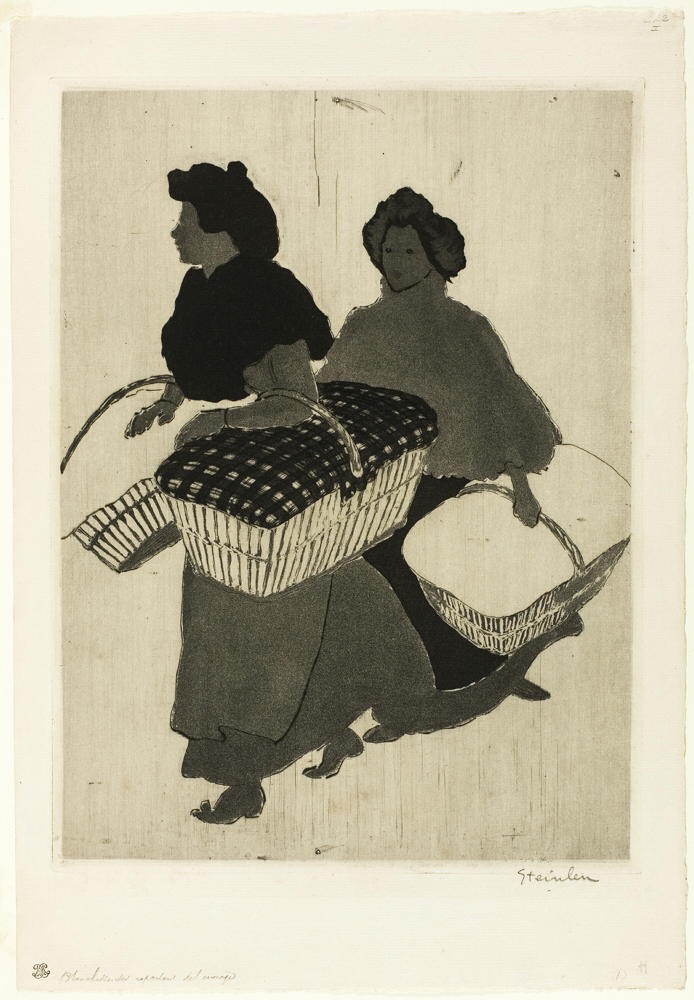
Théophile-Alexandre Steinlen:
Laundresses Carrying Back Their Work (1898)
"It might qualify as an obsession."
With one exception, whatever else I'm doing, I know what I should be doing instead. I should be doing my work instead of whatever else I'm doing unless, of course, I'm doing my work. I might be obsessed, though I confess I do not know how to do otherwise. My work calls me, and it punishes me if I do not heed it. I fear offending whichever god granted me my work, for I do not feel as though I chose it. Maybe it chose me. However it came to be, it owns me. It jealously guards my time, scrutinizing how I allocate it. I, therefore, inhabit one of two states. I'm either doing my work or playing hooky from doing my work. Doing my work does not satisfy any obligation I might hold to be doing my work. It's not worthy of reward, just not subject to chastisement.
When doing my work, I do not feel haunted by ghosts pulling me back into my work.
PublicService
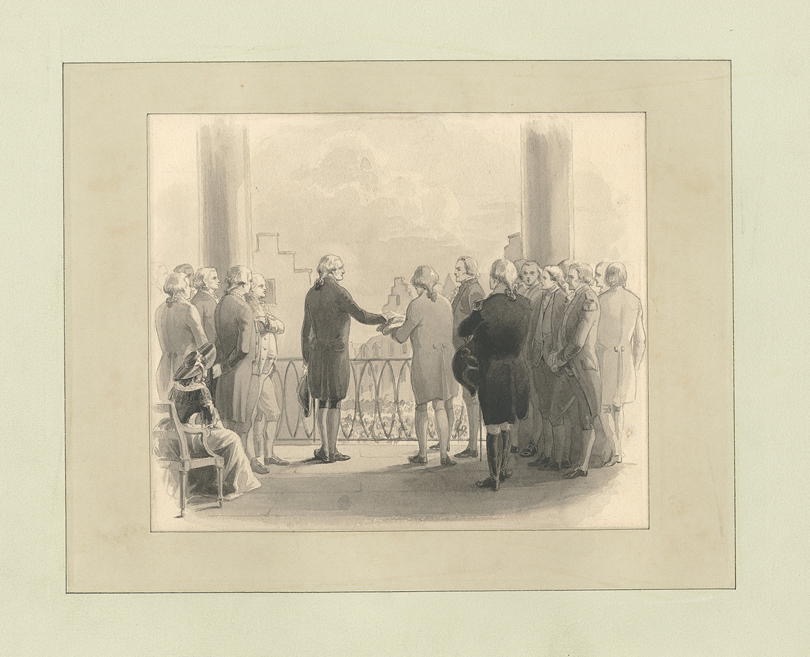
Unknown: Washington swearing the oath of office (nineteenth century)
" … the only thing standing between any of us and absolute tyranny."
The Muse returned from Port Commissioner Training with new information. She'd won the election with less than a complete understanding of what she was running for then. The office had a rough job description, but then job descriptions, by long tradition, barely scratch the surface of describing actual responsibilities. Historical precedent tends to expand or contract the delineated scope, and simple preference can profoundly influence what such jobs entail. She could become an activist or a pacifist, depending. The training presented legal boundaries and explained implications. The notion that candidates cannot be required to satisfy certain conditions proved to be among the more surprising revelations.
Candidates have always been required to meet two broad conditions: that they are a citizen of a certain age of the municipality within which they intend to serve and that they swear to uphold the constitution of that same place.
TheBus
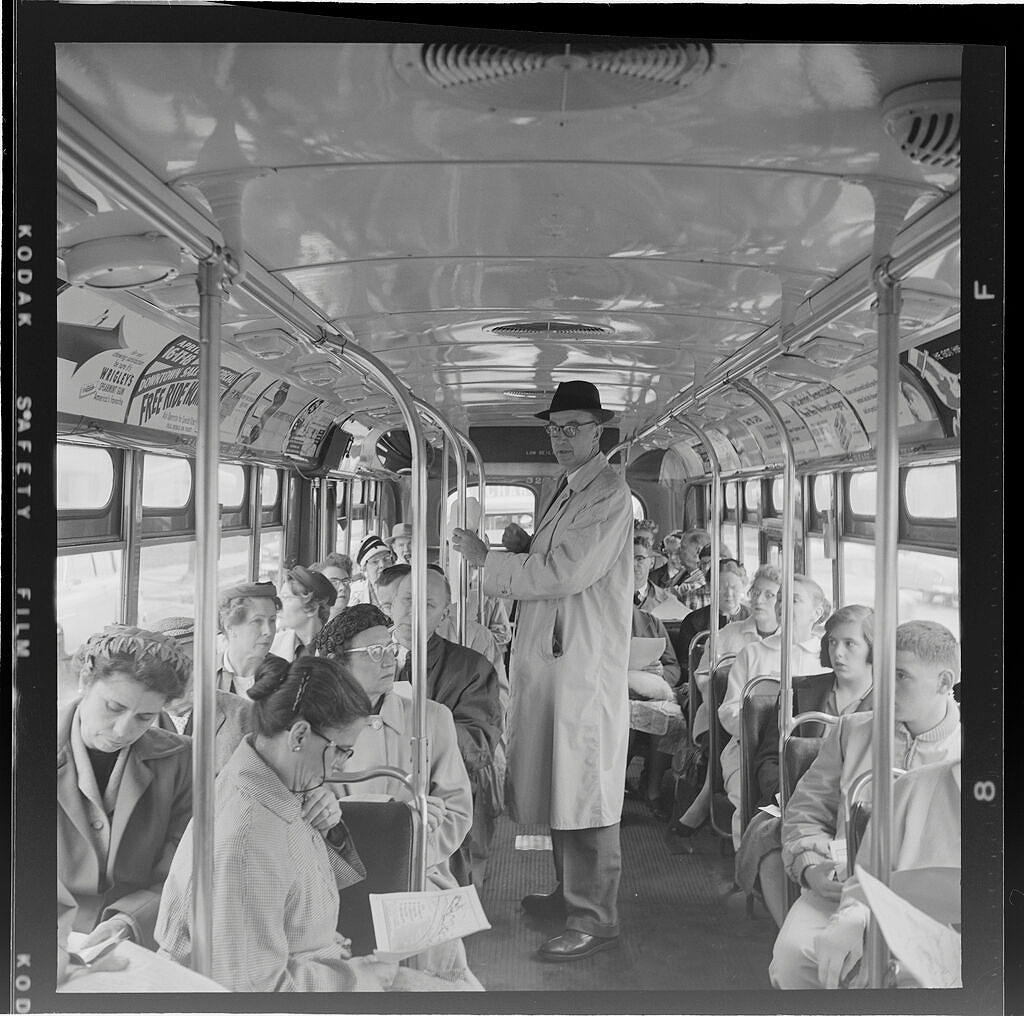
Jack Gould: Untitled (passengers on crowded city bus) (c. 1950)
"I wonder if we'll follow through."
Elizabeth, the other car I primarily use as a pickup, even though it's a luxury Lexus, was in the shop but ready to get picked up. I decided that I would, for a change if for nothing else, hop TheBus down to the shop. I could have walked it in reasonably short order, but it was a drizzly morning, and after last week's traveling, I needed something different. The Muse said she could just drop me off, but where was the adventure in that? I invited her to ride TheBus with me instead, if only to see how some of her new constituents lived. She accepted.
The Muse and I are staunch bus veterans, each hopping busses through most of our first professional careers.
ShowingUp

Jan Toorop: The Arrival of the Muses of Art at Architecture (1890)
" … tomorrow will bring yet another opportunity for selfless service."
The ArmCandy role requires more than merely SuitingUp. The successful incumbent must also ShowUp at a surprising variety of functions, many innocuous and many others substantive. Evenings, once reserved for rest and recuperation, become crowded with invitations. Organizations of every stripe send invitations where the Commissioner simply must appear. Her appearances with ArmCandy in tow might improve her visibility and effectiveness. I'm expected to show up invisible, sans obvious agenda, and do little more than whisper encouragement and questions. I do not have to pay attention to the proceedings. Indeed, it might be better for all involved if I reserve comment, for I'm no fool. I carry decades of group process experience and can determine when another cluster fuck's emerging. It's not the ArmCandy's job to intervene, though. I can mutely watch or quietly excuse myself when the proceedings turn too dicey.
Of course, I'm not merely The Muse's ArmCandy.
SuitingUp
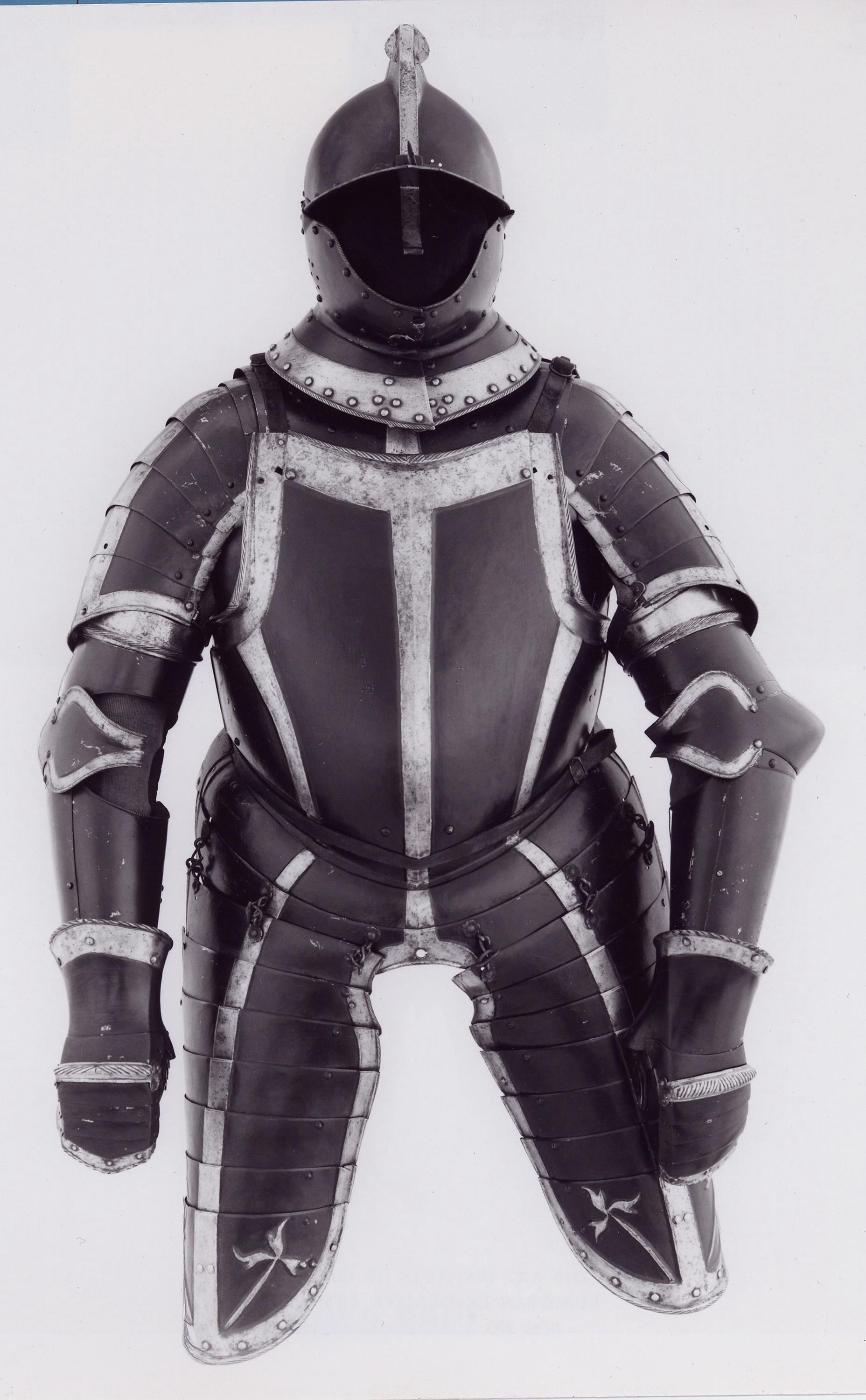
North German: Infantry Armor (c. 1550-60)
" … may I please remember who I've been and who I became …"
Starting to explore the positives associated with my new role as ArmCandy, I experienced a sensation from the past when dressing for an outing: the feeling of truly fine shirt fabric against my skin. I surrendered my wardrobe once it became moot. When I no longer had any reason to be SuitingUp in the morning, I reverted to more practical choices. My three-piece suits fell into disuse. Even my sports coats moldered in the furthest back corner of my closet. Most eventually gravitated toward a donation bin at a local Goodwill® shop and were soon forgotten. Not so easily discarded, though, was that sensation of SuitingUp. I missed that ritual, that reassuring sequence of unfolding the laundered shirt and putting on those pants, choosing a tie to match, and filling my pockets with wallet, comb, and handkerchief. I wouldn't leave until I'd passed muster with everything in place. I felt as though I was donning my armor in preparation for combat. I probably was.
In the evening, I'd reverse the sequence.
ArmCandy
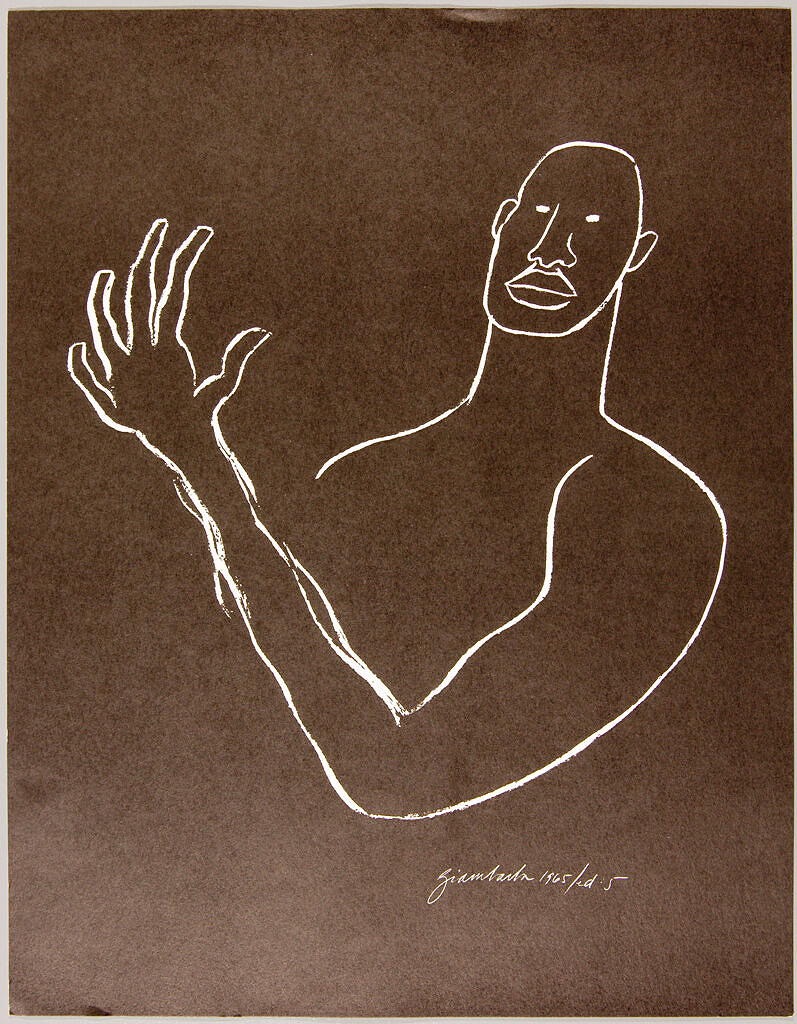
Paul Giambarba: The Withered Arm (c. 1960)
" … practicing holding out my pinkie finger just so …"
The Muse was invited to attend a Port Commissioner Orientation session as her first official function in her newly elected role. This would undoubtedly be the first of innumerable functions she will attend after she's sworn into office later this month. Like many elected offices, the Commissioner's role might be fairly classified as functionary since it involves performing official functions, often publicly. These will include endless lunches and official dinners, many of which the spouse has traditionally been obligated to attend. As the first female Port Commissioner in this body's history, The Muse drags along her form of First Husband rather than the more traditional aging bride. The beauty accompanying the functionary beast has traditionally been colloquially referred to as ArmCandy, a role I have now been conscripted to play.
I was not elected to the ArmCandy position.
Writing Summary For The Week Ending 12/07/2023
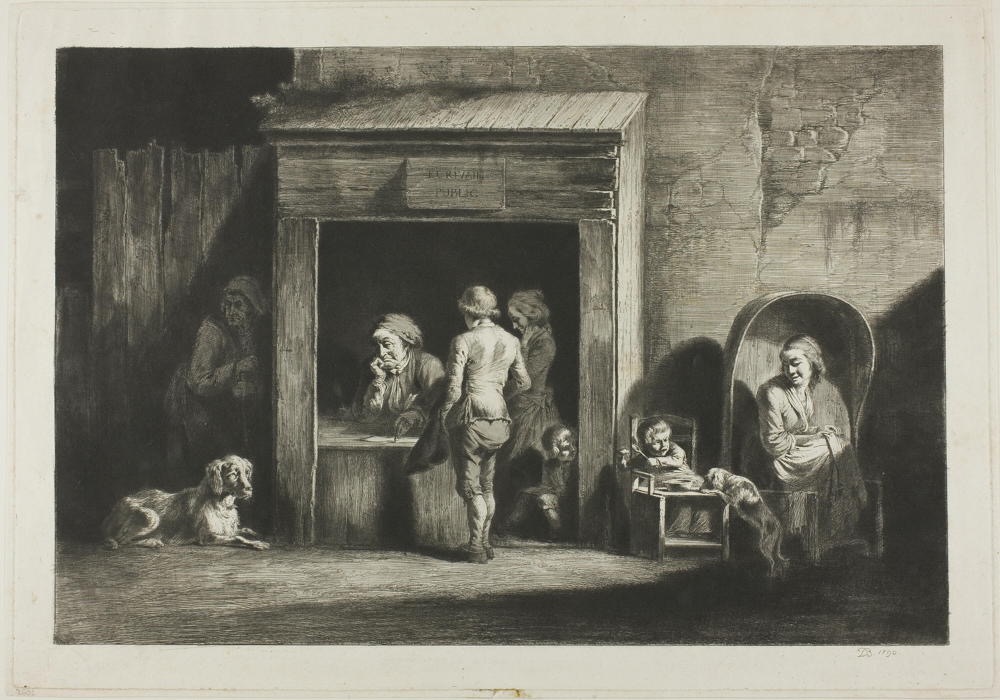
Jean Jacques de Boissieu: The Public Scribe (1790)
To Thrive On The Absurdity
They refer to them as old haunts not because the present revisits the past there but because what's now past was present then, and we who were present were ghosts then, just as certainly as we continue to be ghosts today. Consider how much of our presence hung around on that stage to be revisited later. (Nada!) This writing week's revelation revealed simply that concept, as I attempted to explain in GhostVisiting. I barely qualify as a being, just about as much as I ever qualified as a had-been or as a has-been, either. I keep moving, hardly resting between infatuations, sincerely dreading each new attraction. I remain sincerely up to something of very little consequence. I almost exclusively accomplish the ethereal. I produce little material, rarely bothering to print off my production, that being both expensive and curiously redundant. My work should properly remain virtual, ghostly, and essentially immaterial. I amuse myself by making my keyboard click. I seem to thrive on the absurdity of this.
ChildishThings
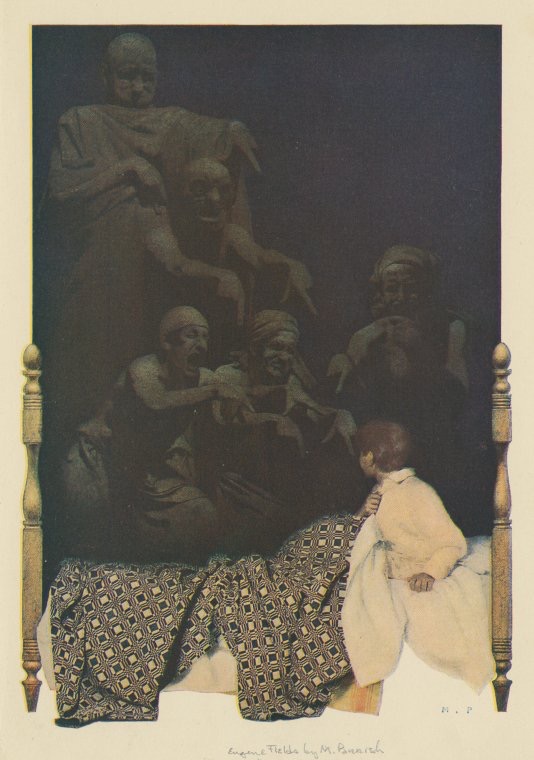
Maxfield Parrish: Seein' Things (1904)
"I was once addicted to life …"
Aging seems to reduce into a process of weaning myself off earlier fixations, some of which managed to metastasize into genuine addictions while others never progressed beyond predilection. Of all the so-called skills I've acquired in this life, my begrudging ability to break entrenched behavior patterns amounts to my greatest superpower. I always initiated these terrible interventions under unadvantageous circumstances, often without a shred of evidence that I might succeed. I initially forced myself, no matter how necessary or desperate the effort. I never once wanted to grow up in that way, to finally face responsibility and make anything better. I was never courageous, never brave, though I admit that I sometimes ascribed success as the result of my dedication rather than desperation.
Meals were once a necessity.
GhostVisiting

Albrecht Dürer: Descent of the Holy Ghost (c. 1510)
“I must be the ghost of my Christmases past …”
The Muse, my son Wilder, and I reverently stood in shock over my daughter's gravestone. The conflict inherent in seeing evidence of a member of the next generation gone took my breath. Whatever story I might have conjured to explain her absence these last two years and ten months resolved itself in granite, for there it was, the name my first wife Betsy and I had given our darling baby daughter, etched in stone, the stone of her maternal great grandmother with whom she shared the name Astrid and now her grave. I've always loved that name, and it so well complemented her first name, Heidi. Heidi Astrid, 1982 - 2021: was her presence already receding, or was ours just proceeding onward?
There are many reasons we pray that our children will outlive us here.
GhostWriting
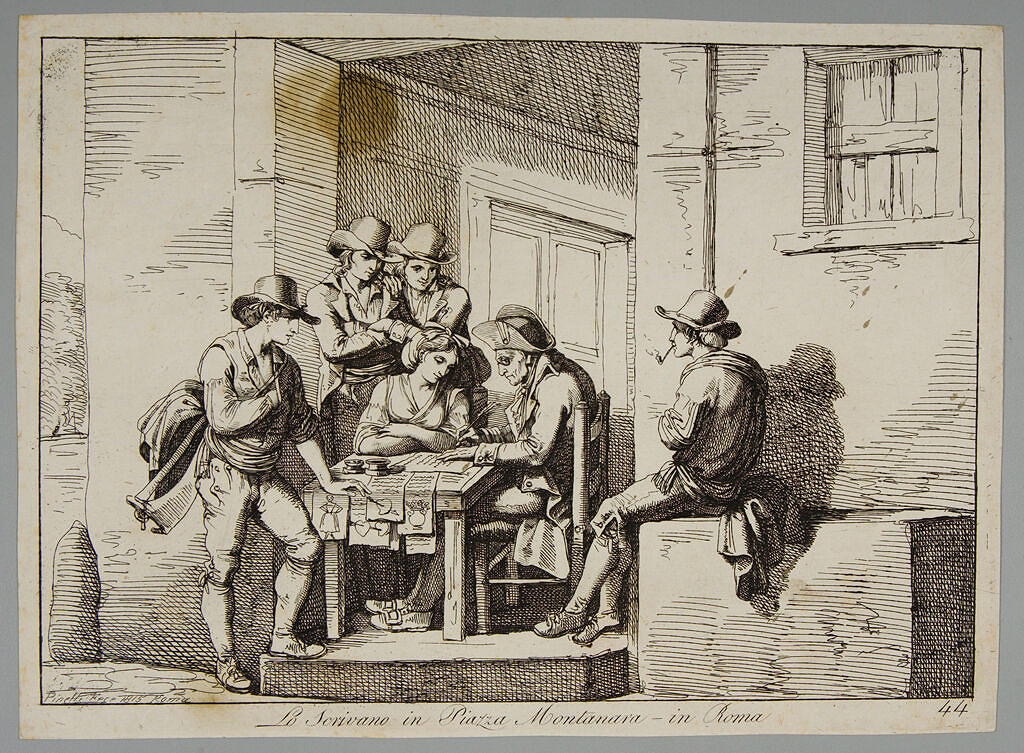
Bartolomeo Pinelli:
The Letter-writer in Piazza Montanara in Rome
(19th century)
" … an utterly impossible aspiration …"
This week's excursion has taken us into territory I once inhabited, though seemingly several lifetimes ago. I have been experiencing real trouble distinguishing between now and then, and I'm finding that I revere the past more than the present. The present seems like a Fun House Mirror reflection of the familiar, similar but degraded, whatever the advertised improvement. The world has changed over the last fifty years but somehow failed to improve, for the replacements I find masquerading fall utterly flat when attempting to live up to even a distant shadow of my expectations. When home, continual exposure lessens this effect, though it's certainly still present. Traveling, I have only current sensory experience to compare with my expectations, so I live in continual discouragement.
I remember when because I still live there.
Vexpectations
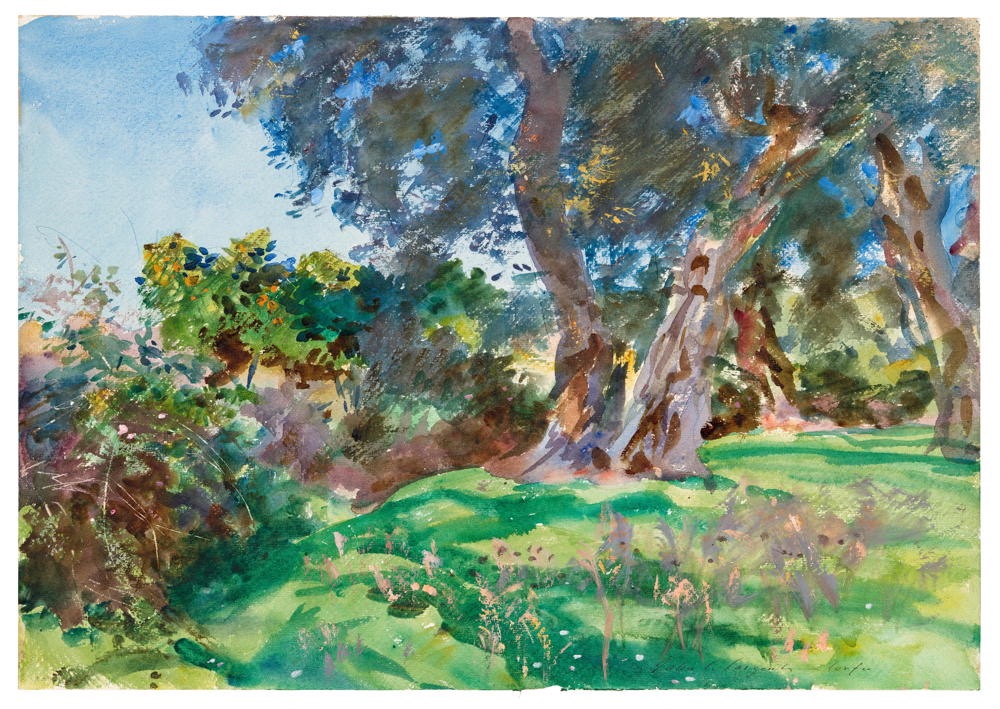
John Singer Sargent: Olive Trees, Corfu (1909)
" … just the sort of vigilance succeeding demands."
Much of whatever ends up constituting GoodNuff stems from expectations. It seems I can guarantee better-than-expected results by merely expecting things to turn out worse. While this focus might produce an Eeyore existence, it might reasonably assure that actual experience, aside from the self-induced expecting, reliably ends up being better than expected, if only because whatever else I might propose, the worse rarely results. More often, an outcome registers a meh on the grand scale of experience, neither great nor terrible, somewhere in the middle. The outcome might only sometimes register, given the swirl of experiences stemming from a swirl of expectations. Connections easily get lost and seem meaningless. Even when I fuss and fret, my anticipations might get lost in rounding on my monthly account statement. It sometimes pays to be inattentive.
Our drive from Portland to Sleaseattle proved almost effortless, even though I'd invested so much time dreading the experience.
Dread

Cornelis Anthonisz:
Allegorie met Waarheid, Kennis, Haat en Vrees
[Allegory with Truth, Knowledge, Hatred, and Fear]
(1507 - 1553)
"I seem to chase off worst case scenarios …"
I prepare for each of my adventures by practicing Dread. Over my lifetime, I've fed myself so much anticipatory doom that it's a genuine marvel that I have somehow survived. I might have succumbed to the effects of pre-living my demise. My salvation might no longer be possible by any means. I might have doomed myself by conjuring visions of my end whenever I even consider engaging in anything. If we get what we expect, I should rightfully expect Hellfire and eternal damnation coming, for that's surely what I have been expecting, though every damned time so far, I've somehow sidestepped that sure and all but inevitable fate. I suppose that it's never too late to fail, but my long string of successes has so far delayed the reckoning. I feel certain each time, though, that this time, I might finally be destined to succeed in failing, and so I dread anew.
I invested much of the week before this latest excursion, denying it would happen.
Hardworker
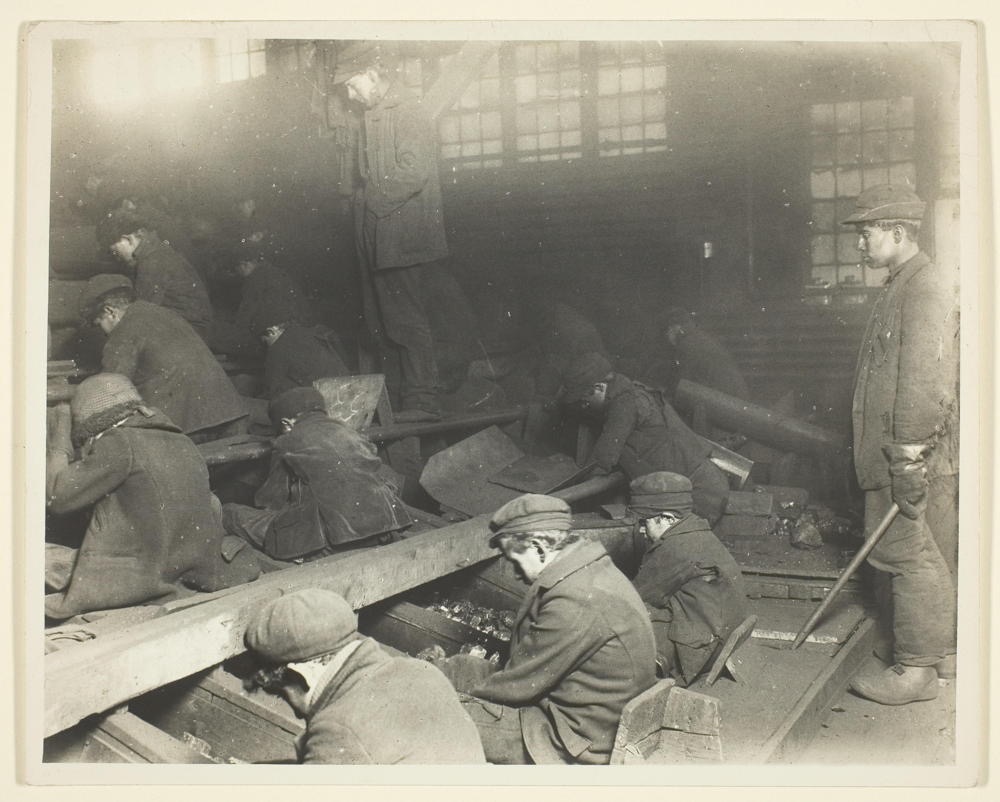
Lewis Wickes Hine:
A View Of Workers In Ewen Breaker
Of Pennsylvania Coal Company (1911)
"One might, with practice, even eventually become an EasyWorker sometimes."
Whatever the profession, in this culture, we expect every practitioner to be a self-proclaimed HardWorker. Hard work, as opposed to all the other kinds of work, seems to be an integral part of the much-touted and probably mythical American Way. If we're not killing ourselves to maintain our existence, our existence ain't worth much. HardWorker seems to be the essential marker of morally upstanding people, too, for lowlifes seem best characterized as slackers. HardWorkers have no time for lowlier pursuits. They're tuckered out by the end of their shifts.
Curiously, the HardWorker designation belongs to more than just the exhausted laborer.
Writing Summary For The Week Ending 11/30/2023

After Raffaello Sanzio, called Raphael:
Seated Youth Writing in Book (17th/18th century)
I Am Not As Advertised
The freshly shaven yard looks more like a golf green than anything I should be walking on. I remind myself just how powerful I always was when wielding a simple fine-toothed steel-tined rake, standing up the grass, wrenching out tangles and moss. The soil underneath seems more moist than it's been since last December, with tiny, shiny red ornamental crabapples hiding in the crevices. A flight of geese startles from the nearby creekbed, fleeing into the past participle of themselves in the process: A Fluck of Geese. The scents and colors suggest Galacia, some Old World land between empires. I am a peasant at heart here, and may I always remain one. I tried to take comportment lessons, to dress in the proper colors for each season, and to become invisible in the hope of fitting in. Proper society struggles to permit requisite variety, and so always works to undermine its stated intention. I write, and so I eventually tend to embarrass myself. I am not as advertised, thank heavens, and am in no need of reform.
Enormity
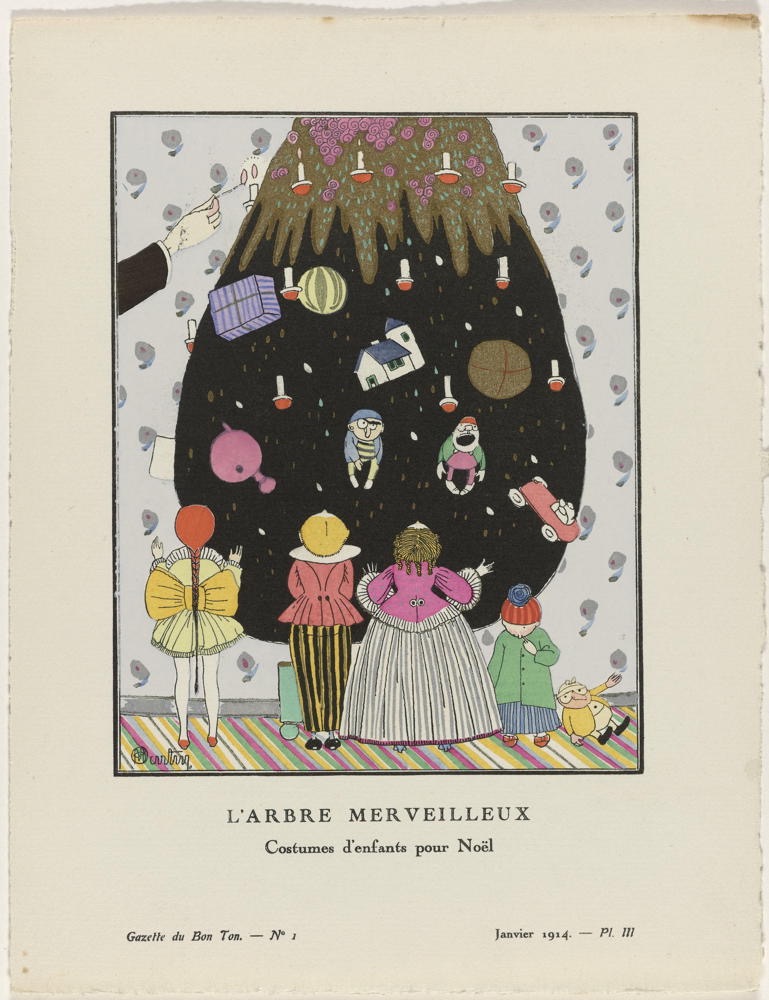
Charles Martin:
Gazette du Bon Ton, 1914 - No. 1, Pl. III:
L'Arbre Merveilleux / Costumes d'enfants pour Noël (1914)
"The magic only ever comes after I feel overwhelmed enough… "
Once the leaves fall, the street opens up, appearing much broader and longer than during Spring or Summer. With winter closing fast, the world seems to be expanding. Its expectations stretch, too. I feel humbled by the sheer Enormity of the upcoming weeks. They seem irreducibly huge, and I feel incapable of coping with the expectations they bring. More threat than promise, the holiday season falls upon us, bringing a fresh set of obligations while we seem to have yet to greatly expand our capacities. These two hands will not become three regardless of the needs encountered. These two feet will slip when the street freezes. Socks have already become a mandatory part of the standard uniform again. I feel like Atlas, expected to hold the world on my shoulder, or Sisyphus, rolling the world uphill like a boulder, only for it to slip back toward the bottom again and again. It's Autumn for a reason.
I suspect that fresh challenges feel overwhelming for that reason.
Indecision
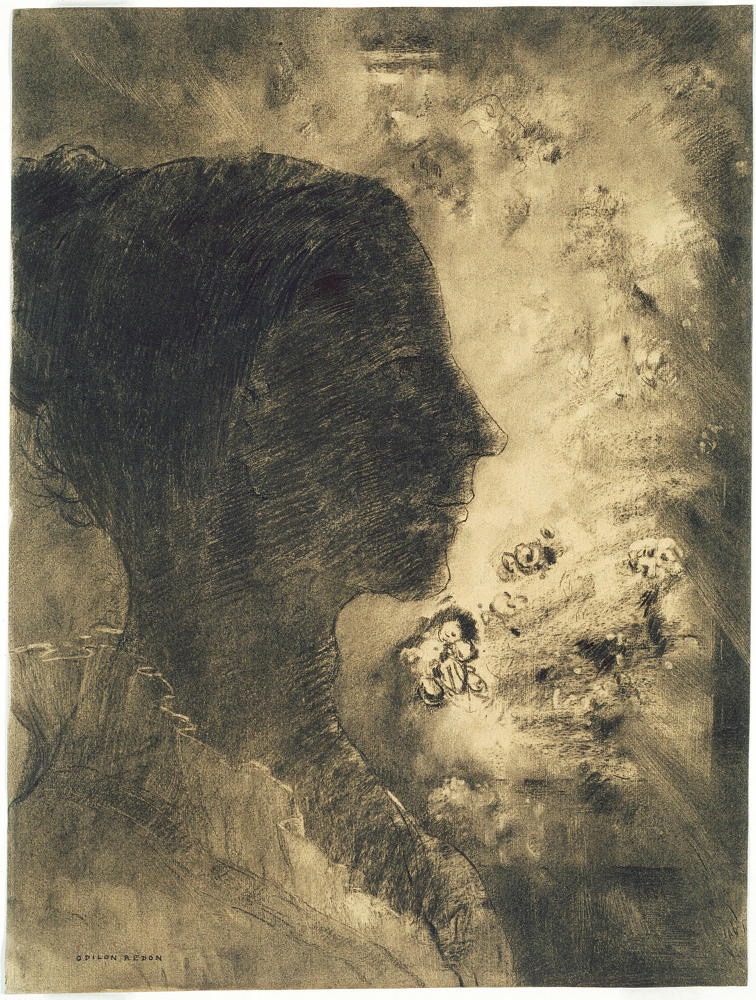
Odilon Redon: Profile of Shadow (c. 1895)
"I'm still not doing anything except not deciding yet."
Growing up in the Inland Northwest provided ample opportunity for me to study the fine art of Indecision. I've seen innumerable books touting The Art Of Decision-Making, but I've seen none promoting its equally important opposite, for Indecision seems every bit as essential, if not more so, as its counterpart. Here, for instance, the winter weather patterns offer almost endless Indecision points. The Muse and I were planning to drive to the state's Western side. Which route should we take? In November, the mountain pass route rarely seems the best choice, for capricious snows and such complicate passage. The alternate route, down the vaunted Columbia Gorge, also offers complications with notorious winds and frequent weather changes. Two days out, Indecision rules, and while it might seem necessary to—just Decide, already!—the tenets of Indecision counsel otherwise.
In this culture, Indecision is widely considered the eighth mortal sin, following and resembling sloth, for Indecision seems like nothing, and nothing's never considered a viable choice.
Conventions

Attributed to Firuz Mirza Nusrat al-Dawla:
Practice Calligraphy [Siah Mashkh] (c. 1850-1886)
"Writers create by means of surface imperfections."
Each profession and every practice holds certain principles and actions as necessary and sufficient. We, especially fellow practitioners, hold anyone claiming to practice a discipline responsible for exhibiting these skills. Innovation comes from flouting these rules, often at the cost of early adopters' reputations. Early in his career, the art establishment did not hold Matisse to be a very skilled painter. He flouted color Conventions, for instance. The earliest Impressionists couldn't paint straight, apparently incapable of reproducing with photographic integrity. The earliest abstractionists were considered crazy, mainly because the orthodoxy could not comprehend the artists' Conventions, which were still evolving. Eventually, Matisse came to exemplify an evolved set of Conventions, as did the impressionists and abstractionists, though their Conventions, too, were later flouted by upstart practitioners.
Paul Lynch, who won this year’s coveted Booker Prize, declared, “Well, there goes my hard-won anonymity,” as he accepted his prestigious prize.
ThePalouse
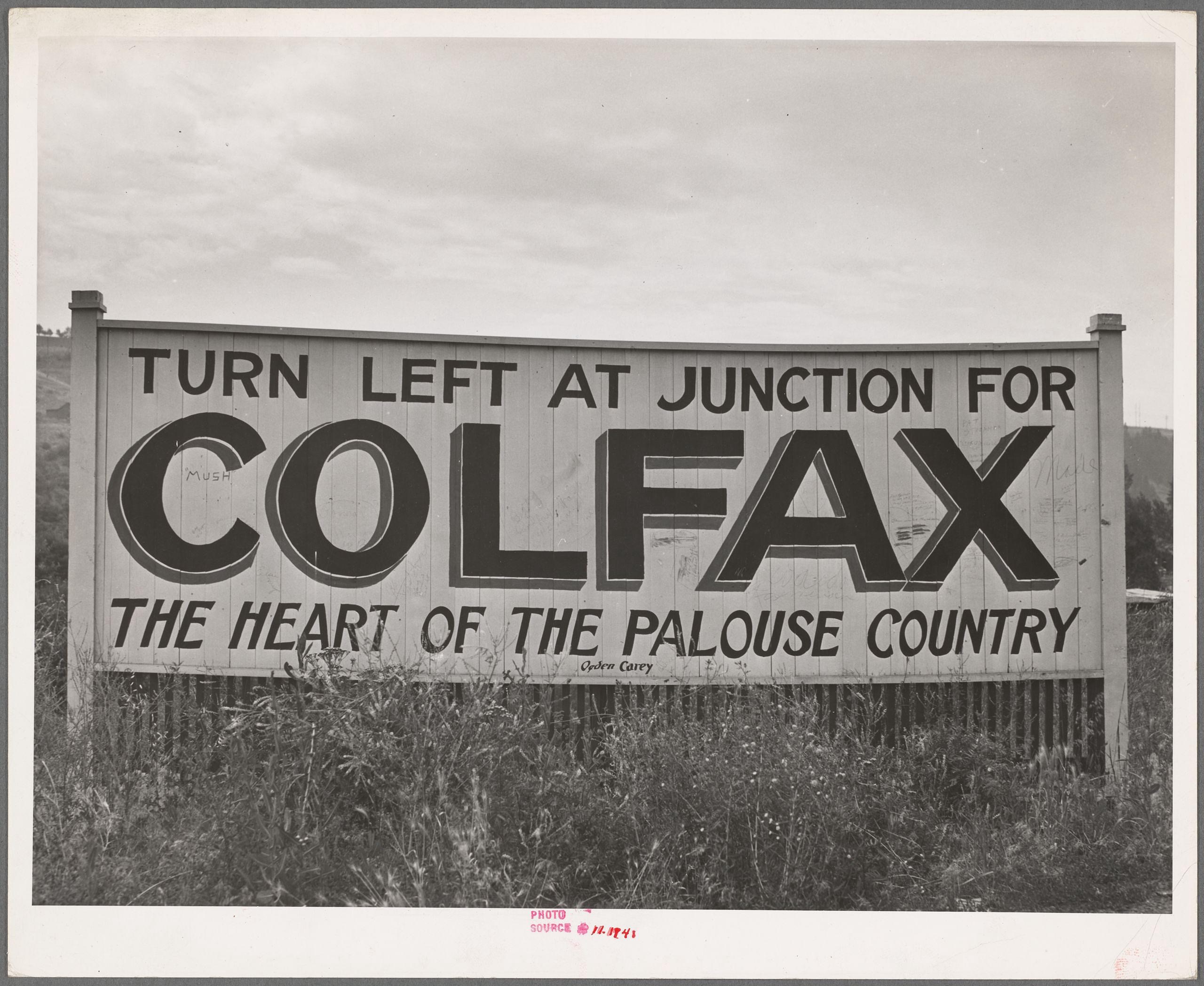
Russell Lee: Sign. Whitman County, Washington.
The Palouse country is most famous for its extensive wheatland
(1941)
" … dense fog settled around us."
Just to the north of this valley lies a rare country on this continent and in this world. Loess hills define Palouse Country, an area South of Spokane and West of Idaho, East of I-90, and North of the confluence of The Snake and Columbia Rivers, something less than a hundred miles square. Within this space lies considerable space, as if wide open was reimagined and arrayed in three full dimensions. Within its confines, tiny towns and isolated wheat stations dot a rolling landscape where wheat and lentils grow, and some of the finest barns anywhere stand. Driving through ThePalouse has always been a cleansing, a new beginning, a small vacation into another world.
I can't imagine ThePalouse when I'm not embedded within it.
Trajectories
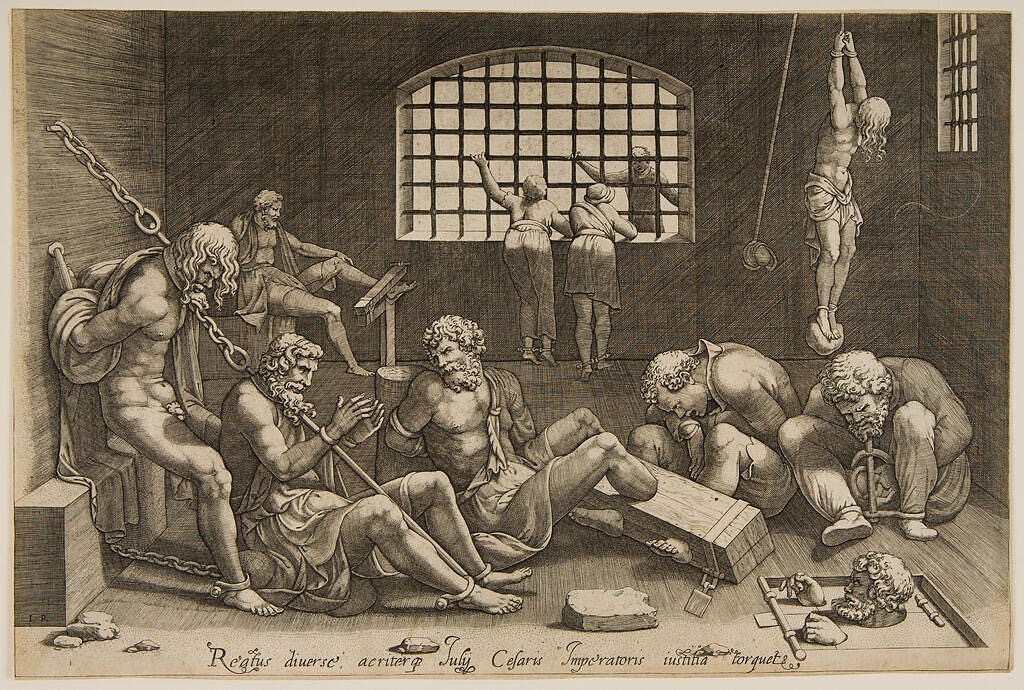
Giorgio Ghisi?, After Giulio Romano:
The Prison (16th century)
" … Trajectories upon which I warmly rely."
This week, I stumbled upon a short video of astrophysicist Neil deGrasse Tyson describing what science has discovered about the afterlife. He was brief and unemotional as he explained that neither biology nor physics has anything to say about the subject. Neither field has uncovered any evidence that such a state exists in nature. Of course, other fields exist. Theology, for instance, seems to have little to say besides afterlife commentary, though different branches have produced different stories. Most theologies at least agree that such a state exists, though they, too, lack the observable proof any physical science requires. Theology and related fields inject a property science refuses to employ: belief. They circle their square by insisting that their perspective only works; indeed, it was only ever intended to work for those exhibiting steadfast and unshakeable belief in it. Their philosophy seems to sum to, "If you believe in it, it will manifest."
I have long jealously admired the facility with which true believers navigate this world.
NaughtKnowing
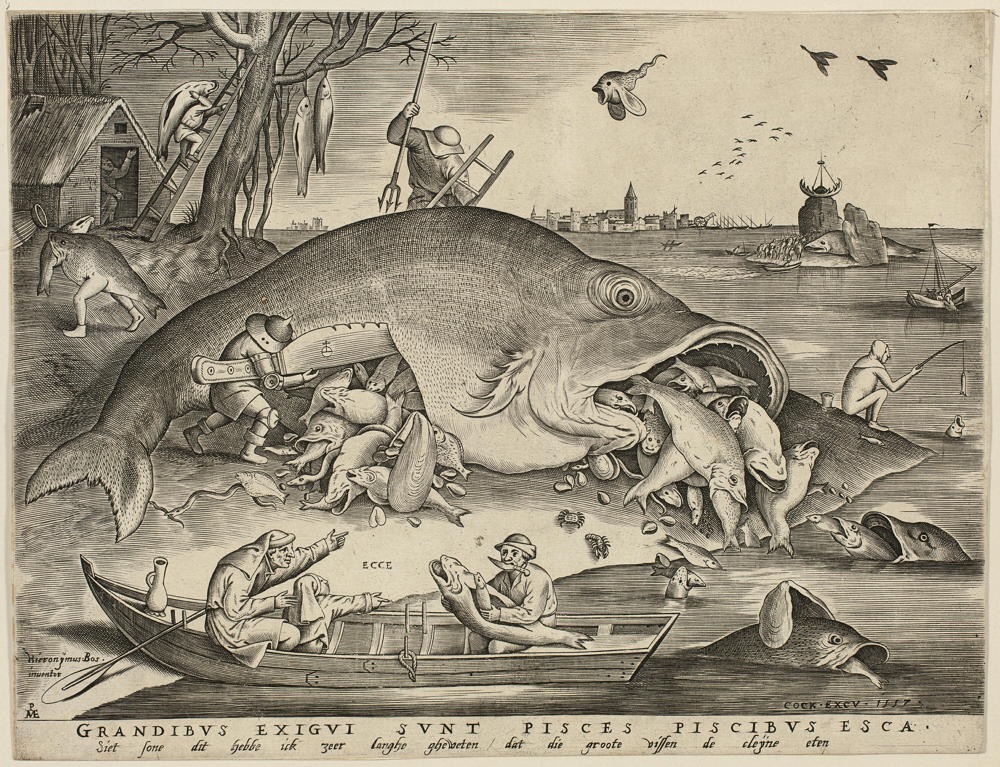
Pieter van der Heyden
after Pieter Bruegel, the elder
published by Hieronymus Cock:
Big Fish Eat Little Fish (1557)
“I hope somebody influential is praying for us.”
The cobbler and I inhabit different worlds. As I appreciated him for fixing that pair of boots, I asked him how long he thought he might continue practicing his craft. "Well, I turn seventy next week," he replied. "It mostly depends upon how long the government will let me continue." What followed left me gasping. The most remarkable spew of hearsay and innuendo I'd ever heard described a world I was not familiar with, one where our government conspires against innocent shop owners to undermine their lifestyles. "That carbon tax should have been put to a vote. It's illegitimate and will eventually raise the gas price by a dollar a gallon!" As if that would be a bad thing. How else could our government convince people to use less gas if it doesn't raise the price of it?
After The Muse and I made our awkward escape, I realized that I'd witnessed Confirmation Bias in action.
Writing Summary For The Week Ending 11/23/2023

Pierre-Paul Prud'hon: Dr. Thomas Dagoumer (1819)
The Fussing Seems Eternal
I often wonder what benefit my writing provides. I engage in the sometimes requited belief that engaging might eventually accomplish something, though the progress most often seems slow and almost begrudging. Some weeks, I could swear nothing happened. Other weeks seem filled with insights and other visitations. This writing week represented a transition from a period where it might have still been possible to deny the encroaching winter into when that would no longer seem plausible. Denial or acceptance seem the stark choices. I usually tend toward choosing both, investing without going all in and denying without constructing much of a believable argument against. I often feel in suspense, between, impending. This week, I seem to have successfully transitioned from before into now, from past into my next future. I have a scant month remaining before this GoodNuff Series will be finished. I suspect that this series has been progressing normally. Once I've cleaned up the leaves, I move on to other fussing. The fussing, though, seems eternal.
Prep
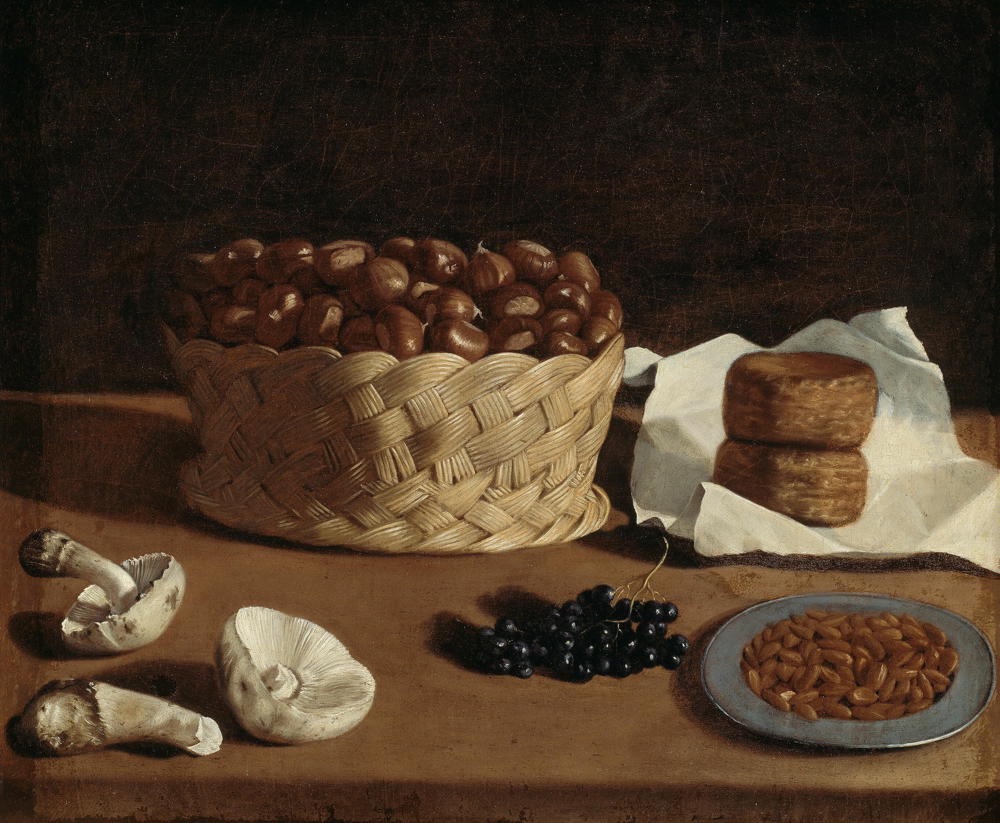
Attributed to Paolo Antonio Barbieri:
Kitchen Still Life (c. 1640)
"Bless all those less fortunate than us."
The Muse and I celebrate holidays primarily through Prep. The actual feast always turns out okay, but it takes so little time compared to completing the steps leading up to the sitting. Prep typically starts weeks in advance, with The Muse initiating some of the effort. In between, there's much gathering and sorting, considering and deciding, baking and boiling. There were times, much earlier in our relationship, when all this effort seemed unique. Now, it's taken the form of ritual, still unique enough but also terribly familiar. We solve few mysteries between larder and table, besides the pedestrian kind of finding key ingredients like Giblets. We're not interested in what The Post and Times suggest we include on our menu, for we're observing traditions stretching back generations. And, no, there will be no Jello® salad served.
I say "we" when I mean "she” for The Muse performs the bulk of the Prep.
Fogging
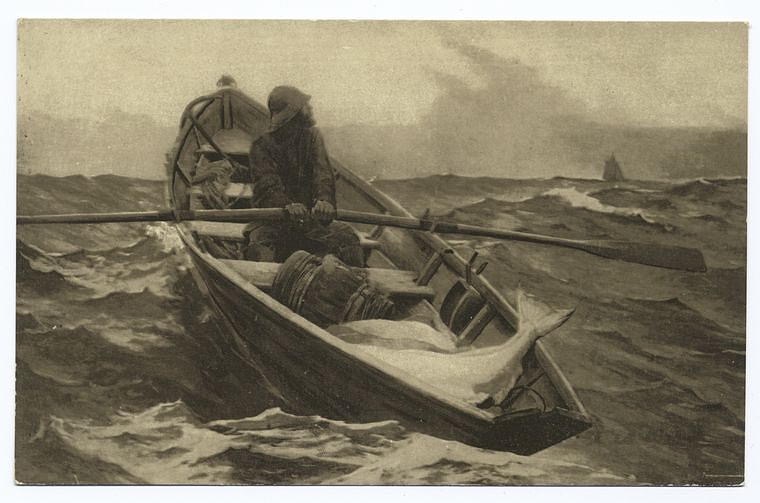
Winslow Homer: The Fog Warning (1905 - 1915)
" … remind us what we cannot see …"
I hail from the country Rudolf The Red-Nosed Reindeer must have hailed from. Come November, and through into the following year, we experience deep, sometimes freezing fogs. We locals curse their arrival as our nearby neighbors enjoy clear skies. We valley-dwellers know the curse. We lose our horizon. We lose our stars. We cannot see to the end of our own block. We drive as if suspended within space and time, both more visible than useful. We hear of the Fog of War but know The Fog of Everything, for fog becomes our baseline experience through those darkening weeks. We have The Fog of Breakfast, The Fog of Lunch, The Fog of Supper, as well as The Fog of Midnight and The Fog of Noon. Veterans have spent at least one night in Seattle after their late-night flight was forced back due to limited landing visibility here. We could see clear down to the ground but not straight ahead. Fog messes with your head.
I'm trying a fresh attitude toward our hazy resident this season.
Hexpectations
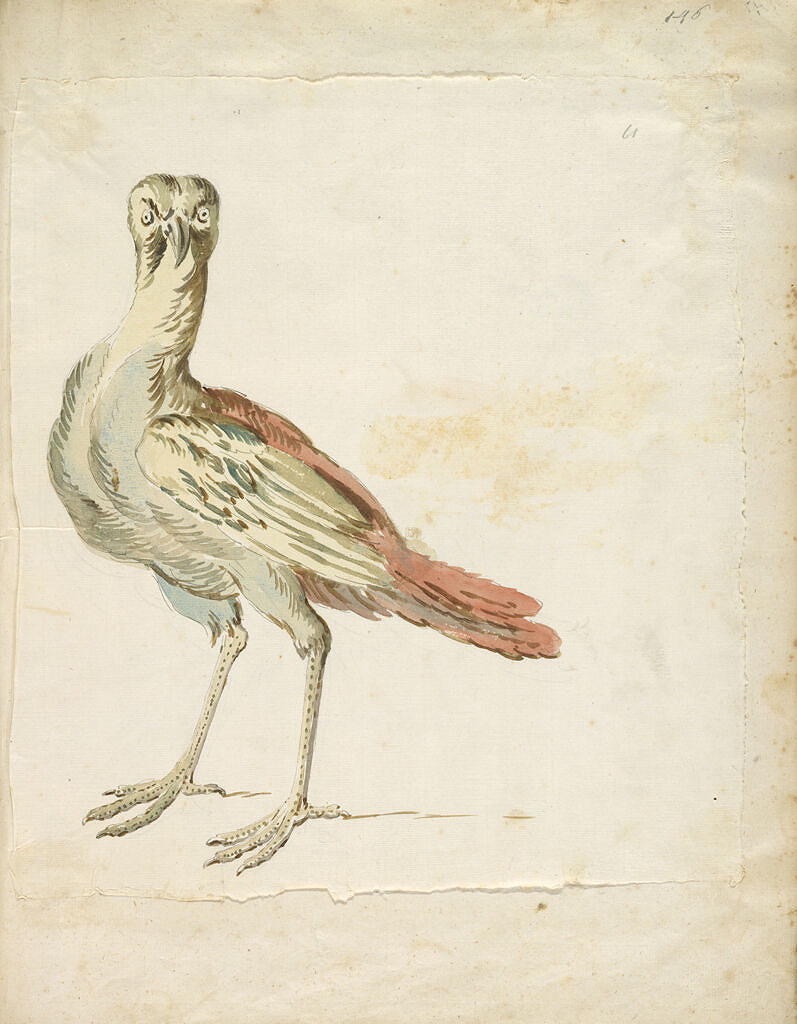
Jean-Baptiste Oudry:
Quizzical Bird; verso: blank (18th century)
"You might not ever be the master of your fate …"
I began my rounds confident that my mission would fail, for I had declared the unlikelihood of success as a part of my mission statement. I complained that the likelihood of finding Giblets here, so near the end of every supply chain, would very likely be tiny. Instead, I insisted upon eventual failure to maintain my haughty worldview that I would be suffering, doing without, nobly bereft. Imagine my surprise when I found my Giblets on my first stop! I'd imagined a course that would take me from shop to shop, allocating a couple of hours to the effort. Immediate success spoiled my whole premise. I guess I should have felt delighted, but I was pissed instead. I came prepared to sacrifice, not succeed. Under those conditions, success sucked!
I had not thought about this very much before this fresh experience.
Giblets
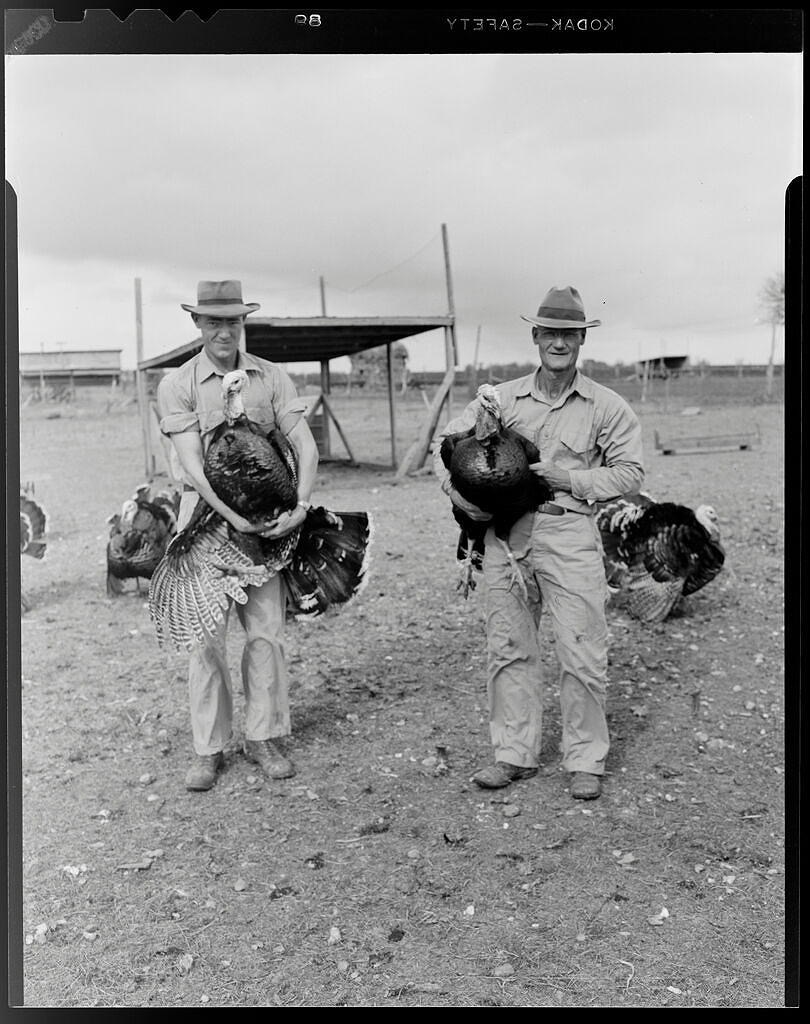
Harry Annas:
Untitled [two men holding turkeys] (c. 1950)
"We're willing to go through Hell to receive that blessing."
The Muse and I start our annual search for Giblets as the holidays approach. When we lived closer to the beginning than the end of this economy's supply chain, our search was never in vain, for supplies of everything seemed more certain. We'd often drive a hundred miles to find some fresh citron, a point of considerable seasonal frustration, but Giblets were common and widely available then. Here, nearer the Center of the Universe but further from the source of much, supplies are such that it seems more a matter of luck than anything when we manage to assemble our seasonal essentials. It would be much simpler if we had ever managed just to lie down and accept the inevitable homogenization of even our most heartfelt celebrations. Had we settled for whatever we quickly found, we would have eliminated our seasonal running around. Still, as entropy continues trying to eradicate all tradition, it's gotten to the point that we take it as a personal challenge to continue our mission unto perdition if necessary. It sometimes seems essential.
I might refer to as Giblets any picky addition anyone deems necessary to properly celebrate.
TheRains

Helen Hyde: In the Rain (1898)
"I might just as well be hibernating."
All the week before, I worked like a man possessed, for word on the street predicted their arrival. There would be the time before and then the time after, and I had work to complete before the time before ended. I admit that mine was a bogus alarm, for nothing would be won or lost whether or not I successfully prepared. I sometimes construct phony deadlines to goose myself into action. I suppose everyone does. Still, my concern seems real. I drive myself. I exceed my capacities and work through my lunch, exhausting myself as if I was making a difference—an as if that seems to work regardless of whether that difference matters. I cleared the yard of leaves before TheRains arrived, satisfying myself and maybe saving some additional effort. A soggy leaf pile, the approximate volume of a Volkswagen bus, hugs the curb out front. It seems like the largest on the block, a point of considerable pride for me and my underlying bogosity.
In my youth, I often constructed deadlines for myself.
Leavfing

Karl Gustav von Amling: Autumn (1698)
" … really looking like home."
I harvest a prodigious crop of leaves each autumn. I take great pride in scraping my yard bare before the snow starts falling and in time for the final municipal leaf collection. I think of this work as a civic responsibility, but I actually do it for myself, for no other activity provides the opportunity to practice one of my minor masteries. I'm very good at raking leaves. Leaf raking can be a frustrating business, for they're surprisingly heavy, and even when they fall light and airy, they cannot be meaningfully condensed and must be removed in tiny stages. A tarpload of wet leaves weighs hundreds of pounds and feels like dragging a carcass across the lawn. A steady pace succeeds where brute force fails. Leave-taking tries patience.
It's chess played on a grander scale, requiring strategy and tenacity in more or less equal measure.
Writing Summary For The Week Ending 11/16/2023
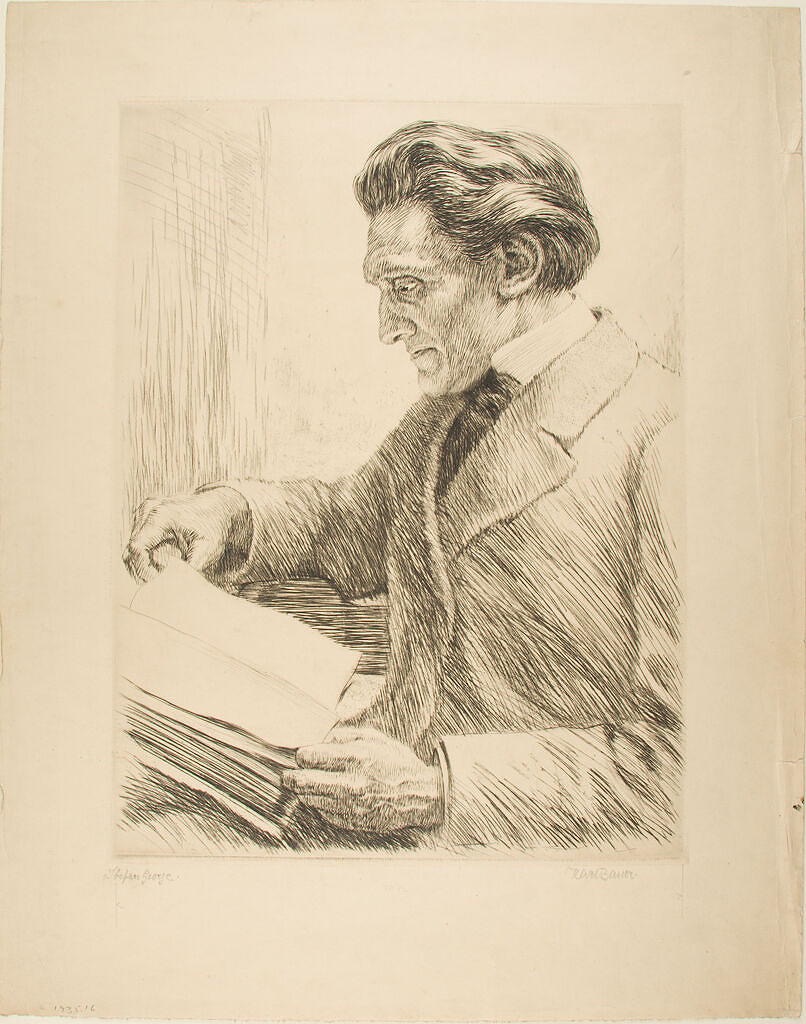
Karl Bauer:
Portrait of the Writer Stefan George
(19th-20th century)
When It Made Me Special, I Was Less For It
I once worked in a place I had to commute to by airplane. My work week involved predawn departures and late evening arrivals with a corporate apartment where I could never remember whether the refrigerator needed milk. I spread myself thinly then, continually leaving, saying goodbye more than I ever said, "Hi!" I learned to live alone. I almost became self-reliant but failed the exit exam. I often felt empty-handed, dependent upon resources I'd left on the other end of my commute. Traveling now dredges up those memories of when it mattered to me that I got upgraded when I'd accumulated more frequent flier miles than Croesus ever did, when I’d garnered recognition. Now, I'm relegated to the last boarding group, hopeful to be the last one on board. I'm assigned the window seat without a window or the last row, where the seats can't recline. I hope for a fussy baby nearby. I never reclined my seatback, always wary of inconveniencing anyone behind me, even if the person seated before me wasn't so thoughtful. I travel to remember why I stay home. I see it as a necessary evil, a means to another end, a mere bookend. When it made me special, I was less for it.
FinishedSketches
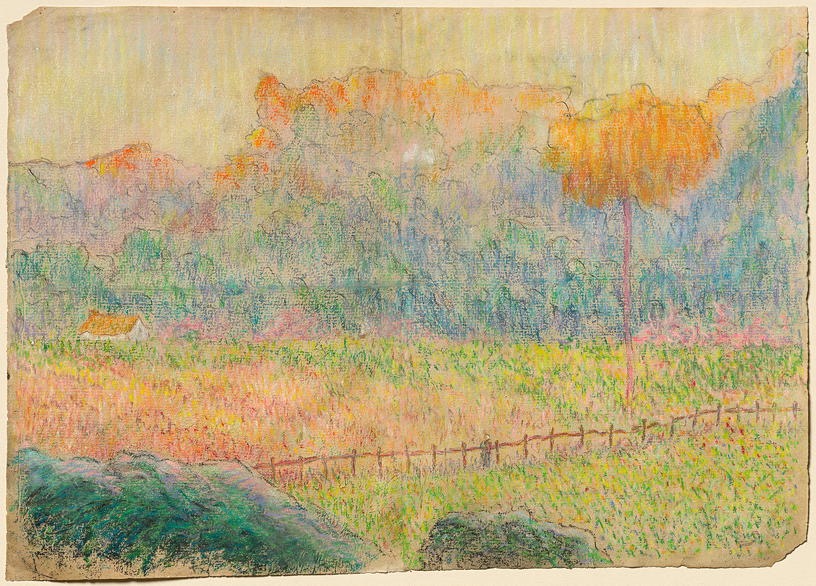
Claude-Emile Schuffenecker:
Study for "Landscape with Figure and Houses" (c. 1891)
" … precisely what she's so confidently projected …"
The Muse figures that, based upon remaining ballots and her win rate so far, once the final ballot count finishes, she will have garnered 8,126 votes, precisely the number she projected she'd need to win before she even began her campaign.
In April, The Muse roused me from whatever more critical activity I was doing to sequester me in the largely unused front upstairs room.
SeparationDance

Artist unknown: The Dancing Fox (1766)
"By this time tomorrow …"
By the final day of an excursion, the new has worn off. Discovery, which dominated the first days, no longer rules. We know how to get from here to everywhere. We've stumbled upon enough to fully satisfy our objectives yet we still have a day to fill. We've grown listless, muscles remembering the first day's exuberance. We're sanguine, almost indifferent. We barely manage to feed ourselves.
We fill in with the remaining items we promised ourselves we'd see, but these were never our primary purpose, and they only partially satisfied.
Glimpsing
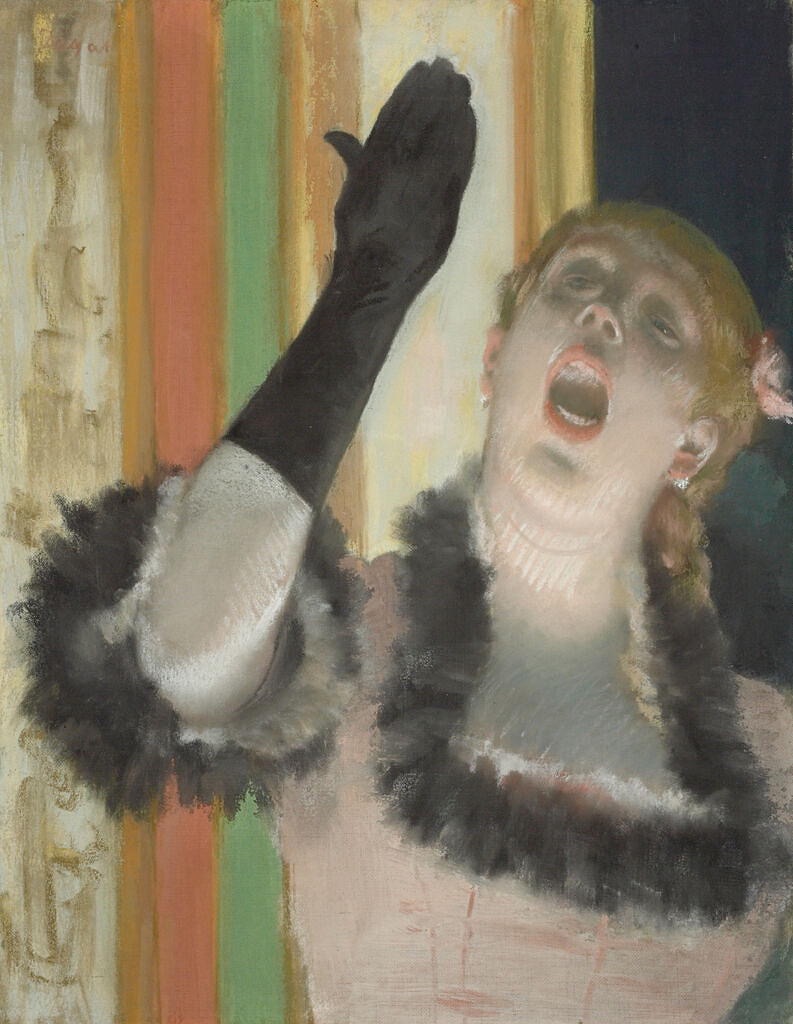
Hilaire-Germain-Edgar Degas:
Singer with a Glove (c. 1878)
" … what should I make of that?"
Gurus insist that emptying the mind encourages these experiences, though I, who've never once managed to quiet my chattering monkeys, notice perhaps more than my fair share. You know what I'm speaking of here: the Glimpsing of the extraordinary lurking within the otherwise most ordinary situation. A wrinkle in space or time impresses upon your consciousness, producing a glimpse of the profound when you had no intention of stumbling into any such encumbrance there. You were just going about your ordinary business when the infinite intruded, when beauty or profound truth or the eternal dropped in and left you breathless. Some of us experience this sensation more than others, or so we all seem to believe, though not one possesses any factual basis to hold this conviction. It might be that we're all constantly Glimpsing, that we need no special training to encourage it other than perhaps to remember to pay attention, though failing to pay attention seems to encourage it, too.
Traveling tends to increase the number of Glimpsing events, perhaps because, out of ordinary circumstances, more things just qualify as eye-catching, as unusual enough to attract this sort of attention.
Museuming
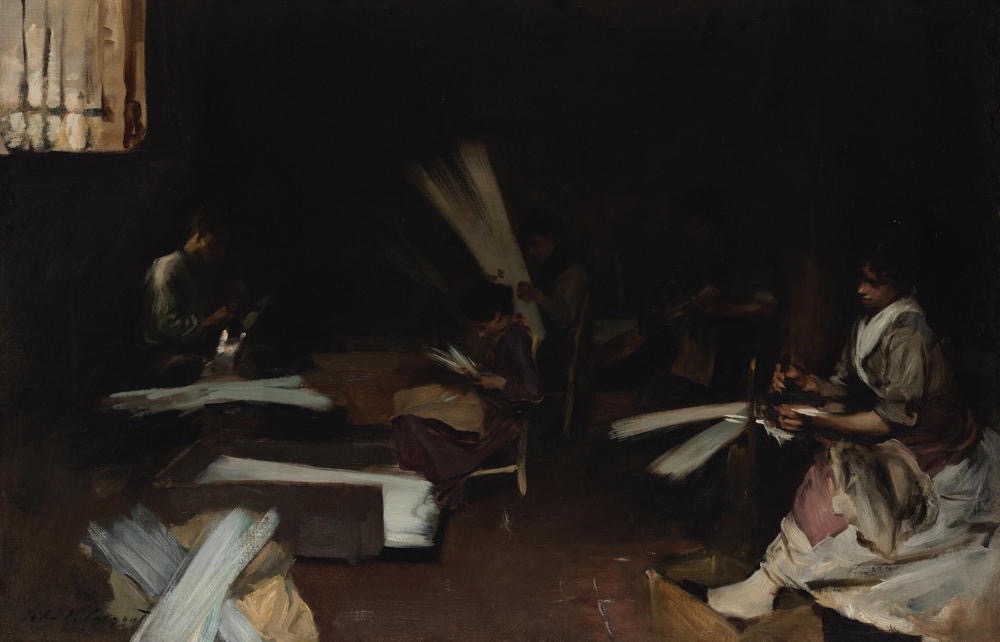
John Singer Sargent:
Venetian Glass Workers (1880–82)
" … none of them the one the artist might have intended."
As The Muse and I waited to board our flight out of The Valley Near The Center Of The Universe, I used that idle time to check messages. Like you, I maintain a tenuous relationship with my iPhone. I utterly rely upon it while it continually disappoints my expectations. I often fail to receive notice upon receipt of a text message, so I usually go for days before discovering that I received one. People have come to use texting more often than calling, which means that attempts to contact me almost always fail to reach me at first. The worst-case scenario involves a real emergency where the informing party texts me. A week or so later, I might saunter into my Messages app to find a smoldering ember remaining from some three-alarm fire.
This text had come early the previous morning, informing me that my new lenses were in.
SmallestTown
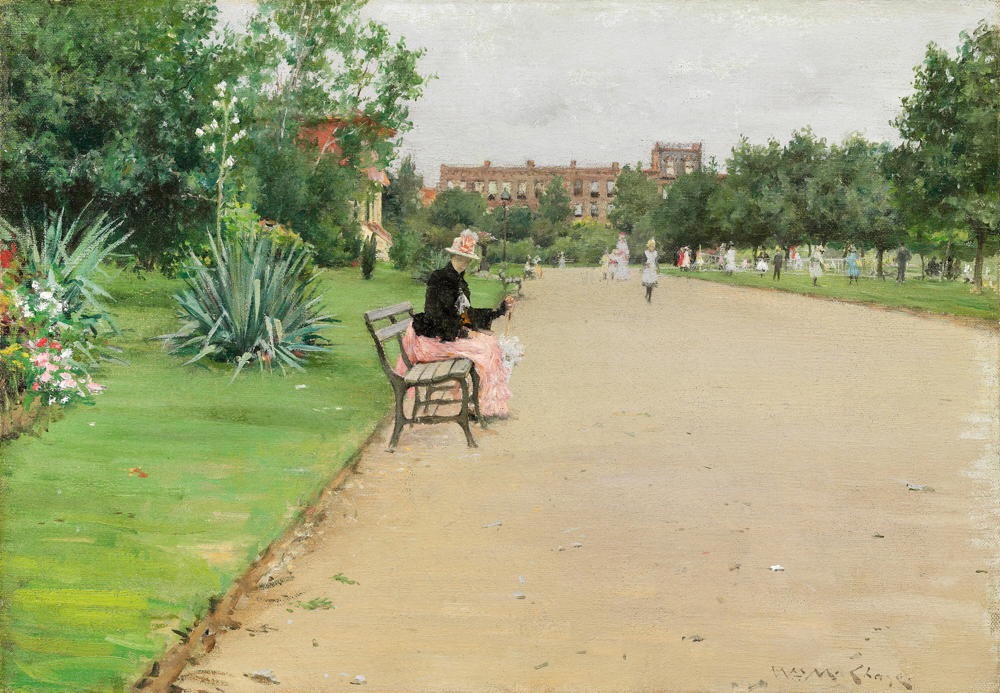
William Merritt Chase: A City Park (c. 1887)
"It sure feels like home."
Though I hail from a small city, I do not even pretend to represent the interests of small towns or their people, for mine's not the smallest or the largest town in that category. No, the SmallestTown I've ever visited must be New York City, for it represents everything a small town or city should properly embody. I know it does appear to exhibit a somewhat inhibiting size, which would seem, at first glance, to disqualify it as if not a smallish place, then certainly as the smallest. Yet I insist New York City is the perfect example of the SmallestTown I've so far found. I won't pretend that other contenders might exist, but I will insist that I stopped searching after visiting here and discovered perhaps its most closely held secret: its size.
You see, this place is not a single place but a series of tightly nested and uncontested neighborhoods, each featuring remarkably few people, each of whom understands their place.
Reveling
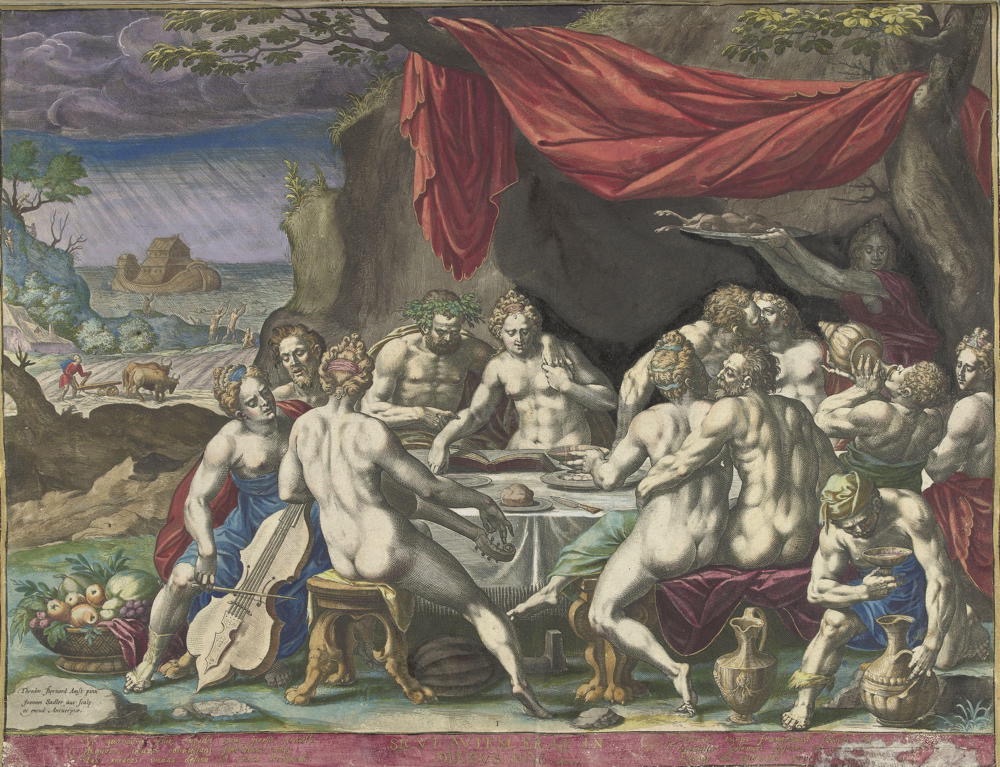
Johann Sadeler: De mensheid voor de zondvloed
[Humanity before the flood] (1581 - 1585)
"Excess is not synonymous with success …"
In New York City, to celebrate The Muse's campaign victory, we're faced with how we might go about Reveling in the success. The traditional wine, women, and song won't work with The Muse involved, so we settle for wine, dinner, and song. The musicals we're scheduled to see should adequately cover the song part of our Reveling. We discover that we've booked a hotel on the fabled Tin Pan Alley, an auspicious sign if ever I've encountered one—the wine we handle with a decent Aglianico, purchased in a lovely little Italian bistro. We're seated in a basement annex, perfectly out of the usual distracting noise and bustle, with a waitress whose accent I cannot begin to wade through. Fortunately, The Muse makes sense of her sentences, and we settle in for a celebratory feast.
After a day of fasting on the cross-country flight, we're famished.
Writing Summary For The Week Ending 11/09/2023
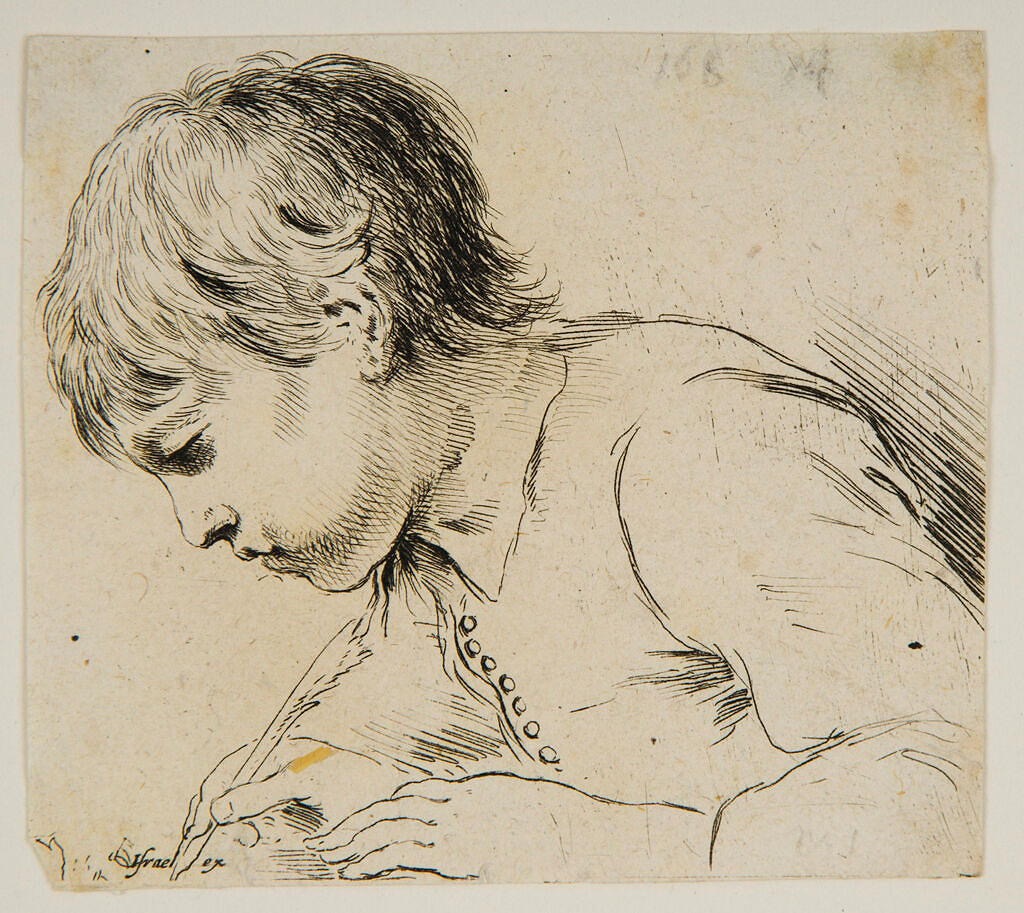
Stefano Della Bella: Boy Writing (17th century)
I Wonder If I Ever Leave
I should be packing, but here I am writing again. The Muse and I intend to spend a few days away to kickstart the recovery from six dog months of campaigning. The transitions seem the most troublesome, for they offer little to distract one from all that's suddenly missing. The routine no longer needed, and no replacement routine ready yet; we figure we'll be better off far away from our usual surroundings, wandering. I continue to hold my precious patterns, writing rather than packing, condensing departure into a frantic few minutes. I expect to forget something important, but not my writing, my constant companion, my one abiding obligation. I do not know what I would be doing if I was not describing something. I take no vacations from my vocation. I take my obligations with me when I go. I wonder if I ever leave.
Palning
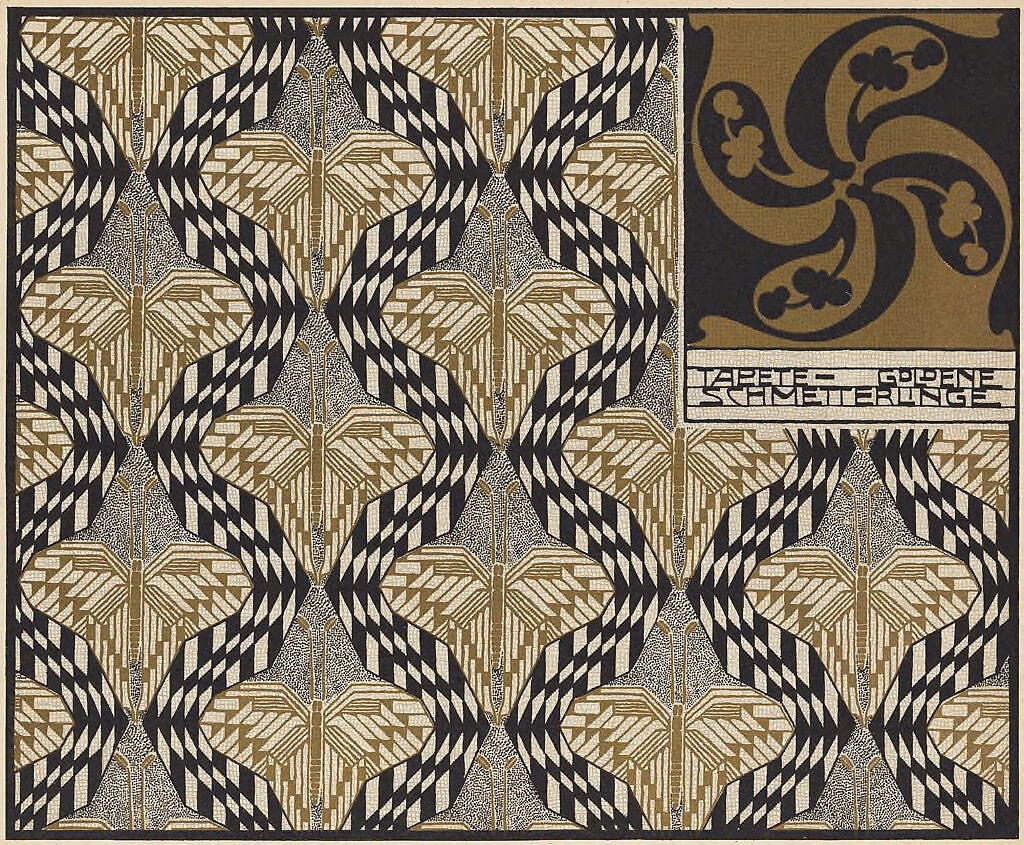
Koloman Moser: "Golden Butterflies" wallpaper design
from the portfolio "Surface Decoration" (1902)
"… better to disappoint ourselves by sequencing our desires …"
Planning for a few days’ respite in New York City, I again encounter my embarrassing relationship with planning. Though I spent the bulk of my working life actively engaged in planning, I have always been lousy at it. I might have been attracted to the activity merely because I performed it so poorly. I might have mistakenly believed practice would eventually resolve this increasingly glaring shortcoming, but it hasn't. I worked my way up the career ladder instead, moving on from participating in creating plans into teaching others how to do what I had clearly never mastered. I might have even risen to the peak of my ineptness there, embodying every element of the infamous Peter Principle, rising to inhabit the pinnacle of my incompetence. My heritage and legacy stand there, a testament to man's inherent inhumanity, how one might embrace their inability rather than master something for themselves.
This might be the most human trick, the call of desire muffling reasoning.
ComingUpRoses

Koloman (Kolo) Moser: Woman’s Head with Roses (1899)
"That sweet scent sure seems familiar …"
In the 1959 Broadway musical Gypsy, songwriter Jule Styne and lyricist Stephen Sondheim created a song they intended to sound as if it had been a common idiom for ages. They succeeded with a repurposed melody and Sondheim's remarkable turn of the phrase, creating what would become star Ethel Merman's signature song, Everything's Coming Up Roses. When first introduced to the tune, show director Jerome Robbins asked, "Everything's coming up Rose's what?" Fortunately, Sondheim accurately predicted that nobody would be asking that question after hearing the song, which has since become one of the standard soundtracks accompanying success, so when The Muse appeared to win her election for Port Commissioner, this melody popped into my head and hasn't yet left. It's become the earworm for what promises to be a new age here.
Some days, everything shifts. Something of actual consequence happens, and whatever remnants of any odd old status quo cannot make the shift.
JudgementDay
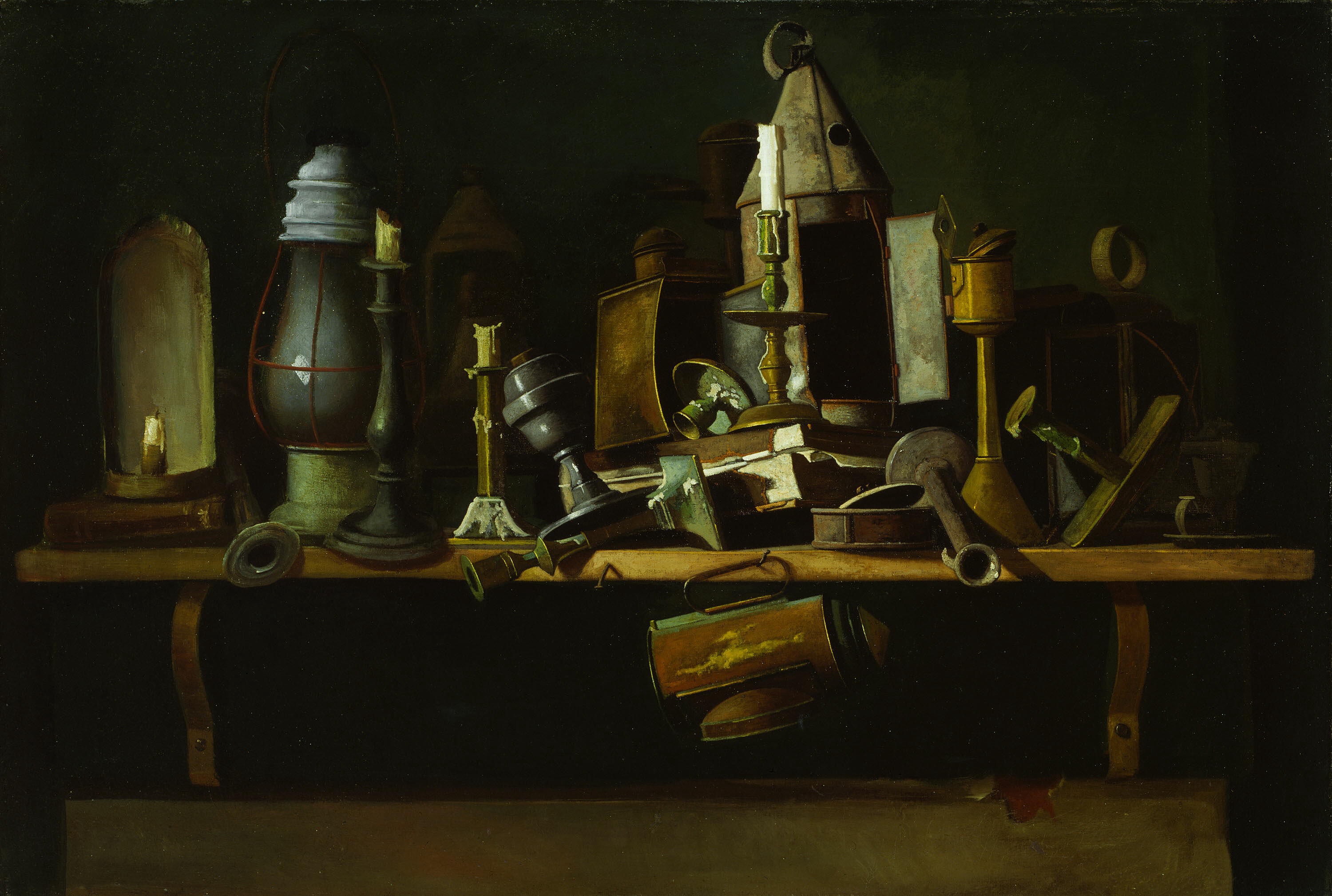
John F. Peto: Lights of Other Days (1906)
"That difference will not be undone."
Six months ago, The Muse began her campaign by researching histories of local campaigns to discover what had gone wrong and right so that she might focus upon elements likely to help her get elected. She feigned disinterest, insisting that she was just weighing the pros and cons to decide, but she had already decided to run. Her only questions were about how to productively pursue that end. She registered as a candidate on the first day registration opened. She rented a post office box, set up a bank account, and set about designing her campaign's look and feel, and while she had help, she decided. She chided me into volunteering as her campaign manager, a role I later renamed Campaign Mismanager, a title that better described my contribution. Please make no mistake: I played the role of placeholder. She managed her own affairs.
There should have been a rule that spouses couldn't serve in any formal role on any campaign because a couple's peccadillos couldn't help but go on public display whenever that occurred.
Oven

Jan Joris van Vliet: Baker (1635)
" … the answer approaches the infinite."
I never was anybody's baker. Oh, I have proven capable of roasting the odd chicken at three hundred fifty degrees for an hour and slowly braising a pan of pork cheeks on a bed of seasonal veg for longer, but the more intricate recipes I leave to The Muse. Bread has always been beyond me, for instance. I've convinced myself that my shortcoming stems from my dyscalculia, my inherent inability to perform specific calculations, for an Oven operates on a complicated table of equivalents, variables requiring understanding to balance. To complicate this calculus further, The Muse bought a Combi Oven Christmas before last. This Oven is an Oven on steroids. It adds an additional heat source (top, bottom, and back), steam, and a fan to create conditions utterly unanticipatable by this man. If I fly blind operating a standard Oven, I fly comatose with this one.
I ironically call this Oven my EZBake Oven in homage to the light bulb-operated one my sisters had when we were kids.
DarknessSavingsTime
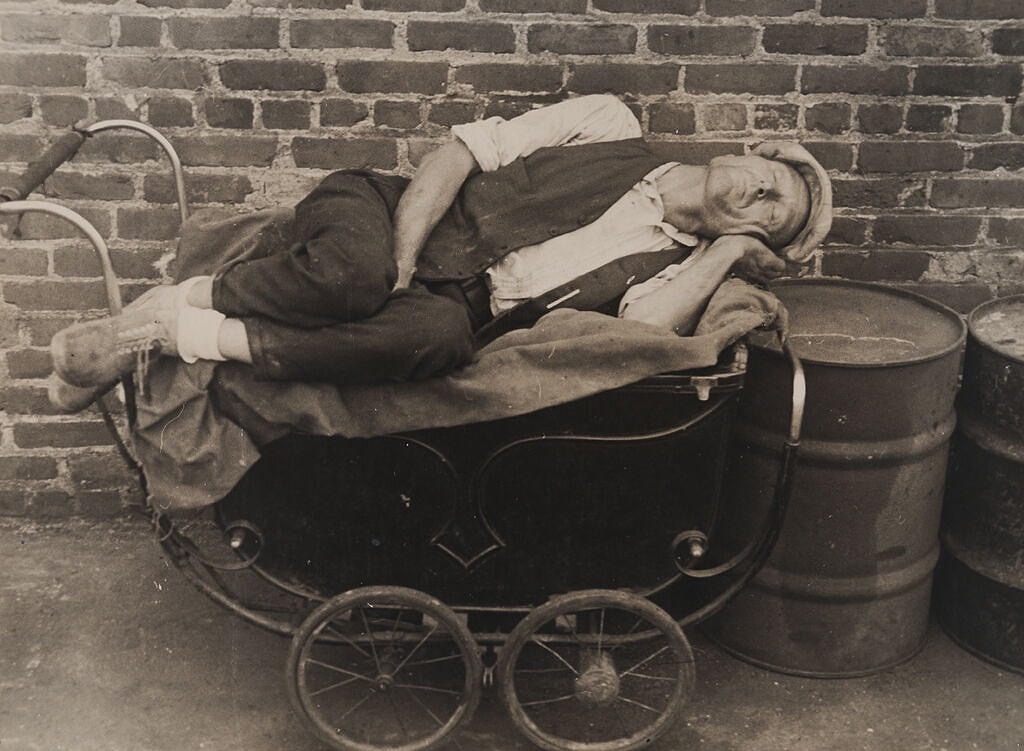
Ben Shahn:
Untitled [Cherry Street, New York City] (1933-1935)
"To not do so seems inhuman."
I am told that I have sometimes accepted change as if I were a mature adult. Not often, mind you, or necessarily memorably, but I apparently have some track record. Still, nobody's surprised when I react to some change by kicking and screaming; obviously, I'm not always able to help myself. The progress of humankind seems especially ragged sometimes, so it's little surprise that my maturity fades in and out accordingly. I, for instance, have always considered Daylight Savings Time to be humankind's finest invention, mainly because it had no moving parts yet carried a profound positive influence. It required compliance, nothing more, to work its magic, and it managed to achieve that compliance without resorting to marshaling tactics. People obeyed without more than minor grumbling. Everyone benefitted!
So it's understandable when backsliding brings out the worst in me.
Between
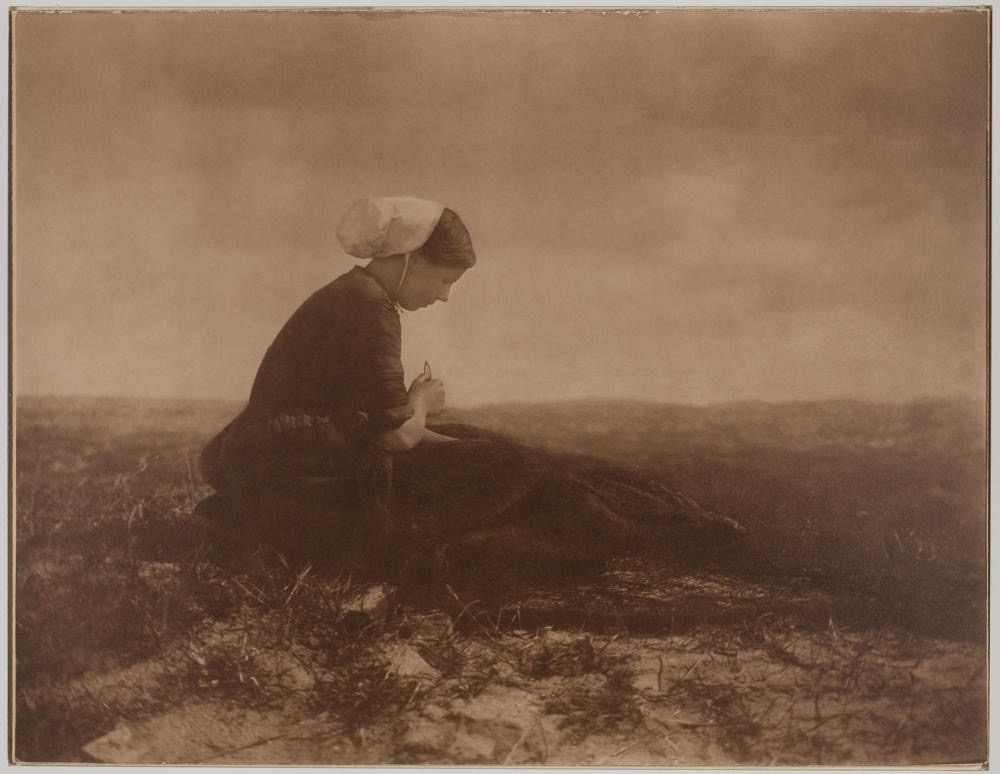
Alfred Stieglitz: The Net Mender (1894)
" … when all finally seems right enough with this world."
I find myself Between passions. The Muse's campaign all but over, my contribution finished, and my next passion pending; I feel at more or less loose ends. I presently have no particular end in mind. Not even our impending excursion to New York City interests this homebody. I move listlessly, as if little matters, probably because very little seems to matter at this moment. I understand that I'm supposed to be actively engaging, appreciating my good health while I still have it, flaunting my lack of physical complaints. I have no complaints. Disappointments haven't tainted my outlook. I've harbored no grudges. I've not been wronged. Nor have I taken it upon myself to change this world, however much it might scream for someone's intervention. Archimedes taught me everything I understand about leverage, and I feel certain there's no fulcrum sufficient to change even a willing world, and ours doesn't appear to be all that willing to me.
I rise at my usual time but lengthen my preparation.
Writing Summary For The Week Ending 11/02/2023

Dodge Macknight: A Narrow Way, Montpezat (1885)
More Complex … Not In Need Of Further Simplification
I am increasingly convinced that none of us understand what's happening around us. We unknowingly speculate. The purpose of civilization sometimes seems to protect us from knowing the purpose of our civilization, for it seems in odd moments to be conspiring against us, against us ever understanding our purpose here. It insists, for instance, that we focus out there, as if out there might hold the secrets to ourselves. We, in turn, might counter with introspection, insisting that our essence might be better defined in absentia of our context. In practice, we might be both-and animals, neither feral nor conditioned, neither learned nor especially ignorant. These transition weeks tend to highlight these inherent contradictions. We aspire to be able to declare some simple definitions. We tend to eventually learn that we were both more complex than that and certainly not in need of further simplification.
Change

Dodge Macknight: Rain (19th-20th century)
"The living actively practice forgetfulness …"
"And if you achieved that, how would you know?" My consulting clients always struggled with this question, for wanting seems an inherently subjective experience while describing aches for more objective specificity. A raft of difficulties always emerged whenever I asked this question, and, indeed, I never knew how to answer it, either, for it teeters on the edge of Fundamentally Undecidable. It might not matter how anyone answers. It mattered more that someone struggled to respond, for a deeper understanding can't hardly help but come from the struggle to answer. I asked the question to encourage insight more than a definitive answer, anyway. Rarely would any client produce an answer they found completely satisfying. Inducing that dissatisfaction might have always been my deeper purpose in asking, for there are few things worse than a cock-sure client who believes that they'll know change when they see it. We might all be much better off accepting inherent ambiguity than precisely knowing. Few future things benefit from precise proposals.
I knew, or at least strongly suspected, that we would not need much specification before beginning.
Effolution
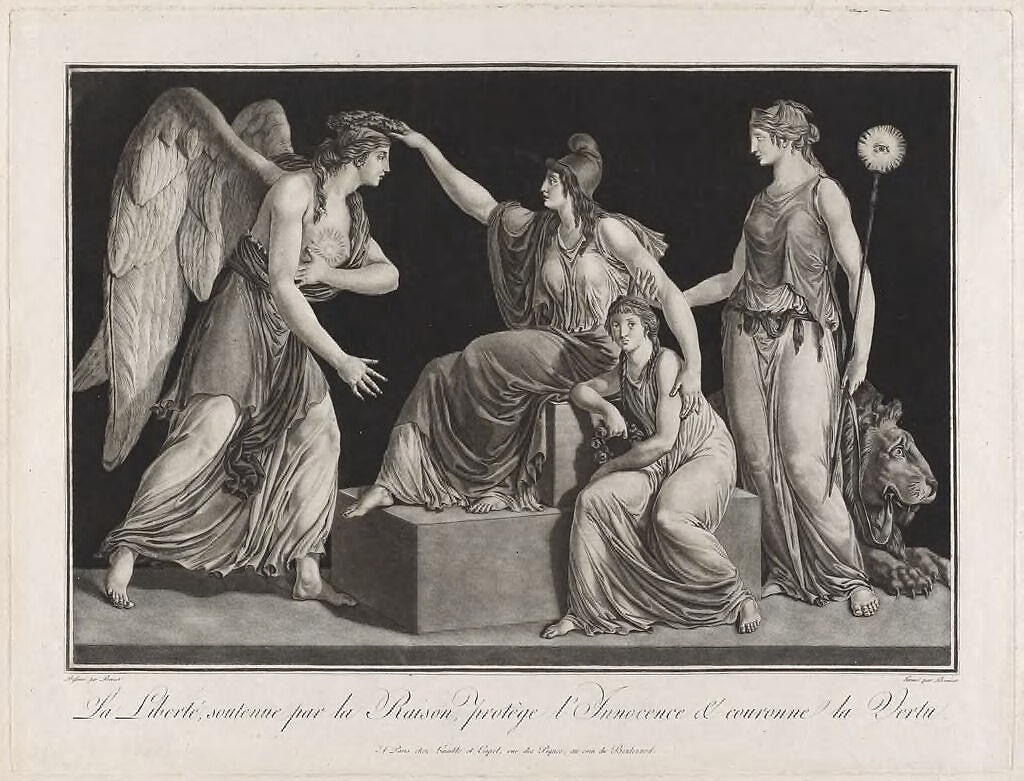
François Bernier:
La Liberté, soutenue par la Raison,
protège l’Innocence et couronne la Vertu
[Liberty, Supported by Reason,
Protects Innocence and Crowns Virtue]
(1793)
" … just buy a replacement whenever their dreams need repair."
This culture believes in positive progression, perhaps above all else. Our future has always been destined to be better than our parents. Our sons will be better off than we ever were. Whether through evolution, revolution, or simple propulsion, we would move ever forward, ever onward, upward, and away. While this notion might represent reality across decades, generations, or centuries, the actual on-the-ground experience of these -volutions tends to be much messier than expected. We didn't, for instance, evolve from Neanderthal to human in a single generation. Many trials and inevitable errors emerged. I suspect this shift involved all of the usual struggles our cerebral models tend to ignore. We crawl forward more than march and might move backward on the way. Straight and narrow paths exclusively belong to myths.
As a kid, I was fed a steady diet of myth.
WryDing
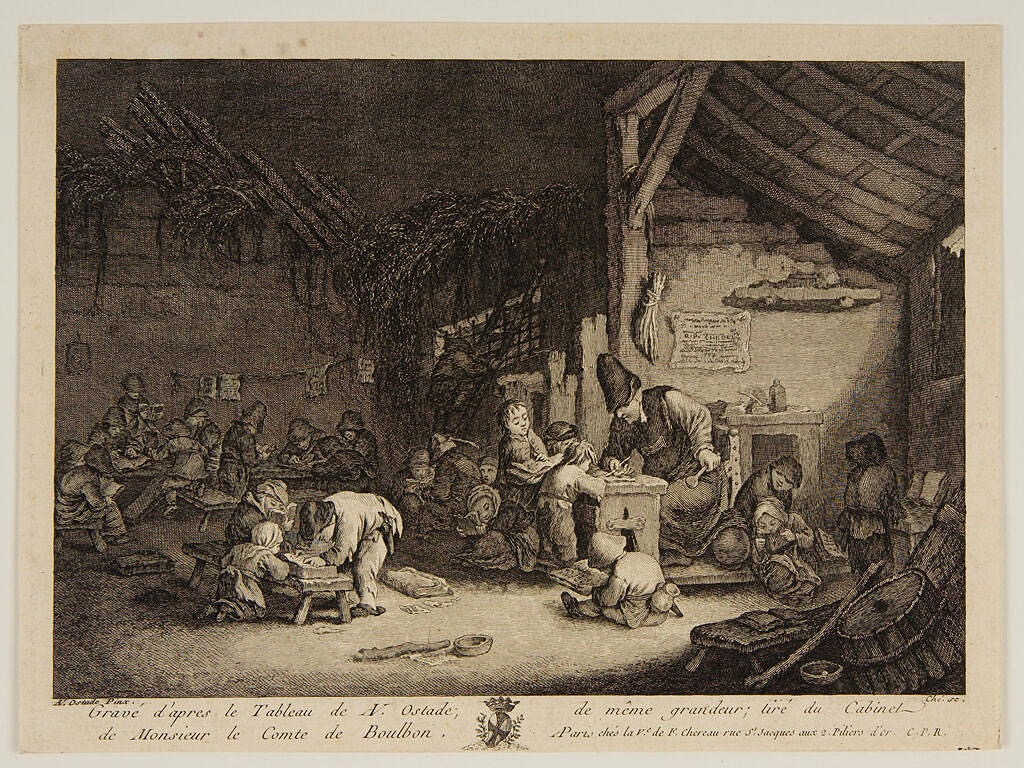
Pierre-Quentin Chedel:
Le Maître d'école [Writing School ] (18th century)
"That's how I use the English language."
I cannot rightfully claim to feel proud of my profession. Indeed, I cannot even rightfully proclaim to have a profession. I fancy myself a writer. I trade in writing or WryDing, as I might more accurately describe it. It can't qualify as a profession because it has never really amounted to anything. It's never translated into something even vaguely resembling a living. Over my lifetime, my WryDing has produced a deficit, a record kept exclusively in red ink, revenue never once exceeding expenses. Were it a business, it would have been shuttered ages ago, and its proprietor would have shuffled off to some other field or wisely retired. The usual rules for comportment, investment strategies, and civil niceties don't seem to apply. A terribly narrow set of general guidelines apply instead: Keep WryDing.
Should a day slip by without at least a little transcribing, identity crumbles, for WryDing demands full attention.
SuperImpositioning

Edward Hopper: American Landscape (1920)
"Old campaigners never die …"
A point comes in every political campaign when the election process enters the quantum realm, most prominently during that excruciatingly brief period when both candidates have won. After the mail-in ballots drop but before votes are counted, Schrödinger manages the ballot box. That box holds both victory and defeat without definitively disclosing which outcome will ultimately manifest. There's nothing a candidate or an electorate can do to influence an outcome that's already moved out of their hands. The results exist in superposition, both-and rather than either-or. However, by the evening of election day, their quantum state will finally resolve after a frustrating fortnight of SuperImpositioning, the supreme imposition not knowing induces. The Muse has fliers remaining but little means to influence voters now. Many already voted, one way or another, and those that haven't voted become increasingly less influenceable, especially since it's an off-year election featuring only local races. Ballot return rates have historically measured in the low two digits regardless, yielding an unpredictable race.
The die cast but yet to land, out of hand but not yet settled and countable.
HighCrimes
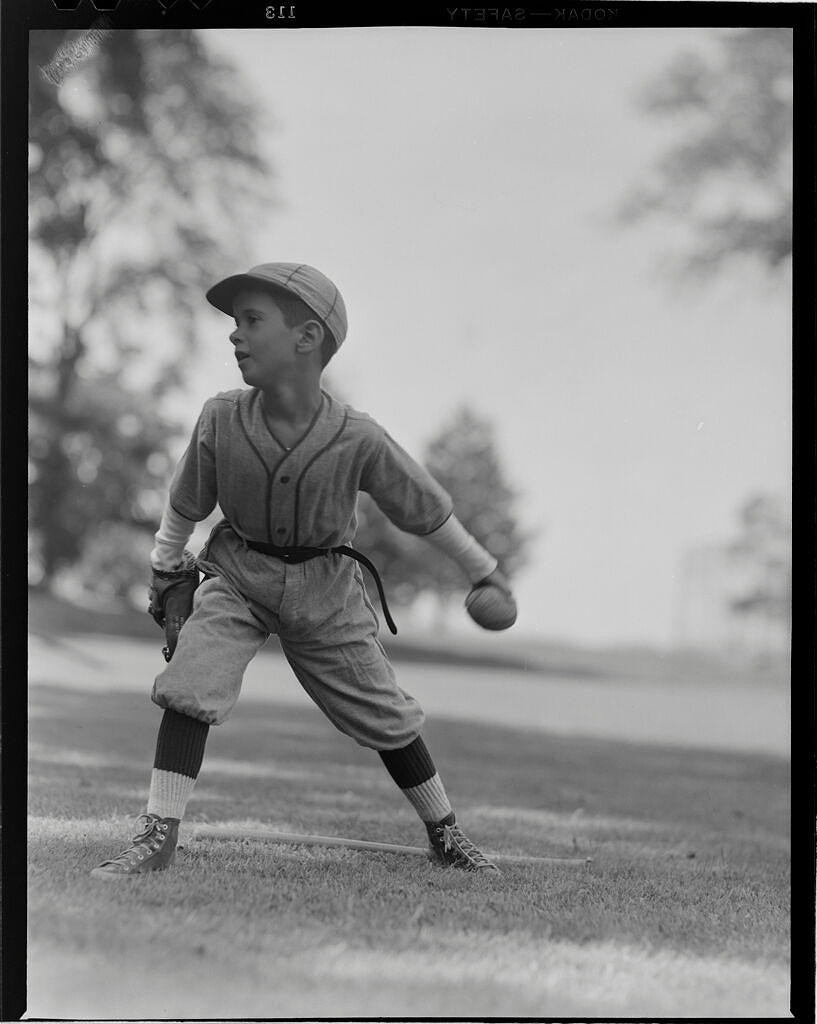
Lucian and Mary Brown:
Untitled [little boy throwing baseball] (c. 1950)
"I do not believe in anything like learning to forget some things."
Premeditation aside, the worst crimes tend to be crimes of inadvertency. One backs into these infractions without malign intentions, often with innocent misconceptions. These crimes seem less committed than incurred. They're usually wrong-place-wrong-time shortfalls, actions that would have never happened save for convergent conditions. We walk on someone else's territory not to trespass but simply in passing. We might not even notice at first. Another might finally clue us in, or we clue ourselves in well after the fact. However we learn about our crime, we might well always remember it. Punishment might become a life-long haunting remembrance of the event, something no amount of penance or forgiveness will ever adequately compensate for committing or erase the accompanying sensations. We wound another by backing our bus over them without noticing.
These sins can never be undone.
OddConvergences
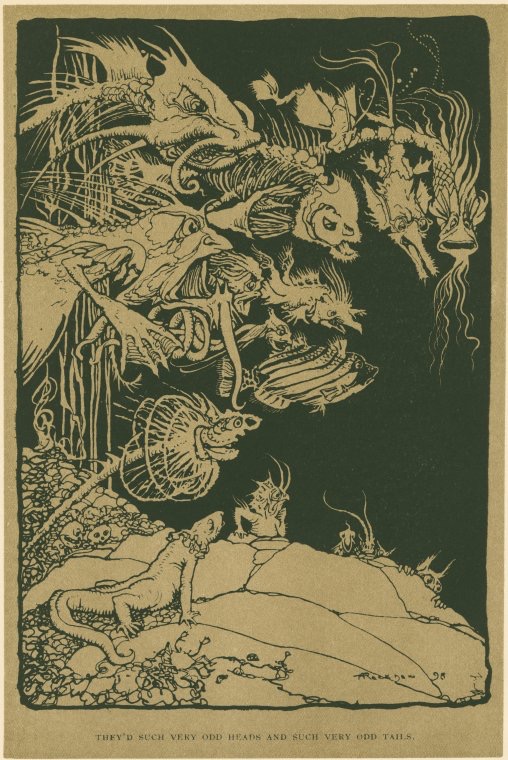
Arthur Rackham:
They'd such very odd heads and such very odd tails.
(1911)
" … just happened to be passing …"
One iron-clad rule I should never disobey pertains to disclosing the content of one of my PureSchmaltz Friday Zoom Chats. I began convening these weekly sessions early in the pandemic and continue them today. I originally designated them as dialogues without specific agenda, so they tend to contain whatever seems to need saying in that moment. I deliberately avoid recording the proceedings because I intend them to be the sort of conversation where you must have been there to understand whatever happened. Not to paint them too awfully mysterious, they feature the usual insightful comments about the weather interspersed with genuine genius. One must pay close attention some weeks to catch the genius, but it always emerges. I leave these sessions with a renewed appreciation of the brilliance lurking within everyday conversation. Something always happens.
To violate my iron-clad rule about my Zoom Chats, one of the participants said precisely that: Something Always Happens, in response to my reflection on my earlier posting, Prabability, where I recounted the story of The Muse discovering that the gentleman seated next to her at a banquet was the nephew of her grade school bus driver, an OddConvergence.
Inanity
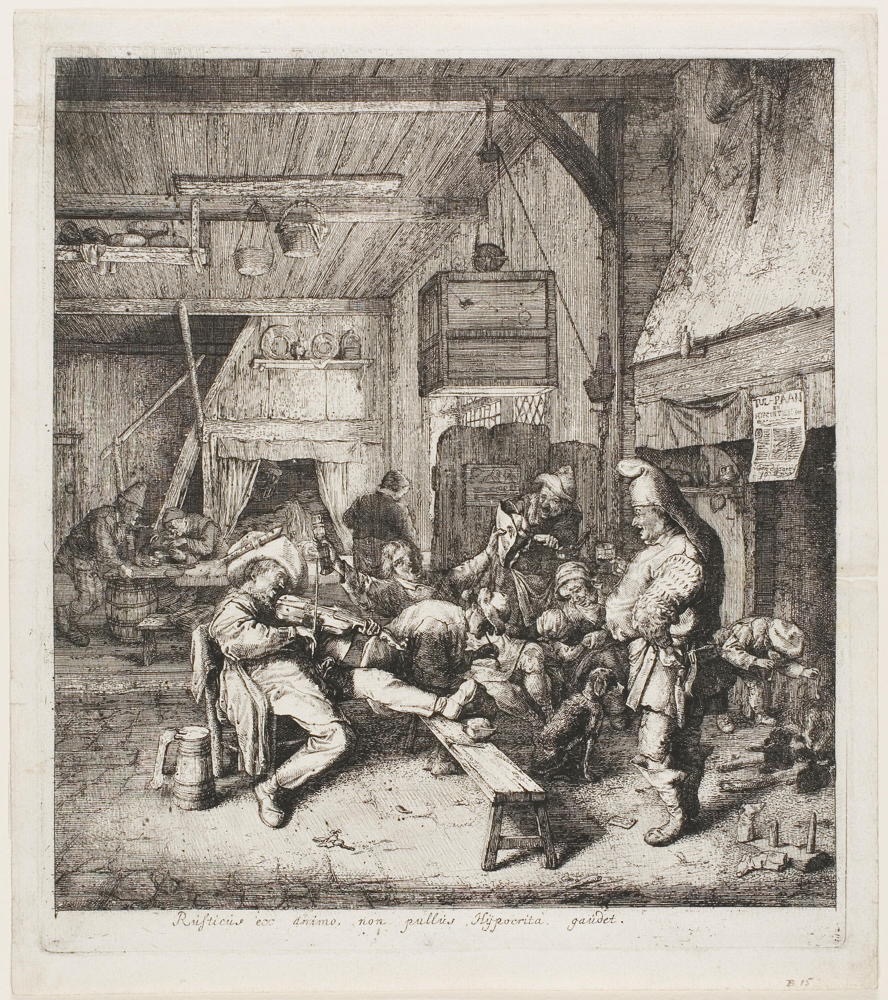
Cornelis Dusart:
Violin Player Seated in the Inn (1685)
" … we washed up on this shore rather than some other."
My work seems either inane, insane, or both, probably both. It exemplifies doing the same thing and expecting different results, for I seem to follow the same damned process whatever I do. Not precisely the same steps, but viewed from a certain distance or altitude, it includes similar stages: from not knowing to finally dispatching, the flow varies little. Sure, the results seem different every time. This story never existed before this moment and will never appear in anything near to this form again. I do not plagiarize from myself, not yet, anyway. However, I can imagine a day when, steadfastly focusing on my rut, I invent an utterly unoriginal story, a mimeographed copy of some earlier one. This could happen, if only due to the similarities in my process.
Creativity turns out to be different from what it promised.
Writing Summary For The Week Ending 10/26/2023
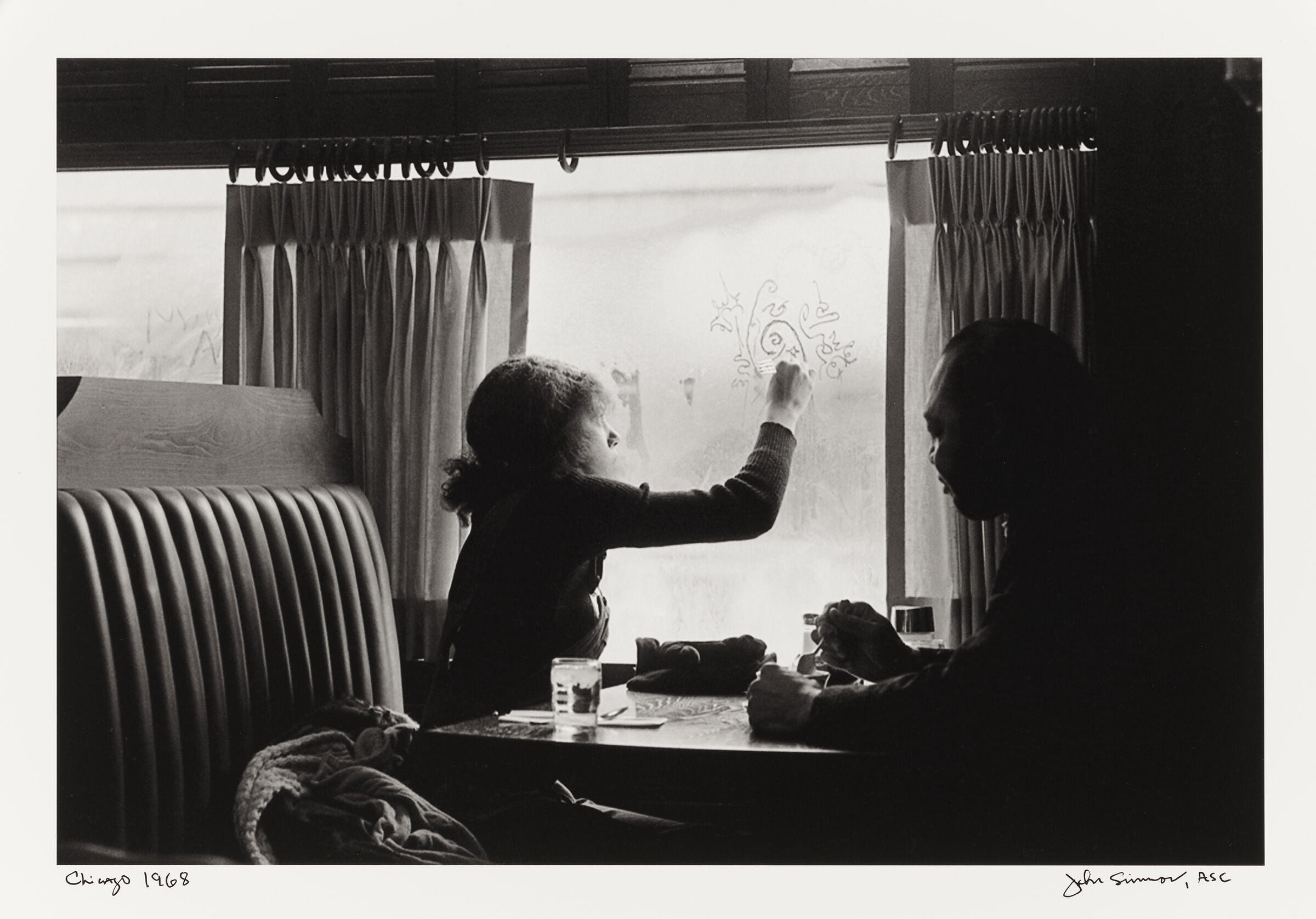
John Simmons: Window Writing, Chicago (1969)
Odds Might Not Matter
At times in my past, I still believed that I might get away with something. I suspected that I was only fooling myself but still engaged as if I might be wrong, that my life might be crafted for a song without hard labor, without undue or undeserved suffering. I found no convenient backdoor to anything, though, because stuff just happens. I'm uncertain if I believe in karma, for I've seen too many innocents visited with undeserved curses. I prefer to believe in a benevolent God, though I suspect she's at best indifferent. I can't not care deeply, though, often more for others than for myself. After almost a lifetime of surprises, I've practically lost the need to succeed. I do not expect my predictions to come true. I don't buy lottery tickets, either. I write for reasons other than pleasing anyone, often even myself. I might write to let an indifferent God know I was here, producing against insurmountable odds. The odds might not matter if I play to achieve something other than winning something. This is, after all, the letting go season.
TheTux
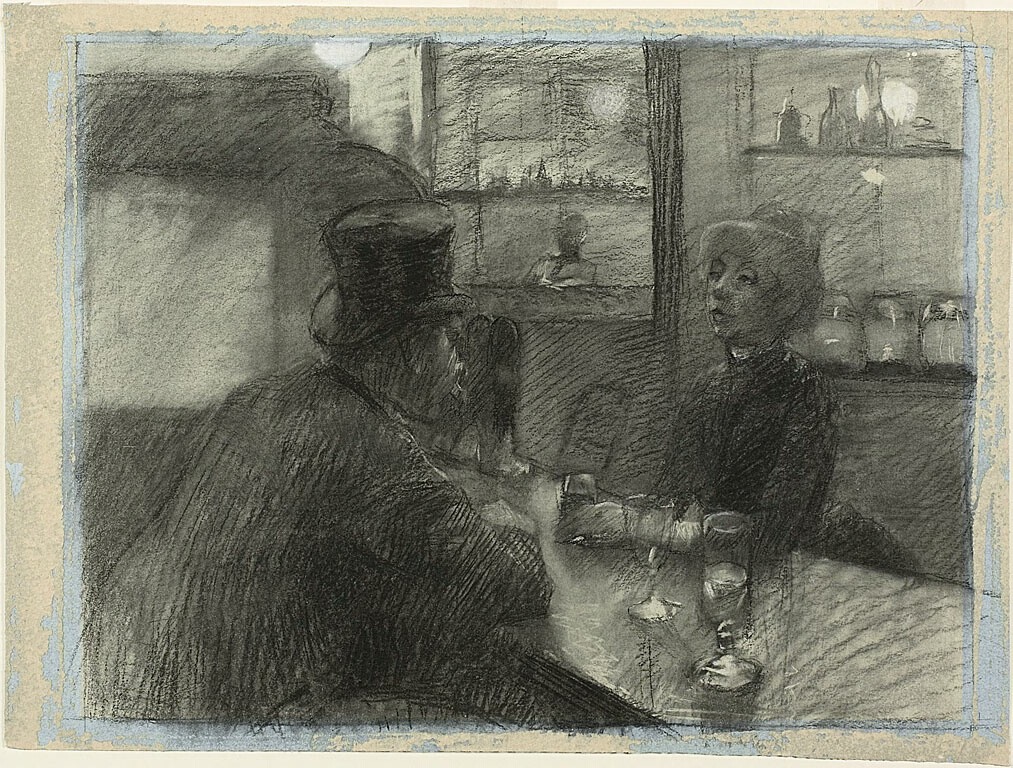
Henri de Toulouse-Lautrec:
Bar of the Café of the rue de Rome (c. 1886)
"The tiny moments in tiny rooms might make all the difference."
The Muse and I are not regulars at any bar and grill, though we almost know our way around that society; she learned at Marskies, a tiny South Dakota bar in the half-horse town she grew up just outside of. I never learned but am still learning, entering every bar wary and uncertain of the rules of engagement. I slink around half-invisible as if my fake ID teetered on the edge of discovery and I was tarnishing my reputation. In some places, especially tiny towns, the bar might be the only retail establishment in the city. So it is with TheTux, a social club center of the universe place in tiny Prescott, Washington, population 377. No tuxedo has likely ever graced this space. This town represents a considerable portion of the county, though. Our canny candidate understood she dared not avoid it, so she asked Doug, the local Democratic Precinct Committee Officer, if he might introduce her. He invited us to an evening at TheTux, specifically Wednesday Taco Night, which qualifies as a weekly local celebration.
The tacos are crap, two bucks a pop, and well worth, at best, a quarter of that.
EmptyAir
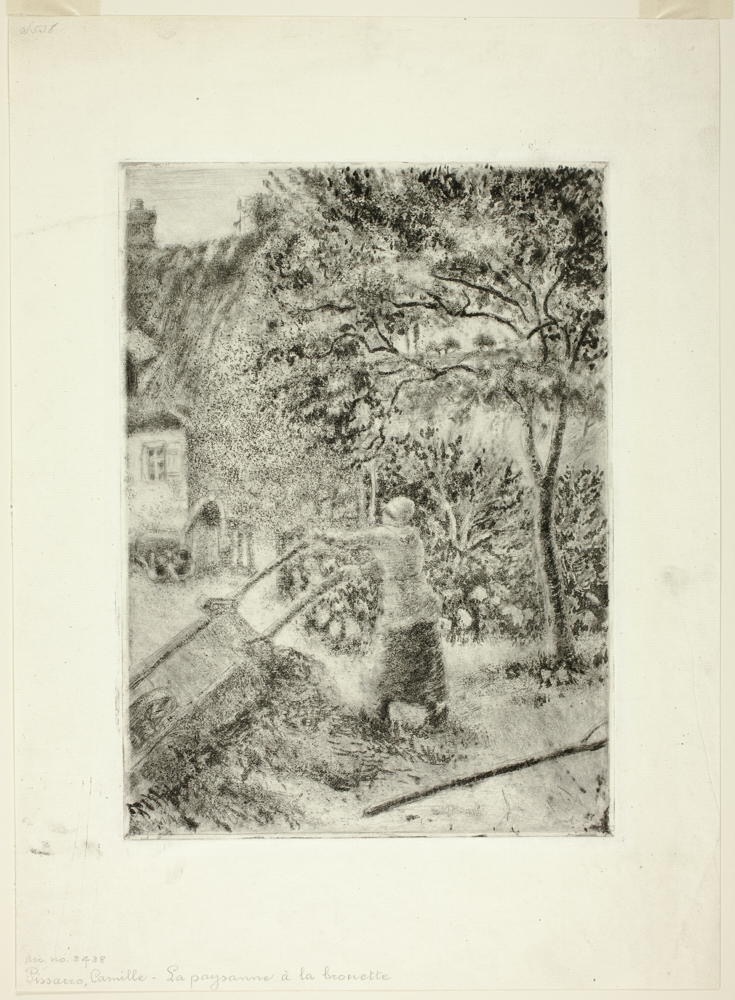
Camille Pissarro:
Woman Emptying a Wheelbarrow (1880)
"The hunter dreams of tomorrow's hunt …"
I had been steadily canvassing through a difficult precinct—streets with gravel verges instead of sidewalks, long distances between porches—and settling into the by-then familiar sweaty collar and yoke when The Muse called. She'd finished her video call and was ready to meet up with me to finish canvassing this latest Turf. I disclosed my location and predicted where I'd be fifteen minutes later before continuing to drop campaign literature on those increasingly rural porches. She arrived on time and parked in a turnout so we could confer. As usual, the software misbehaved, complicating our synching up. I proposed that she drive around to those places I'd passed up because the houses were too far from the main road, and she couldn't seem to find which houses I referred to. In frustration, I pleaded with her to at least deliver a sign to one homeowner who'd requested one. She needed literature I couldn't spare, so I passed the key to the other car where I'd left my excess. She drove away in some frustration, and I continued dropping fliers.
A mile later, she showed up again, explaining that her mailing had hit mailboxes that morning, so that canvassing might be too much information that day.
ButtoningDown
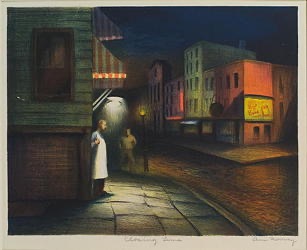
Ann Nooney: Closing time (1937-1942)
"I wonder if he'll ever discover the secret."
Eventually, every inevitable comes, every denial fails, and time slinks on. Even the once-endless Summer, gone to Autumn over a month ago, also ends. The first frost arrives with the news of the first frost's arrival, for it sucks the final sense that we might make it to Thanksgiving without regrets, without forfeiting anything. The slow Summer builds, gardens finally grown to blossom and fruit still look as though they might last forever. Some neighbors pre-emptively pull their impatiens, geraniums, and petunias, assassinating offspring to deny the assassin the satisfaction of freezing them out. I'll collect our corpses once they're well-wilted and ready for composting.
The Muse pulled her summer garden, cucumbers, tomatoes, and peppers, picked over and uprooted.
Insensibility

Designed and executed by Florence Elizabeth Marvin:
Crazy Quilt with Animals (1886)
" … praying for deliverance."
We each possess gifts more or less unique to us. None of us were produced with cookie cutters. We're each different and different in non-obvious ways. We look deceptively similar, which can confuse even the most patient and otherwise understanding, but we seem to be most deceptively dissimilar. Diversity, lately the hobgoblin of conservative commentators, might be inescapable and uniformity unlikely regardless of how anyone might otherwise insist. We are different.
Try to design a one-size-fits-all experience, and you'll most likely fail.
Prabability
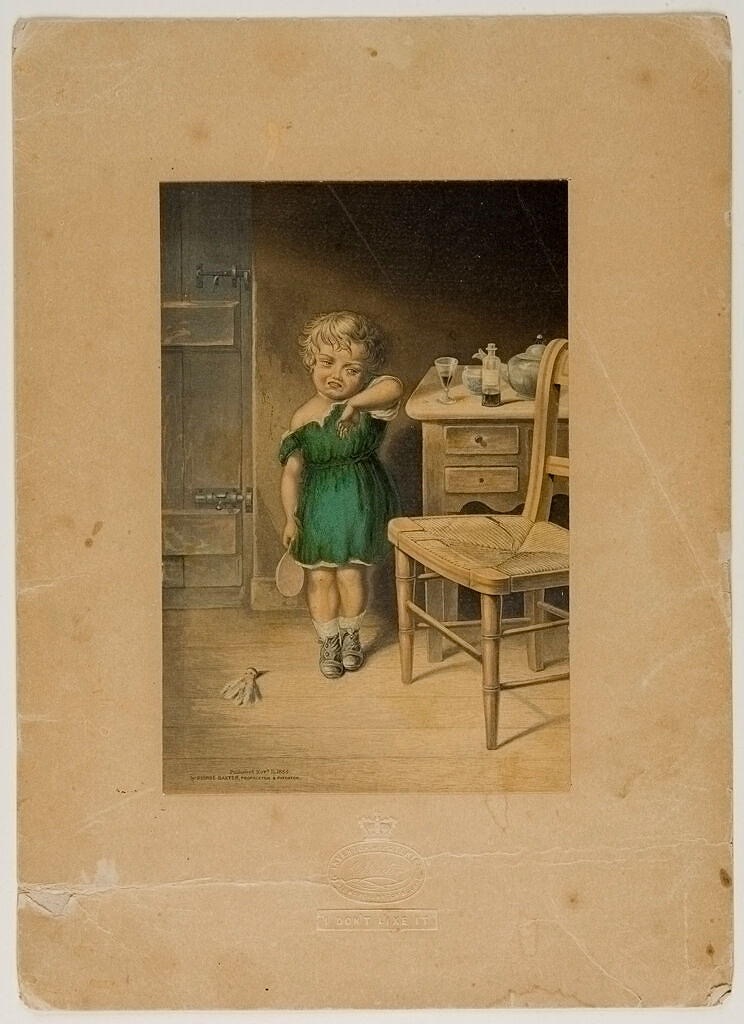
George Baxter: I Don't Like It! (19th century)
We parse our world with probabilities. We ask, "What was the likelihood?" without considering whether we're dealing with a situation where probability might rule, for its domain does not seem as universal or infinite on close investigation as it initially might. Not every event falls beneath the governance of the law of large numbers. Many carry an essentially zero likelihood of ever occurring, yet they still somehow manage to manifest. While doubtless only partially purposeful, our development probably also doesn't qualify as random, either. The likelihood of me becoming who I am today was zero when I was born, but then nobody could foresee very much of anything that would be coming, so one might wonder what sort of fiction anyone could have been predicting.
The unlikely seems commonplace.
LapCat
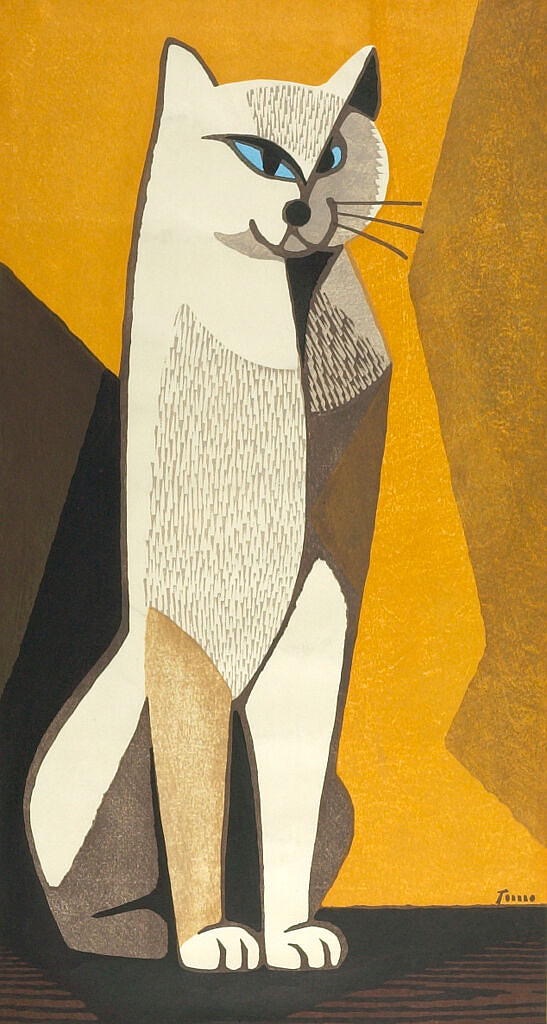
Inagaki Tomoo: Seated Cat (Shōwa period, 1926-1989)
Harvard Art Museums/Arthur M. Sackler Museum, Bequest of C. Adrian Rübel
" … get on with my morning. "
Max has grown into the LapCat I'd once imagined he might become. When trying out a potential new cat member of the family, I was deliberately very picky. My memories of prior cats colored my judgment, turning every candidate into an unlikely companion. Their coloring seemed wrong, or their temperament suspect. Of course, it should have been impossible to tell if a six-month-old kitten might grow into a tolerable companion, but I persisted in my gruff assessments. The Muse and the visiting Grand Otter returned from a visit to the cat shelter insisting that they'd found the replacement I had been seeking, so at their invitation, I accompanied them back to the place to test drive this latest contestant.
He was the right color and perhaps the proper temperament.
WritingSummary For The Week Ending 10/19/2023
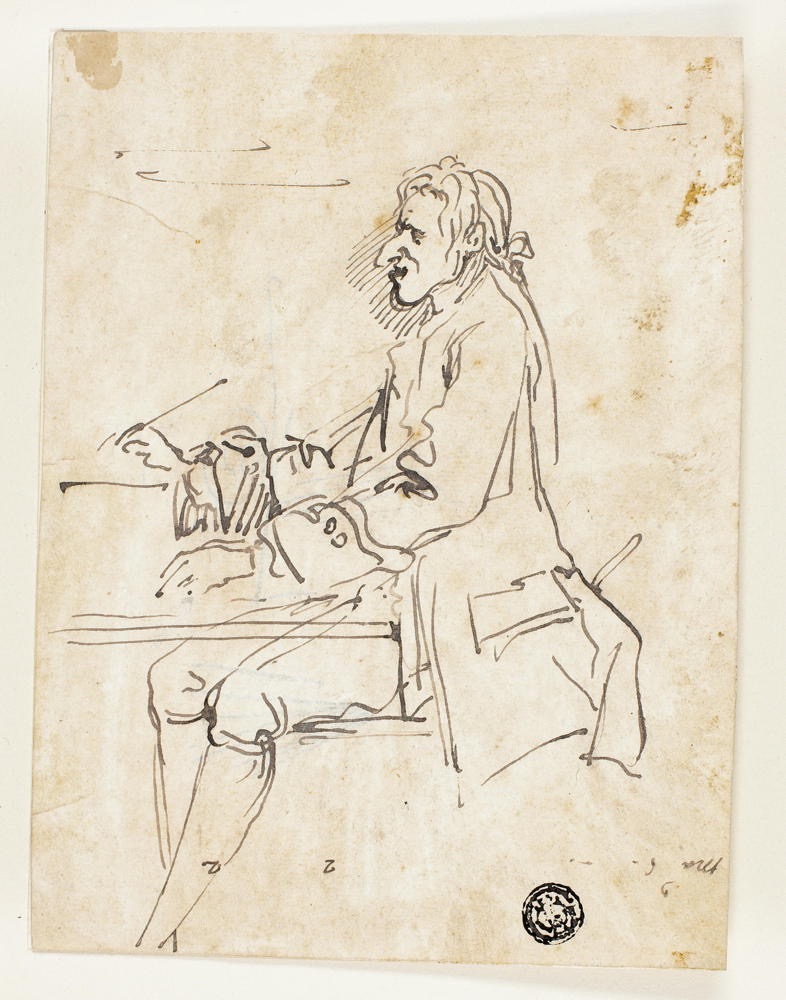
Carlo Marchionni or Pier Leone Ghezzi:
Caricature of Man Writing (n.d.)
A Familiar Place I Should Feel More Accustomed To
I might have finally run out of time. I'd felt a certain draining of my resources as if mice had invisibly invaded my pantry and begun quietly consuming my commodities. I hadn't noticed any particular shortages, though. The flour, sugar, and other stores seemed unviolated, yet I continued feeling shorted. This sense might have been pre-emptive, a feeling intended to prepare myself for a future loss, just as if such preemption were possible. I engage in many just-as-ifs these days. My days absolutely depend upon just this sort of speculation. I am predominantly a faith-based initiative. I move forward on rumors more often than facts. I never feel very confident about anything, even in retrospect. I do know, though, that the sun's arriving later every morning and leaving inexorably earlier every evening, leaving me in the dark, a familiar place I should feel more accustomed to than I seem.
Amaficient
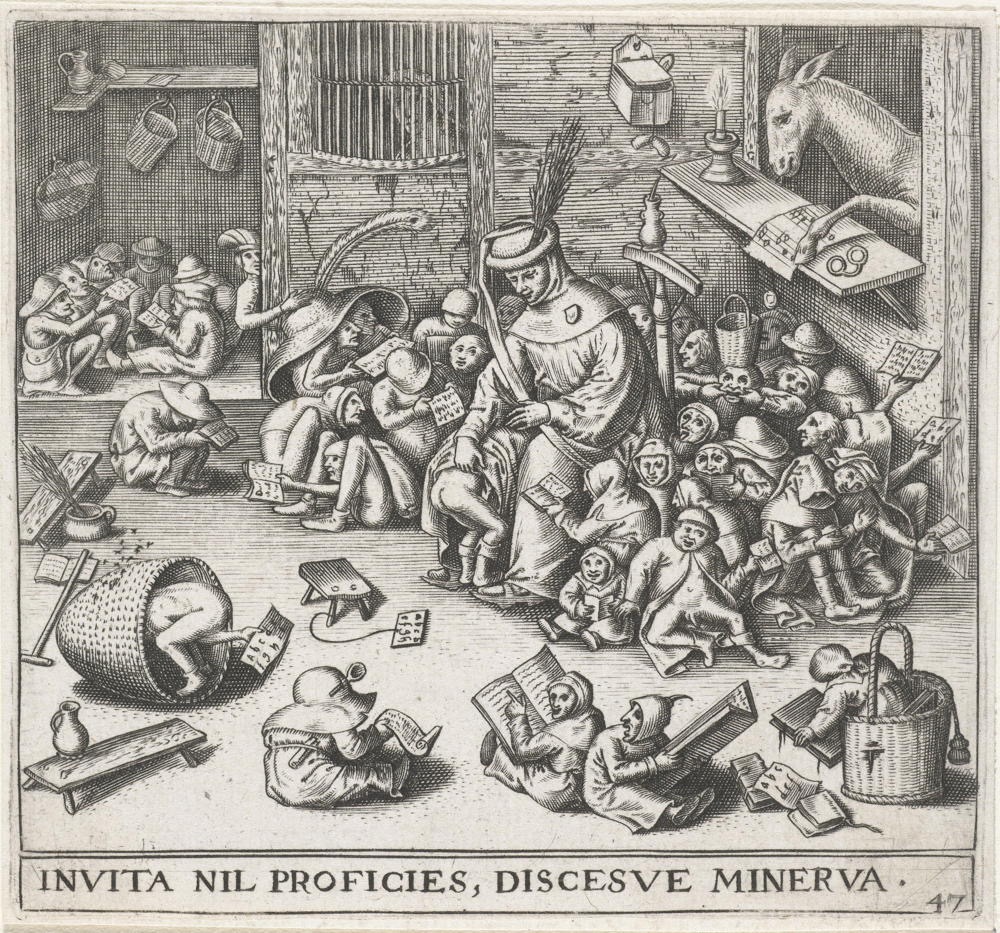
Johann Theodor de Bry:
De ezel op school [The Donkey At School] (1596)
"I never come close to producing my best until I leave the paycheck out of the effort."
In this culture, my culture, we speak glowingly of The Professional, as if it occupied the highest rung of some hierarchy of goodness. Amateur might be just fine but it's never the quality a professional might produce, as if making money, getting paid for performing, somehow sanctifies an effort. Interesting how most of the effort expended in this culture cannot be properly classified as professional. We cede our most important work to amateurs.
I was once a professional.
Laming
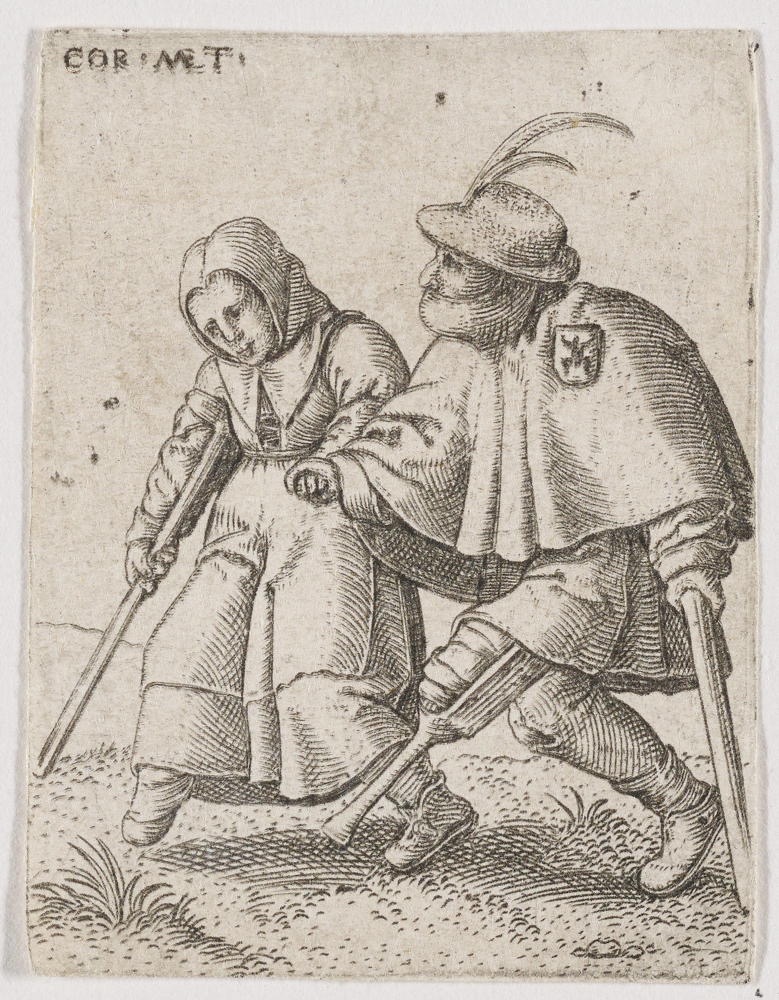
Cornelis Massijs: The Lame Dancers,
from La danse des estropiés, Plate 10 (1538)
" … bare trees and I will still be standing."
Every step I take might advance me, but it also somewhat hobbles me, for I remain far from an infinite resource. I experience wear and tear and might never fully recover from any exertion. I poison myself as I nourish myself, this dichotomy apparently indivisible. I can't have one without the other. This fact comes into sharper focus whenever I exert extraordinary effort. Though I do not immediately recognize this shift, my limits might have receded to well beneath my earlier edges. I remain focused on my goal while imagining employing the same old machinery. I seem increasingly an imaginary character, fueled by fiction and grounded by my creepingly prominent limitations. I can still stretch to excess, but only if I'm willing to pay the price. I’m almost always willing.
I hope to never engage with cautious circumspection.
Foreboding

François Bonvin: Woman at the Spinet (1860)
" … before conceding that I would not succeed."
Fall predictably brings Foreboding, for we all know what's coming. We do not know—we never know—precisely when, but we understand what's coming next. Summer, which seemed permanent while it lasted, left without notice. I always hold my faith in Summer until it's been well and truly betrayed by a chill wind or days of rain. I never believe in Fall, for it seems to move unreliably, some days hot and some days almost cold, an outlier day nearly eighty, an easily ignored forty early one morning. My sweatshirts creep back into my wardrobe. Socks seem necessary again. As I said, I know where this is going and feel powerless to suppress it.
As usual, my work's backed up.
MightyMachine
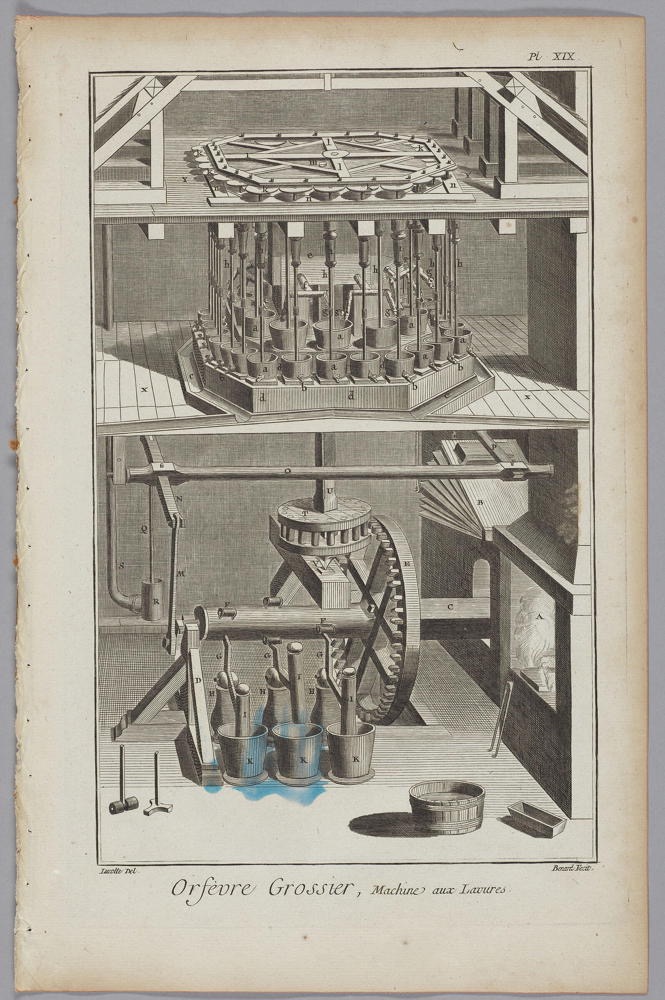
Robert Bénard: Goldsmiths' Cast Machine (1771)
"It was always destined to become a one-and-done contraption."
An old Pennsylvania Dutch caution insists we're "too late schmart." Smarts emerge only after stupidity tuckers out, usually much nearer the end than any beginning. Whenever we set about trying to accomplish something, we first set about learning how we might achieve that desired end. We might spend much more than half the time we've allotted to accomplishing, quite literally not accomplishing, making mistakes and course correcting. We might not finally stumble upon the magic combination enabling accomplishing until very near the end of the pursuit. Once accomplished, the by then MightyMachine we assembled to achieve our end probably becomes moot. We seldom find ourselves in a position to accomplish the same thing again.
Our learnings might go into cold storage until another related effort begins, but even then, considerable adaptation will be required before those past learnings find fresh relevance.
BibleStudy

Rembrandt van Rijn: Woman Reading (1634)
"Please have mercy on the rest of us first!"
The Muse and I were invited to a dinner party of sorts. I say "of sorts" because the premise seemed suspicious since it was organized as a kind of lottery where somebody other than the host decided who would attend. That somebody was a group The Muse belongs to that also musters an annual used book sale, which has become a standing ritual on the local calendar with collection boxes prominently positioned throughout the town. The Muse sometimes disappears for an afternoon, claiming that she's going to "sort books," a good enough excuse and better than some. I anticipate these gatherings as if they were teeth cleanings. It's not that I'm anti-social. I just prefer to limit my social exposure to well south of any lottery.
We had met our host for the evening at an earlier ginned-up gathering, and I remembered her as a most unusual dinner companion.
RandomWalking
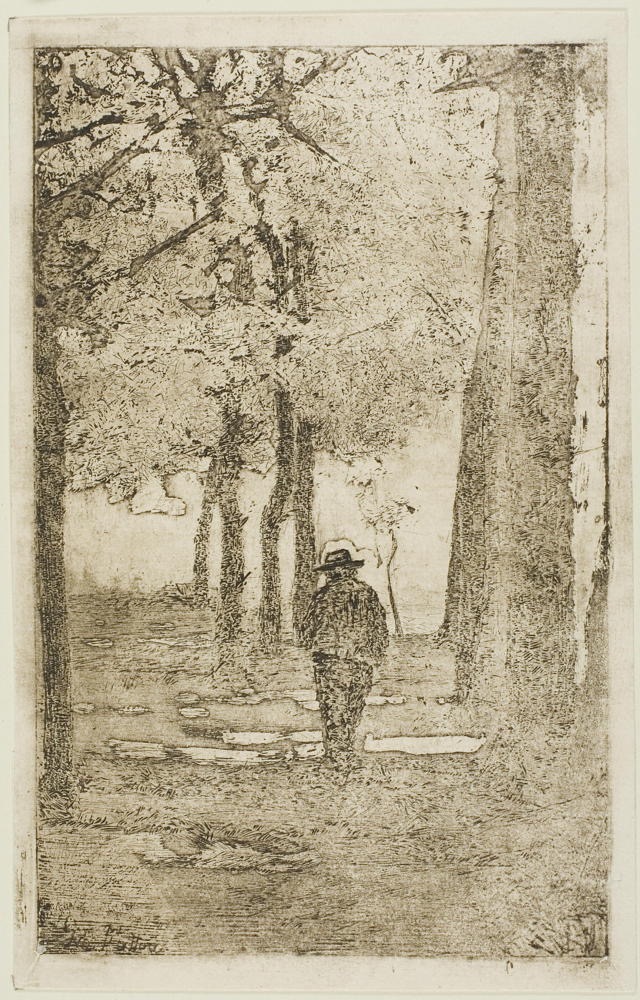
Giovanni Fattori: Wooded Walk with Figure (n.d.)
"Discovery better imprints than simple direction ever does."
The Muse uses an app to guide her volunteers in performing literature drops. A Literature Drop refers to a distinct kind of Canvassing, the purpose of which is not to contact anybody but to leave a piece of campaign literature where a resident can find it and get influenced. Lit Drops can cover an entire precinct in an afternoon, while door knocking and full-out Canvassing take much longer and might even prove less effective because of the reduced number of houses full-out Canvassing can cover. This app guiding the volunteers does not prescribe a path through a precinct. Instead, it presents a picture of the target houses arrayed on a map. Since precincts are essentially arbitrary constructions devised for purposes other than creating an easily walked-through route, the volunteer must concoct their path, which will inevitably seem to make little sense to any outside observer, often even the volunteer.
Pattern seeker that I have always been, I search each precinct map for a path of, if not least resistance, then at least one demanding minimum effort.
OffDay
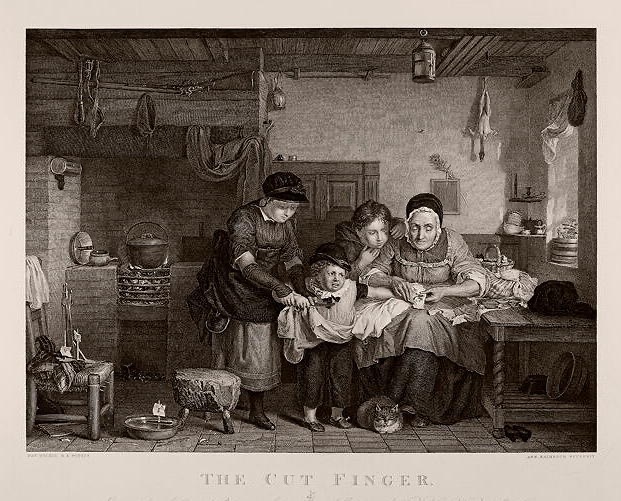
Abraham Raimbach: Cut Finger ((19th century)
" … gone before they began."
In days past, people grieved by wearing a black armband, a universally recognized indicator that the wearer might not be up for normal activities of daily living. Chit-chat could wait. So could further trouble. People understood to give the mourner adequate space to feel crazy for a while in the interests of maintaining some tolerable level of sanity in society. Now, we've grown so damned casual that we no longer observe such rituals, so the typical mourner hasn't a clue what to do. Of course, the black armband wearer never had a clue what to do, either. That might have been the whole point of observing the ritual. The guidebook said, "When someone dies and leaves you without a clue what to do, wear a black armband until your head clears." It also insisted, "When encountering someone wearing a black armband, express no more than your heartfelt condolences. Avoid chatter." These days, one experiences an OffDay instead.
An OffDay seems different than a day off.
WritingSummary For The Week Ending 10/12/2023
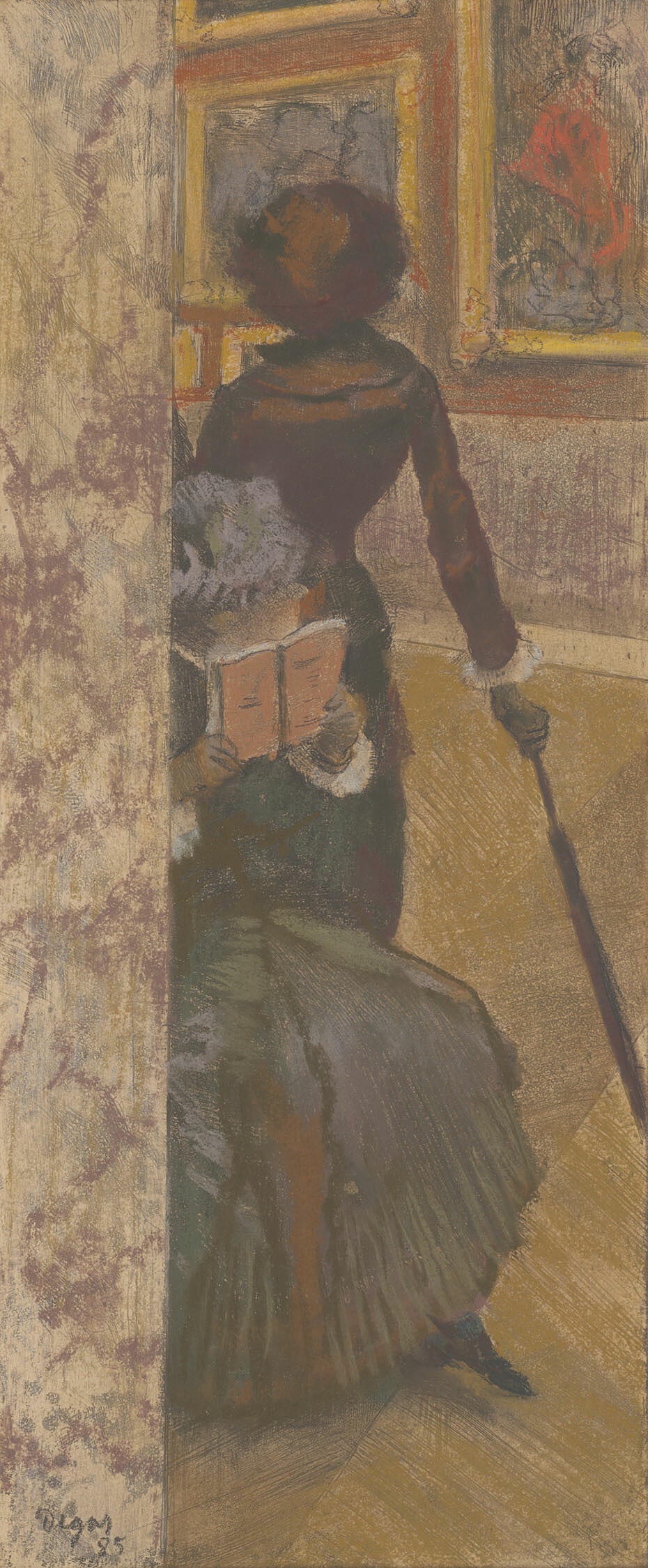
Edgar Degas:
Mary Cassatt at the Louvre: The Paintings Gallery
(1885)
I Wonder What Insufficiency Buys Me
In my seemingly endless search for sufficiency, I do not always notice just how extraordinary I might already be. I may have been too focused on improvement to muster a decent acceptance that how, what, or who I was might have surprisingly qualified as plenty, as enough. Our culture seems obsessed with pursuing continuous improvement, which amounts to a self-image of continual inadequacy. Who would hope to be presently inadequate so they might find themselves improved later? If we're not quite ourselves yet, who was supposed to pursue the aspired for improvement? We can deny that we're adequate, but what do my convictions of insufficiency buy me, really?
RichLife
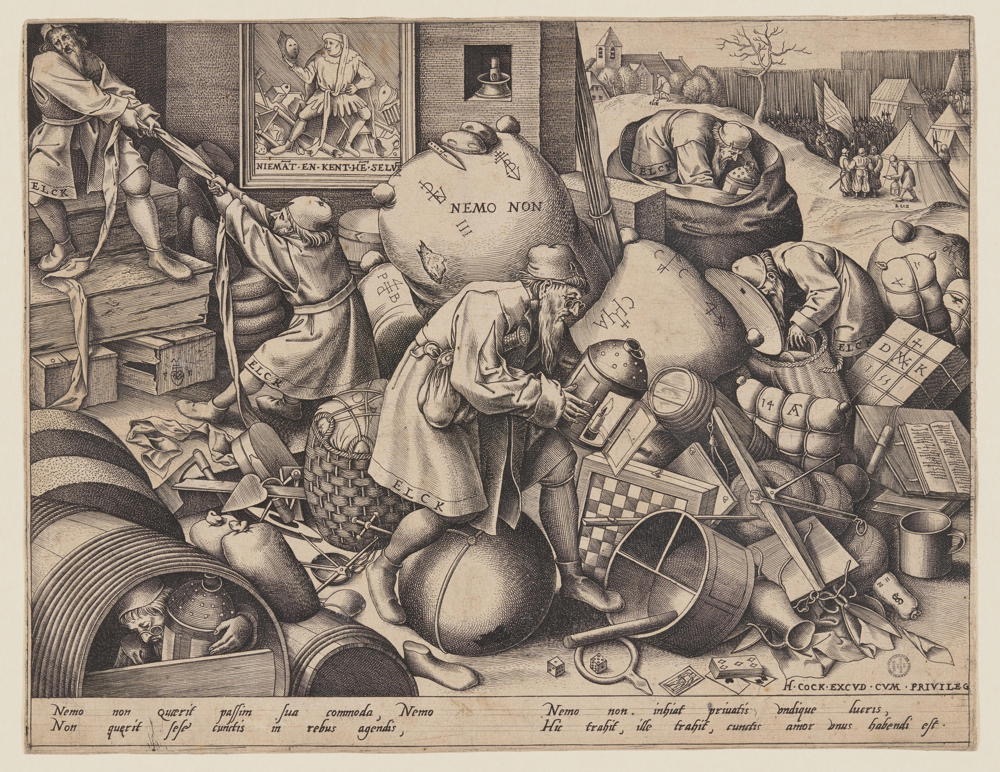
Pieter van der Heyden:
"Nemo Non” (Every man looks for his own profit) (c. 1563)
"I missed him before he left."
I received word that my dear friend Rich VanHorn died. He had been under hospice care since his physicians had released him from treatment two months before after eight months of effort to cure what started as a case of stage four lung cancer, which had migrated into his brain. He began treatment just as The Muse ended her immunotherapy response to early-stage throat cancer, with every expectation of a full recovery since he was an atypical patient. Never having smoked, the source of his cancer seemed mysterious, and he had access to one of the best clinics in the world. Initial responses seemed promising, but the cancer continued spreading until his doctors advised that he stop chasing a cure. He settled into that news with circumspection as if this phase of the disease had been sent to teach him something.
Rich took his undergraduate degree from Columbia Divinity, graduating into a position in the fabled Western Electric Human Resources Department in New Jersey.
Overreaching
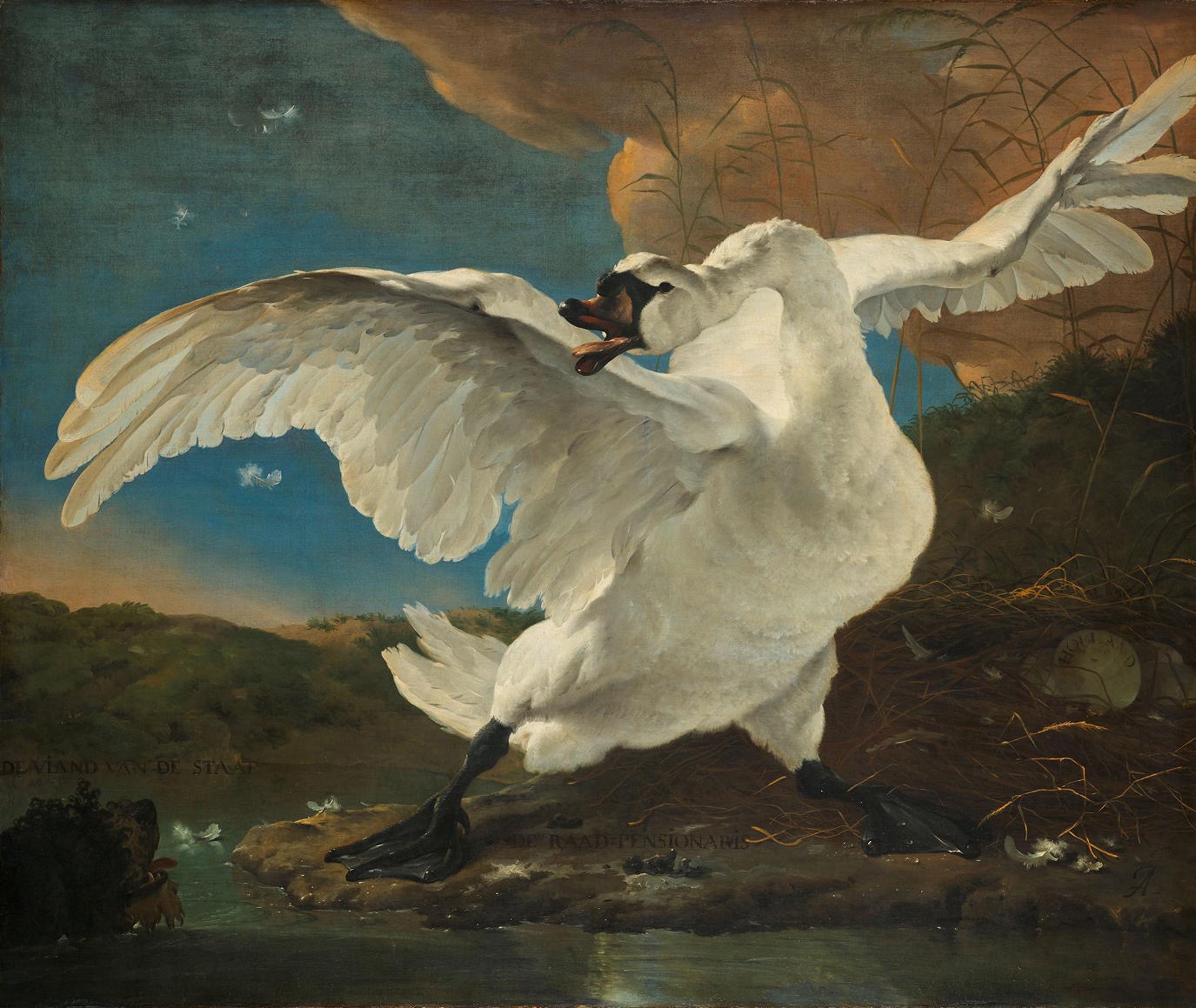
Jan Asselijn: The Threatened Swan (c. 1650)
"We were supposed to be better than this."
It seems to be in our human nature to Overreach. We tend to take some stand and then over-play our hand, undermining our intentions. Moderation might be the only reasonable cure, but since when did moderation come into play when anyone engages with passion? And we revere the passion over-playing our hand induces, for then the complex world reduces into a single blinding right outshining almost every other wrong. To find myself on the side of not just right but righteousness invigorates me in ways I cannot deny and dare not avoid. Such passion might be the right that can only go wrong, but one we willingly embrace and with which we feel especially blessed. Save us from such righteousness.
Our enemies tend to be invisibly passionate, just as we tend to be, too.
Portending
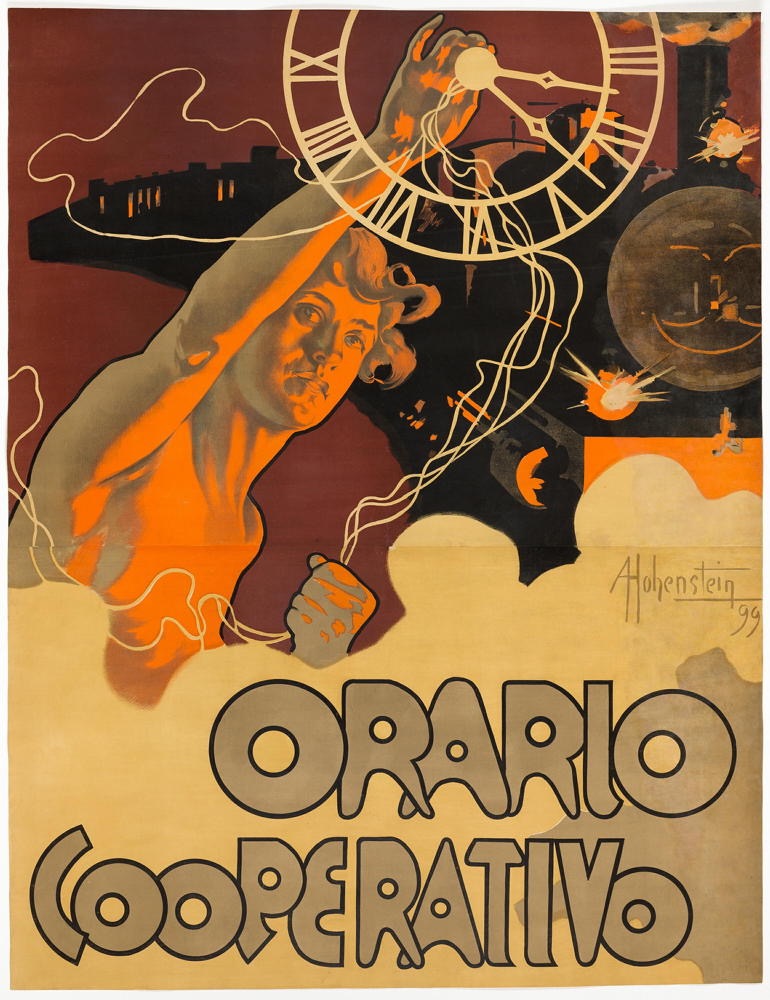
Adolf Hohenstein: Time Cooperative (1899)
" … giving my existence special meaning here."
As a dedicated fantasist, I can see anything in almost anything; everything's an omen of something. For instance, while driving home yesterday, the Schooner's rear driver's side tire went flat. Flat tires have become genuinely rare occurrences. I can't remember experiencing one since I was in my twenties, maybe fifty years ago. I'd known that the tires were getting near when they'd need replacing, but, as usual, I was stretching as much life as I could get out of them. The perfect tire seems to be the one that has less than a mile of useful life left in it when it's replaced. I'd found the one weak sister among the four and driven too far.
I pulled into a handy farmer's field to change the tire, an experience which I expected to become an ordeal but which I easily completed
PacingMyself
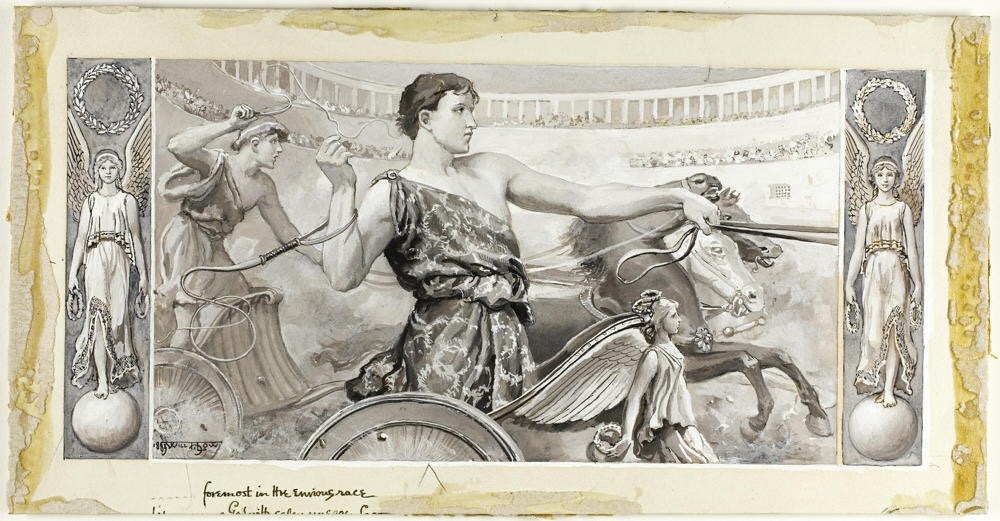
Will Hicock Low:
Foremost in the Envious Race (1885)
" … Traveling hopefully, if never fully arriving."
I never was exceptionally skilled at PacingMyself. My eyes have always been bigger than my stomach, my aspirations greater than my capabilities. These tendencies combine to render me a much better dreamer than a manifester. As a writer, dreaming might be indistinguishable from manifesting, so I might have chosen my profession well. However, I suspect that my work chose me rather than the other way around. However I've found my way here, I am well familiar with exceeding my limits, with hurting myself. I expect more of myself than later seems reasonable, and I suspect I remain relatively immature in that respect. I might have imagined learning over time more precisely where my limits lie, but I have failed to assimilate this sort of knowledge.
Fortunately for me, my subconscious tends to be watching out for me.
Celebrity

Ben Shahn: Sideshows at the Ashville,
July 4th celebration, Ashville, Ohio (1938)
" … providing the forehead The Muse uses to bounce her hair-brained ideas off of …"
The Muse's campaign to become elected Port Commissioner has already turned her into a local Celebrity. She's forever running into somebody she knows. It seems wherever she goes now, her reputation preceded her arrival. She's also taken to dropping names, not to show off, but to ascribe stories. Most of the names I do not recognize, but I understand that they mainly belong to those who already joined the ranks of the locally famous: leaders of various colors, executive directors, movers, as well as shakers. She was apparently inducted into that company, if only due to her audacity. She lost whatever anonymity she ever possessed when she started making a name for herself. Whether she was born a leader doesn't much matter. She now has many followers.
I have taken to introducing myself as The Muse's Arm Candy.
MerelyHuman
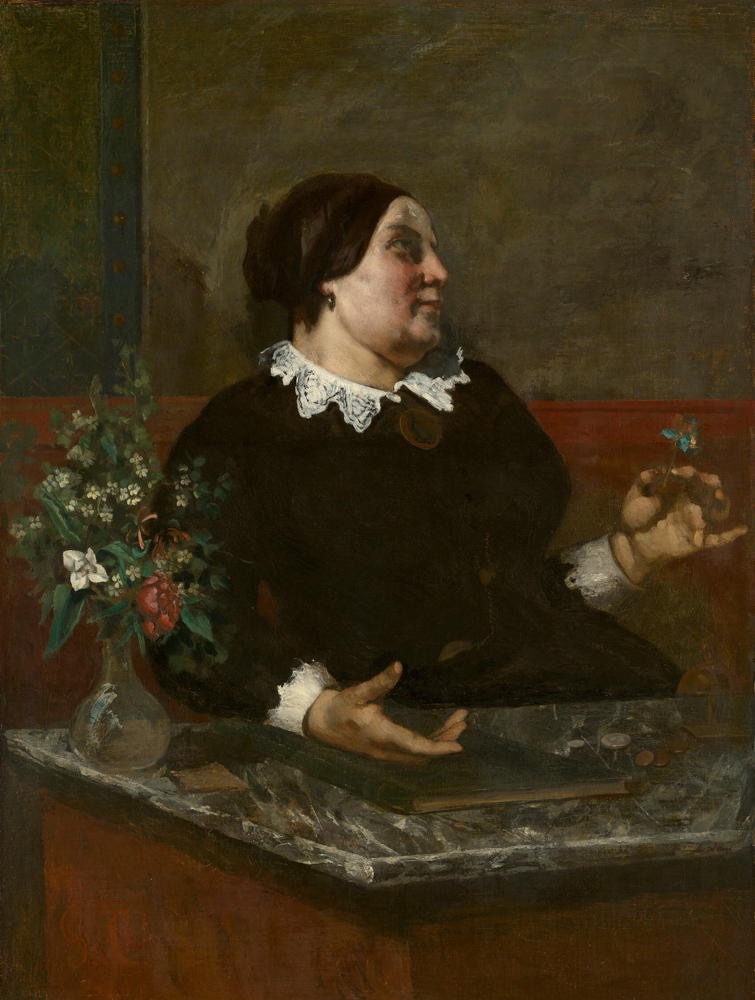
Gustave Courbet: Mère Grégoire (1855 and 1857/59)
" … the questionable superpower that comes from wearing Spandex®"
Like it or not, we live in a world that worships the superhuman rather than the more ordinary kind. Half the movies produced these days feature characters sporting so-called superpowers, capabilities no mere human ever possessed. These powers tend to be of limited utility, seemingly most often centered around fistfighting, for the villains in these films seem to be stuck in some pugilistic past where might makes right rather than in a more believable future where the bulk of the actual action occurs in firmware. The Spandex® suits suit few physiques, too, since few benefit from a costume that might just as well have been painted on. A more cultured hero might prefer to sport pleats and the occasional pattern rather than the uni-color jumpsuit with the obligatory logo.
Much of my life has been spent in the shadow of one or another superhero.
CrowdingOut
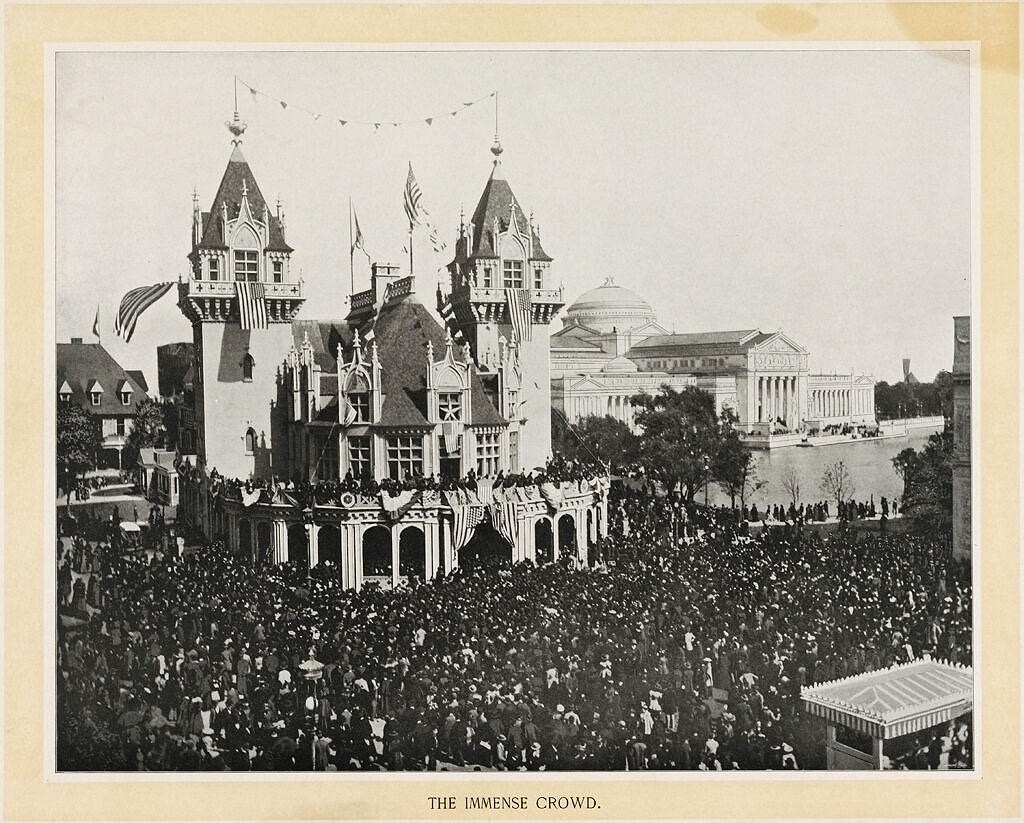
William Henry Jackson,
The Immense Crowd, World's Columbian Exposition (1894)
"Even the CrowdingOut gets crowded out sometimes."
I hesitated when The Muse asked me to sign on as her campaign manager. Truth told I'd advised her not to run, but she went right ahead and ran anyway. To enlist someone who demonstrated their dedication to the effort the way I had bound me up, though I eventually relented. However, I did so, still clinging to my original misgivings. It wasn't that I didn't want to support her in this latest delusion. I was more trying to avoid colluding with myself against my own best interests. I avoid making too many commitments because I fear I will, by default, be CrowdingOut more critical stuff. I can never tell what that stuff might entail, but I keep my schedule more to the wide-open end of the scale than the slammed-shut side. Most importantly, I strongly need to protect my sacred writing time because I know how vulnerable that can become.
Writing fails exclusively through sins of omission rather than by commission.
WritingSummary For The Week Ending 10/05/2023
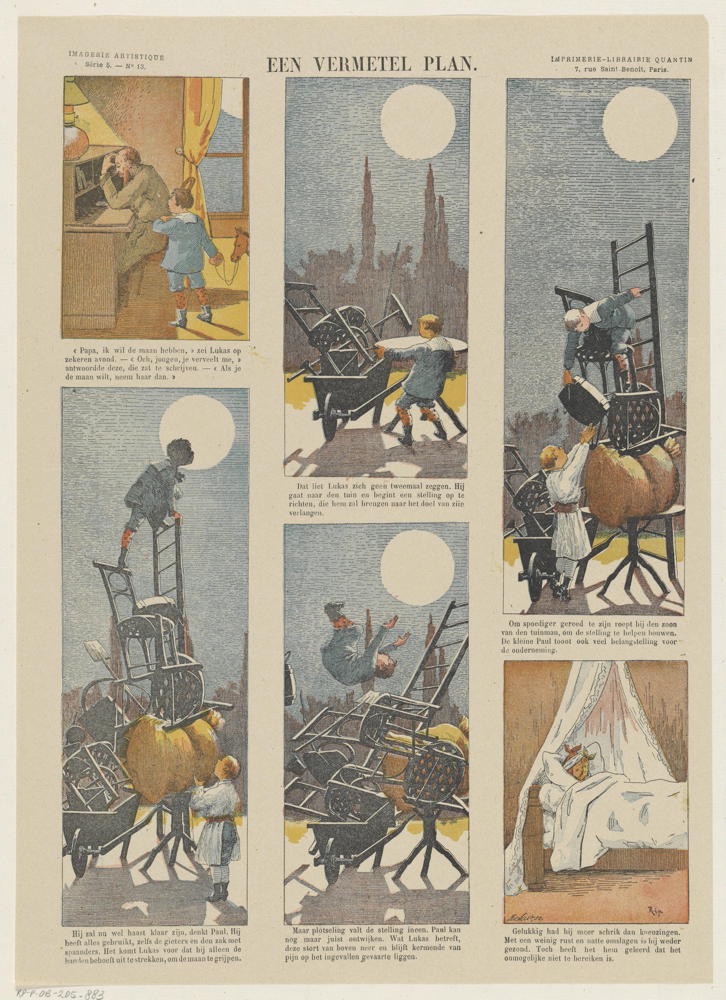
Michelet: Een vermetel plan [An Audacious Plan](1888)
Careful Whatever I Wish For
My side work profoundly influenced this writing week, my day job mismanaging The Muse's political campaign. In that work, I found insight into what I might have been attempting in my real job, this story-writing occupation that only pays me in satisfaction. I watched myself meandering yet still making progress. I caught myself exhausting myself, too, and wondered who taught me to be so damned self-sacrificial. I suspect my loving parents taught me how to deeply wound myself because theirs had taught them the same lesson learned in the heartless heart of The Great Depression. Intergenerational self-destruction in pursuit of survival, perhaps even success, seems like a worthy inheritance. It seems pleasingly paradoxical yet stunningly familiar, an audacious solution for a common problem. I must be careful whatever I wish for because I can hurt myself in any pursuit.
PreparationDance
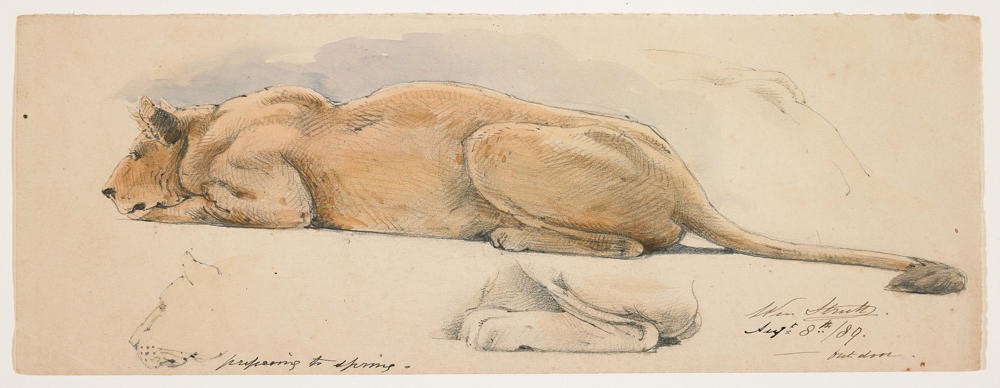
William Strutt: A Lioness Preparing to Spring (August 8, 1889)
"Appearing genuine requires much preparation."
The week leading up to The Muse's first public debate in her Port Commissioner campaign featured what might be labeled her PreperationDance. Intricate and filled with significance, this dance involves about as much ritual as invention, along with ample idle periods. She remains focused in story, if not necessarily in practice. She begs off almost every invitation, explaining that she's in the middle of preparation. There's no successful arguing against her assertion, for she's maintaining a laser-like focus on the prize. She will make up through repetitive practice whatever she lacks in raw talent. She will leave little to chance.
I first noticed the dance when I heard rattling and commotion coming from our almost unused front upstairs room.
Exhausted

Rembrandt van Rijn: The Rest on the Flight into Egypt (c. 1644)
" … much better off just staying away from engaging."
Exhaustion might be the most dangerous of the human conditions, for those experiencing it lose their ability to recognize its presence and influence. Judgment typically goes to Hell, while once trustworthy intuition fails. Because of these and other ramifications, it's considered best just to avoid exhaustion. This probably means expending significantly less than one hundred percent of one's energy in any single instance to maintain some reserve and preserve some semblance of balance. For over-achievers, this moderation might feel indistinguishable from slacking and appear to observers as an absence of requisite dedication, as if one really should be killing themselves to show their deep commitment. The perfectly human tendency to turn even innocent activities into internal competitions only exacerbates this difficulty because competing further inhibits sensitivity. We willingly kill ourselves, often exuberantly!
We wash up on desolate beaches after falling overboard.
Amounting

Ridolfo Ghirlandaio: Portrait of a Gentleman (c. 1505)
" … we might misattribute to ourselves."
I've taken to totting up my Canvassing efforts once I return to The Villa. So far, I've yet to cover neighborhoods too distant, all well within walking distance, but Canvassing distances differ surprisingly from any straight-line ones. I have yet to discover the conversion factor, and I might not. I just understand that the differences seem significant. On the first day out, I ranged up to two blocks from our front door yet still managed to clock nearly four miles when counting steps. Don't worry, I'm not nearly anal enough to actually count my steps, but The Muse reminded me that my iPhone has an App that cannot be turned off, which surreptitiously counts steps. Finding a website dedicated to translating step counts into distances, insignificant increments into numbers that actually seem to amount to something was a simple matter. Five days in, I broke over twenty miles marched, and that's only counting two precincts!
I've noticed before that progress comes exclusively in InsignificantIncrements.
CottageIndustry

Helen Allingham: A Wiltshire Cottage (19th-20th century)
While Vincent van Gogh was developing as an artist by studying English illustrated journals, he was struck by Paterson's work in The Graphic. Although females could not gain the same recognition as men at the time, Helen Allingham was one of the women artists who made a considerable impact, as she influenced artists like Van Gogh. -Wikipedia
—
" … on legs that vividly remember stumbling."
Processes, how people accomplish things, have long fascinated me. By my own admission, I have been mainly critical of "process," if only because I felt that organizations generally took the notion too literally. They'd pose then enforce strict rules as if only those could produce such curious results as consistency, most often still the hobgoblin of the weaker minds. They'd likewise strive for other attributes perhaps only suitable for large-scale industrial processes, applying these to wildly different contexts. In these ways and many others, managers would subvert the actual benefits of processes by strictly enforcing some naive notions about what constituted them. Popular method-ologies (method descriptions raised to religious veneration) further degraded the intention, as successive generations were trained to interpret their processes in this primitive manner, as if that result represented progress.
We've seen the effect of processes run amok in just these ways, most disturbingly within CottageIndustry.
TakingAHike

Jan Lauwryn Krafft (I): Wandelaar [Hiker] 1704 - 1765
"I'm in a kind of walking coma …"
I didn't know what I might be called upon to do when The Muse insisted I agree to become her Campaign Manager for her run to be elected Port Commissioner. I only knew that I didn't want any part of the scheme, for it seemed to be another one of those plans to bring me out into more actively engaging outside my head, a make-work arrangement intended to force me to do things I never intended to do. And to some extent, all my suspicions turned out to be true. As I've mentioned in previous stories, I've renamed my role Campaign MISmanager, if only because that title better describes the value proposition her campaign has received from my presence. Still, I've had my moments. I have contributed some value.
I'm now engaged in my new hobby: Canvassing, an obligation transformed into a personal competition.
ThePromisedLand
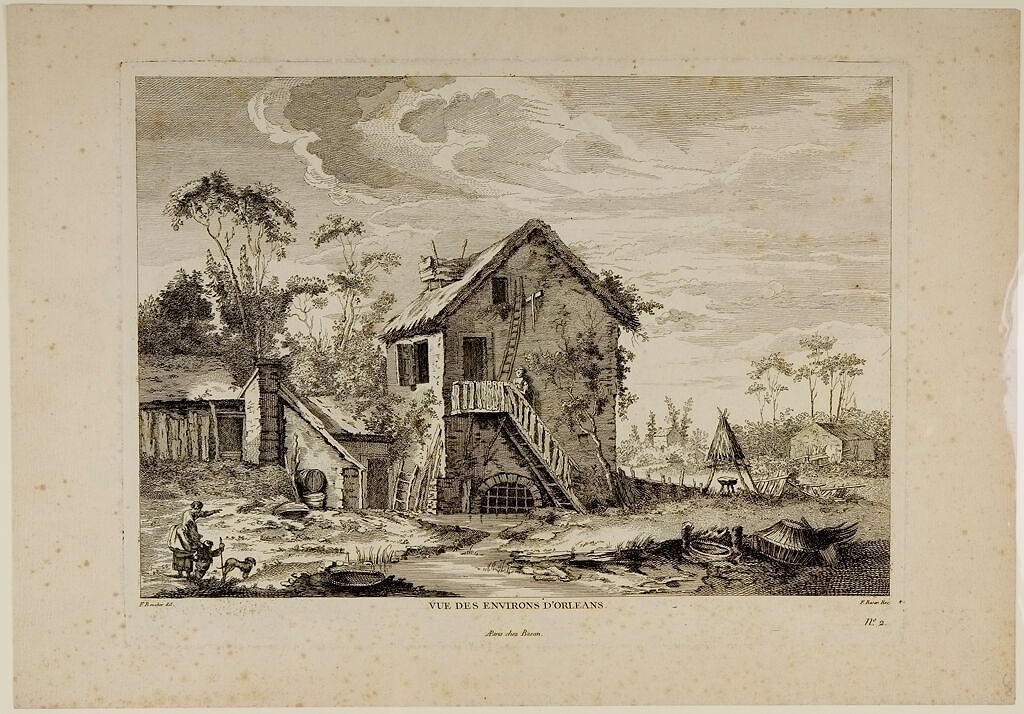
Pierre François Basan:
View in the Neighborhood of Orléans (18th century)
"When the school seems like the fanciest property in the whole precinct …"
As my old hometown transforms into a destination resort featuring innumerable wine-tasting rooms and new high-end restaurants, I spent an afternoon walking around the neighborhood where I grew up sixty and more years ago. Fortunately, I was born into a boom time, Post-War, filled with promise. Most houses were filled with families who kept them up, with few exceptions. Lawns were regularly mowed, shrubbery trimmed. I've said it before: I grew up in a Walt Disney® movie.
It's instructive to see what's become of all that promise.
Canvassing
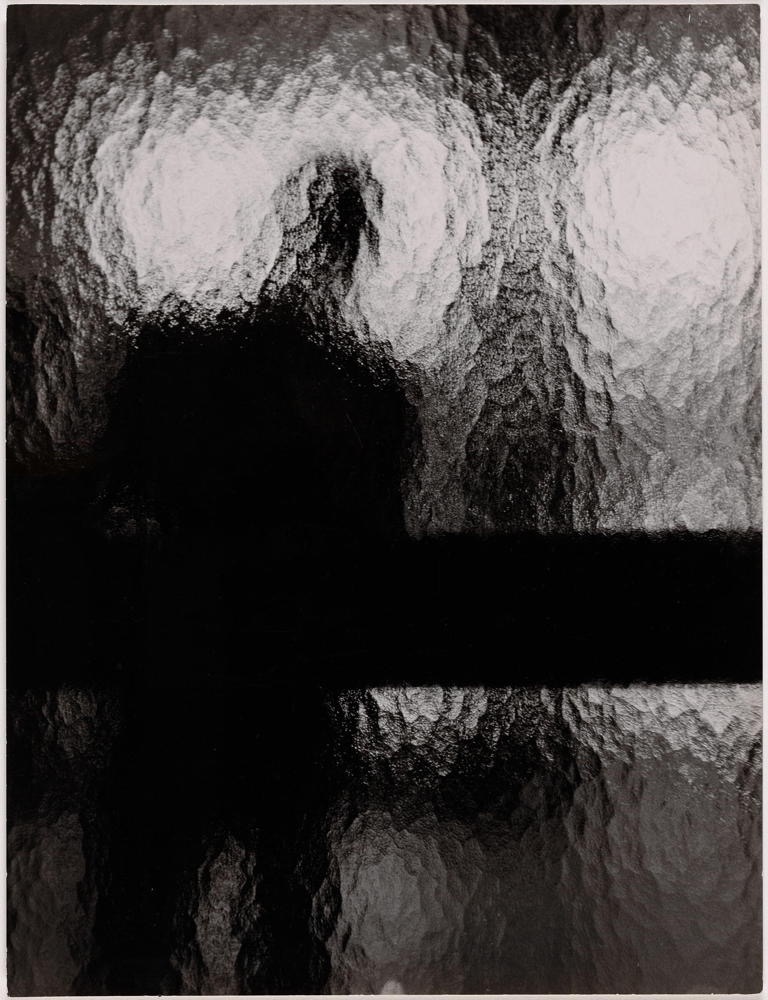
Siegfried Lauterwasser:
Outside the Door, Cologne (1950)
" … we might just be GoodNuff to accomplish that."
When The Muse was still considering whether to run for our county's Port Commission, I dreaded one aspect of campaigning. I figured that I could easily assimilate many of the duties of the role of the campaign manager she insisted I become, all but one: Canvassing. I carried a not unreasonable fear of going door-to-door to promote the candidate. This aspect dredged up images of selling vacuum cleaners and collecting for my paper route, my idea of the worst dead-end job, and my least favorite part of running my newspaper route. I was introverted enough to revel in riding my bike six and a half miles every morning, rain or shine, delivering papers. Still, I dreaded meeting the customers I served. I much preferred to be like the milkman, reliable yet unseen. I didn't want to creep around on people's porches interrupting routines. I also feared encountering one of those baby-eating MAGA morons who might try to use me for target practice.
I hesitantly agreed to try to fulfill the role of her campaign manager, a role I've recently renamed Campaign Mismanager because that title better describes the services I provide.
WritingSummary For The Week Ending 09/28/2023
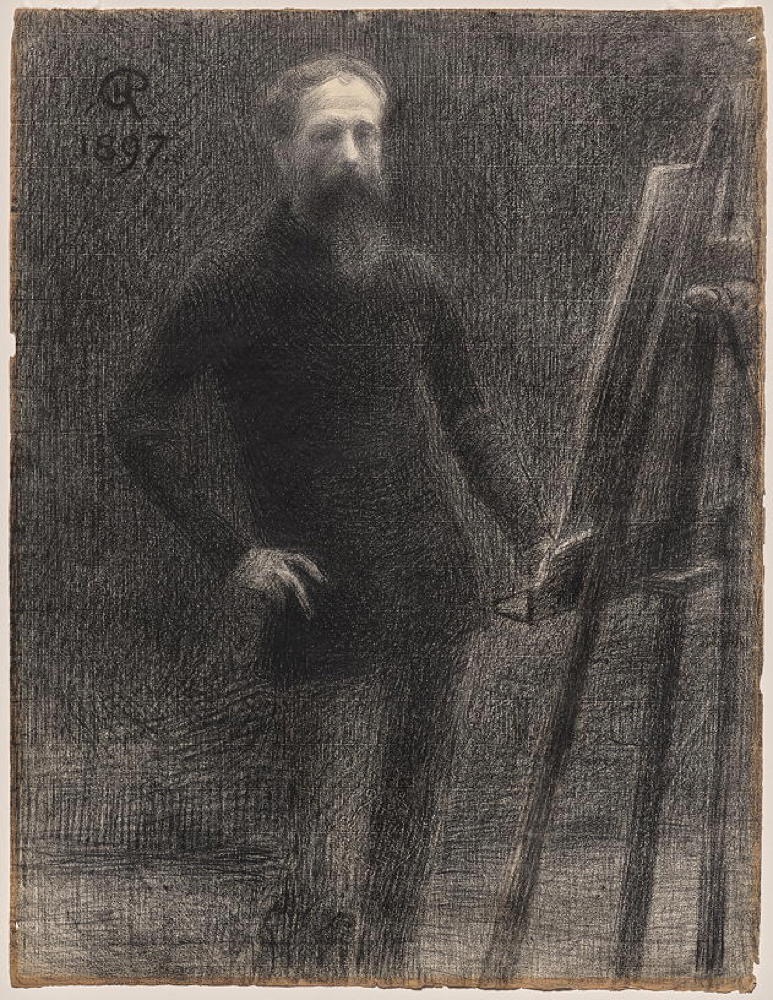
Hippolyte Petitjean: Self-Portrait at Easel (1897)
Light Seeps In Regardless
When The Muse gets The Blues, there's little I can do. Even though I am our relationship's recognized Emotional Support Animal, my powers do not stretch much further than my fingertips. When The Muse gets The Blues, there will be no laying upon of my fingertips. I cower in my corner, which, at that moment, feels more like hers, and I hope for the best. She cannot maintain her Blues for more than a few scant days, which, of course, last forever. She will have been actively working her way out of her ditch and around her wall since slightly before her fall, and she's never yet failed to find an exit. The moment she glimpsed the exit, the atmosphere brightend around here. Even the cats noticed the retreating low-pressure area. Life returned to what passes for normal again, though the receding downtime was not precisely alien. We know the whole mix that constitutes the human experience. I try to keep my head down and focus on my work when The Muse gets The Blues. I claim she was experiencing some campaign doldrums, a perfectly normal condition every campaign and campaigner has experienced before her. Light seeps in regardless, and the story continues with renewed earnestness, GoodNuff for our intents and purposes.
AlreadyKnowing
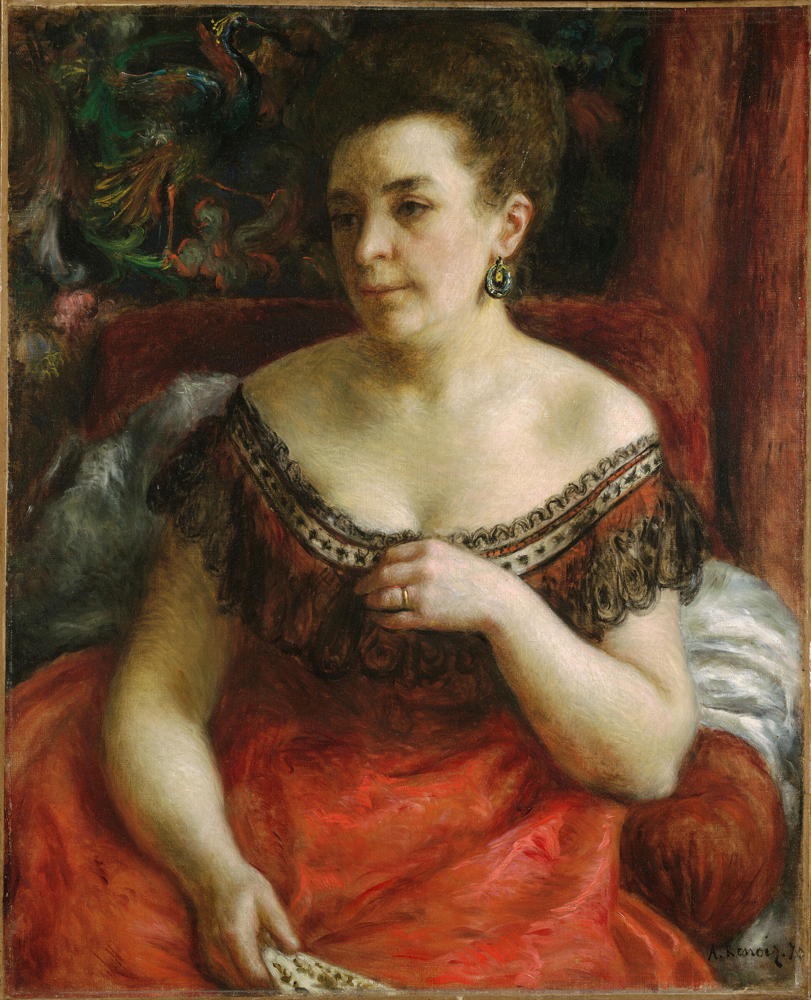
Pierre-Auguste Renoir:
Madame Pierre Henri Renoir [Blanche-Marie Blanc] (1870)
"We're both still learning, or could be."
The older I become, the more I carry a sense of AlreadyKnowing, and this sensation seems like an awful burden. I could once routinely show up knowing I didn't know, leaning into a learning, open to new experience. Now, I often arrive dreading the upcoming experience, knowing that I will undoubtedly encounter some warmed-over rendition of something we did much better back in the day. Civilization progresses curiously, if it actually advances at all, for each successive generation seems to need to reject or otherwise forget their forebears' learning and reinvent their wheels. The result often seems to be wanting to anyone present when the original was operating. So much the worse for that witness, who can no more resurrect the past than revisit it. He's sentenced to the present disappointment.
Frustration results.
TurningAround
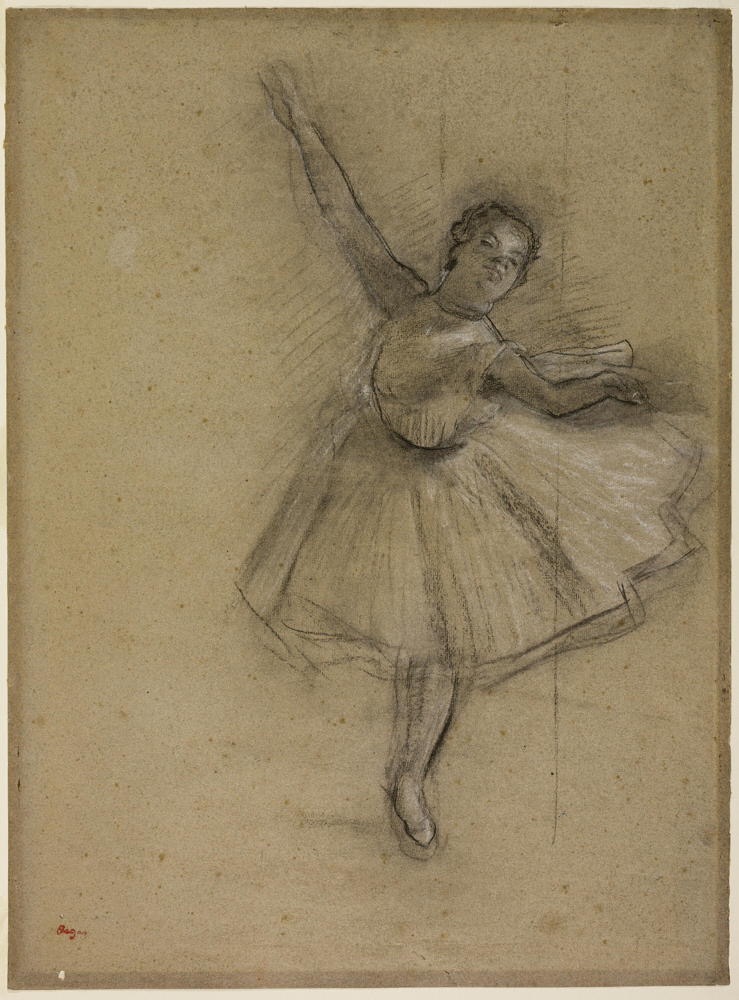
Edgar Degas: Dancer Turning (c. 1876)
"I solved nothing and resolved everything …"
Contrary to popular misconception, most difficulties do not need fixing. Yes, they certainly seem to need fixing, but this appearance often proves misleading. I spoke yesterday of TheWall, a real barrier to forward progress. I insisted that I would need to find some way over, under, around, or through that wall to unstick myself, but that insistence played into this prevalent misconception. I managed to escape that wall's influence by less radical means, by what I might call a GoodNuff technique. Please make no mistake, TheWall's still there, but it no longer holds much influence over my progress. Did I go over, under, around, or through it? No, I didn't. I evaporated its power over me instead.
Promise wields great and mysterious influence. I can, for instance, feel absolutely up against TheWall one minute and, the next minute, feel utterly liberated from that wall's influence.
TheWall

Josephus Augustus Knip: The Aurelian Wall in Rome (c. 1809-12)
" … always stumbled upon some resolution."
It's not if but when. Never whether, either, because as near as I can tell, we each encounter TheWall, usually at an inconvenient time. TheWall often amounts to more of a cognitive barrier than a physical one, but the way this universe works, sometimes a physical barrier brings the metaphor into sharper focus. Anything that seems to stand in the way of forward progress can stand in as TheWall. Discouragement has always been a popular flavor if not necessarily a crowd-pleaser. Whatever flavor your barrier comes in, it will be your challenge to find some way to overcome the blockage. It rarely matters if one manages to go over, under, around, or through. The fates usually leave that choice up to you and the conditions at hand to influence. Some cognitive walls can be imagined into falling. Most walls turn out to be cognitive ones.
There seem to be rules against publicly admitting to the presence of a personal wall.
The Wabi-Sabi Corner
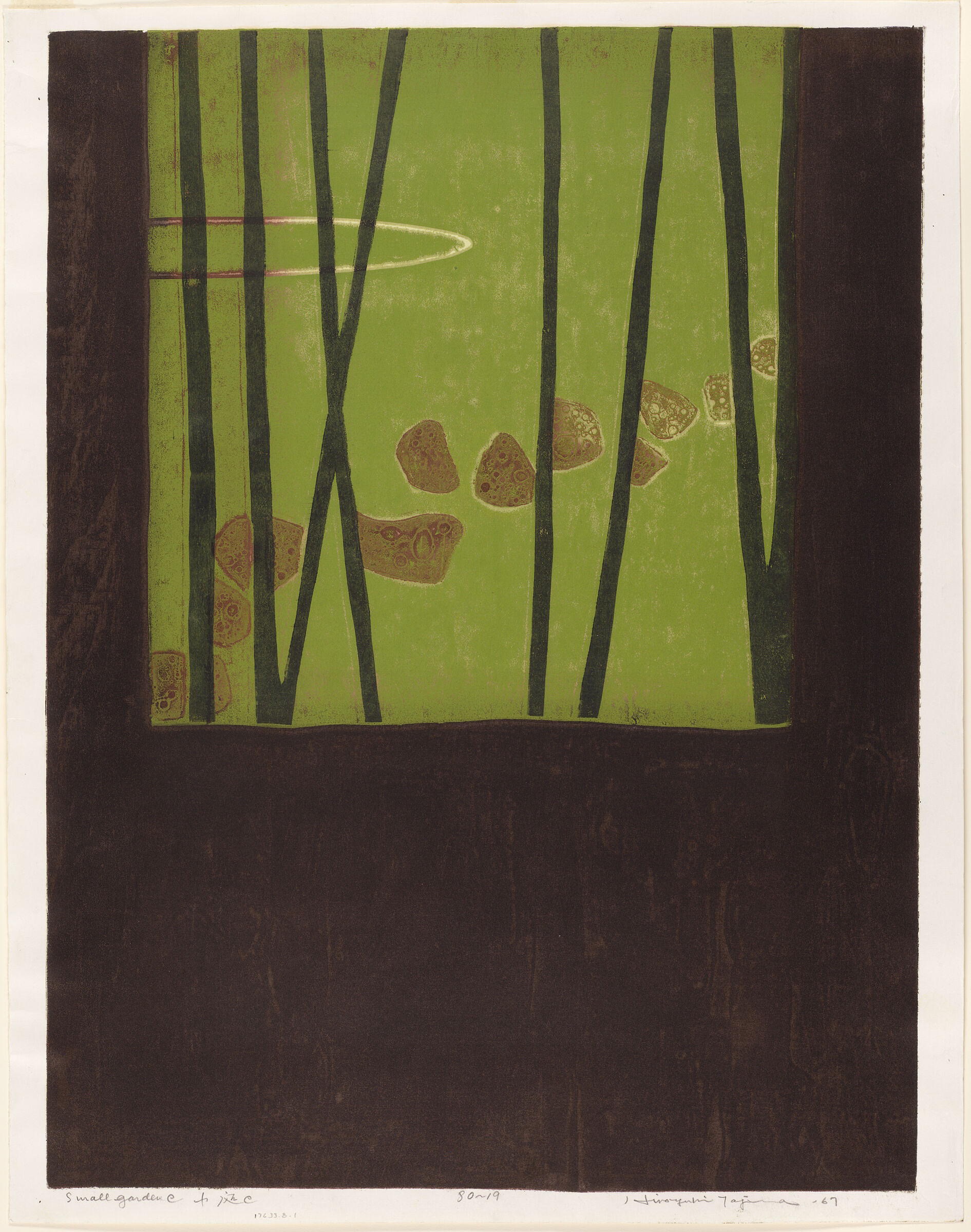
Tajima Hiroyuki: Small Garden (Shōwa period, dated 1967)
In traditional Japanese aesthetics, wabi-sabi (侘寂) is a worldview centered on the acceptance of transience and imperfection. The aesthetic is sometimes described as one of appreciating beauty that is "imperfect, impermanent, and incomplete" in nature. It is prevalent in many forms of Japanese art. -Wikipedia
" … a universal rule insisting upon less than perfection …"
Every gardener should maintain a Wabi-Sabi Corner, a corner deliberately unfinished, overgrown, and messy compared to the rest of the place. This practice helps keep the universe in balance, for this universe seems insistent upon maintaining a certain volume of unbridled messiness. Perfection might be its sworn enemy. Even the most famed gardens in the world feature one of these corners, though it might take some searching for a visitor to find them. They are never showcased, but they do exist. Even here, in The Villa Vatta Schmaltz Gardens, I scrupulously maintain an unmaintained corner of the yard. The Muse complains that this corner embarrasses her since it has traditionally been a corner everyone who passes can see. It's that edge just beyond the reach of every sprinkler, that corner not on my usual rounds. I've let the wildness take charge there, and the universe remains balanced. You're welcome!
Our neighborhood, too, has featured a Wabi-Sabi Corner property.
Incomparable
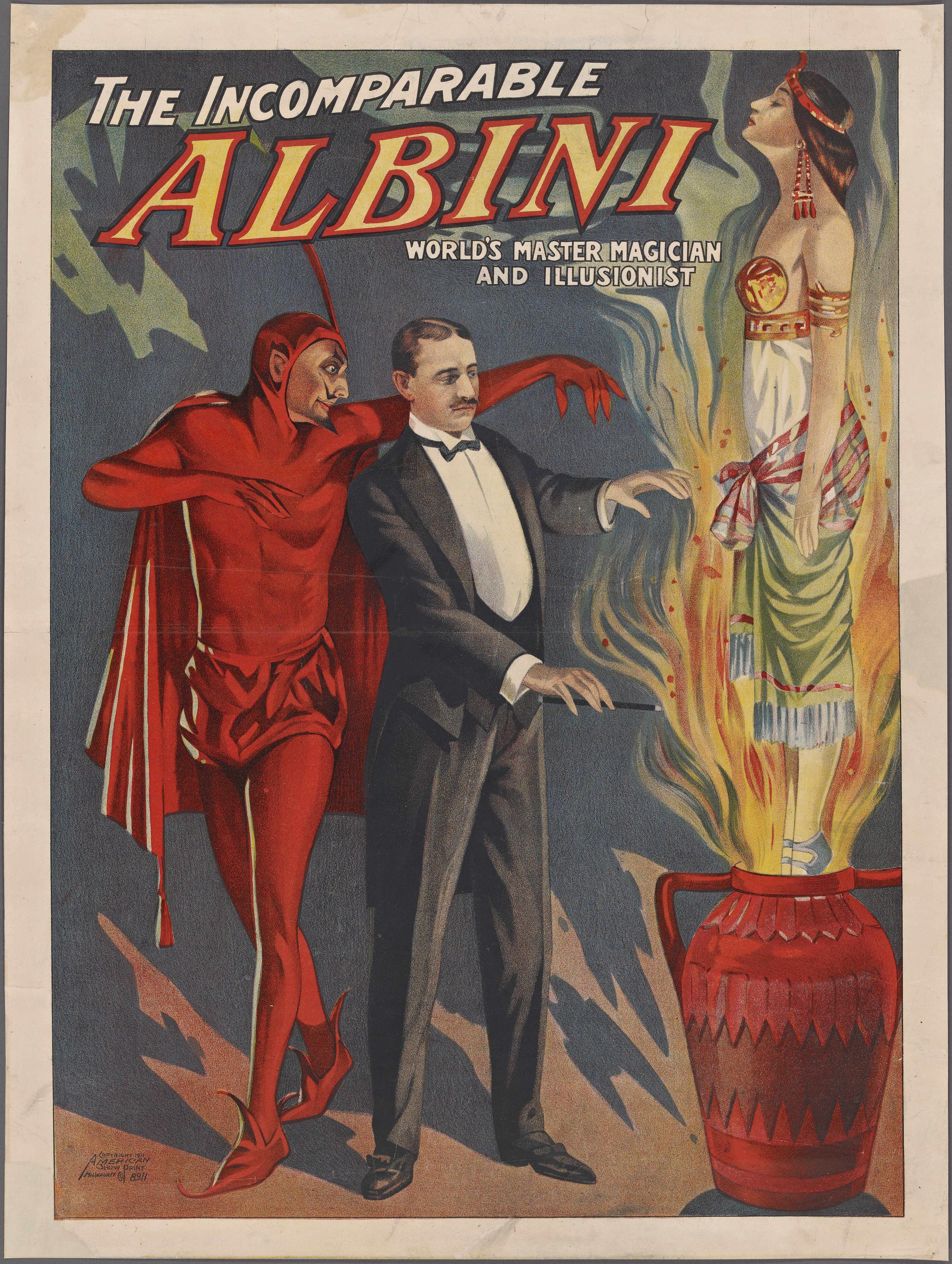
Billy Rose Theatre Division,
The New York Public Library. (1911).
The Incomparable Albini Retrieved from
https://digitalcollections.nypl.org/items/b5cfbf49-a59f-7548-e040-e00a18060aef
"What if we've already arrived …?"
One of the more innocent human tricks involves comparing ourselves with others. A practitioner might select from an infinite number of attributes to compare, most of them utterly subjective. From the wicked witch's question—Who's the fairest one of all?—to questions of relative intelligence, each might represent Fundamentally Unanswerable Questions, FUQs. They might be responded to in an equally infinite number of ways, any of which might produce reassurance or devastation, depending on the situation. One rarely slows down to consider if these questions might be worth asking. What would you have if you truly were the fairest one of all? Fairness seems a fleeting attribute and rather superficial. Such assessments, especially when self-assessments, seem questionable. Other than a temporary boost to self-esteem, the question might not be worth asking under The Don't Ask Questions You Don't Really Want The Answer To Rule.
Let's say we're all the fairest in the land. If this notion seems untenable, consider the alternatives.
AModestProposal
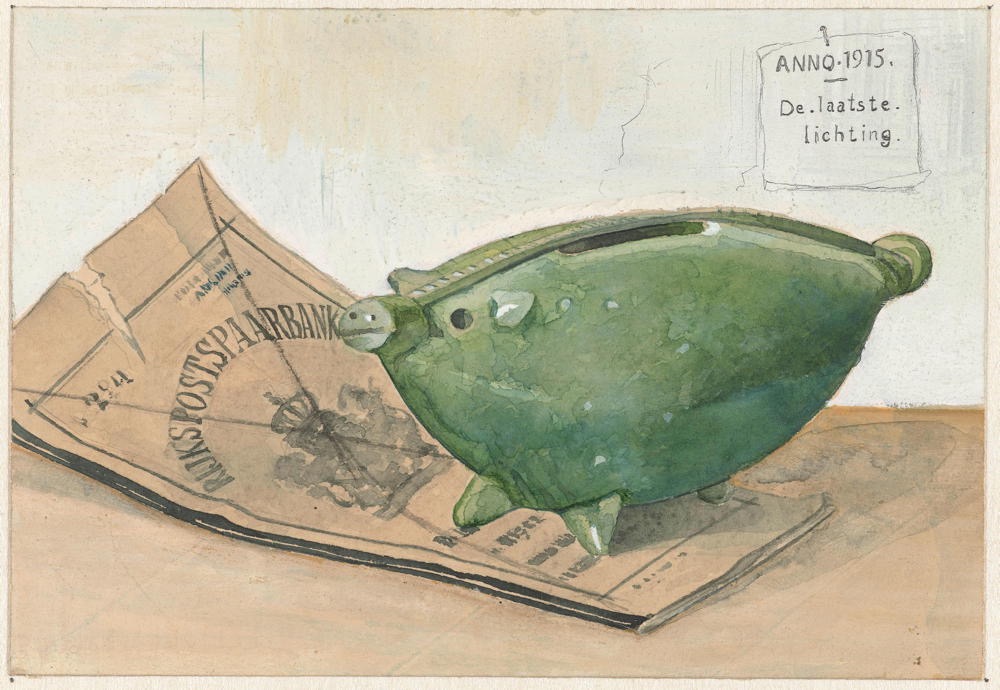
Francis Gilbert Attwood:
General Benjamin F. Butler's Nightmare:
Proposed Procession of the Unemployed
(19th century)
"What if we're already plenty …"
To this day, I am assailed by the same old come-ons promising to make me a great leader. When did this sort of promotion ever have traction? I cannot imagine Abraham Lincoln, who was undoubtedly the most outstanding leader of his time, enrolling with an equivalent teacher to learn the "secrets to success," and not just modest success, but the very best there ever was. This very attitude renders its message untenable and unbelievable, yet they persist. If they did not exist in Lincoln's time, though I feel confident they did, what is it about our time that sees such a proliferation of these? Some skills cannot be taught, for they are not acquired through coaching, counseling, or conventional teaching. Whatever that is, leadership probably stands near the top of this pile. However, above all other topics, it enjoys the most significant proliferation of teachers and preachers, promising what anyone qualified to become a great leader must undoubtedly be able to see right through. This thought leads me to suggest that only those destined to become mediocre leaders need ever apply to learn these secrets, though they'd properly be sworn to secrecy upon acceptance.
The secret about greatness might be that greatness holds few secrets.
Becoming
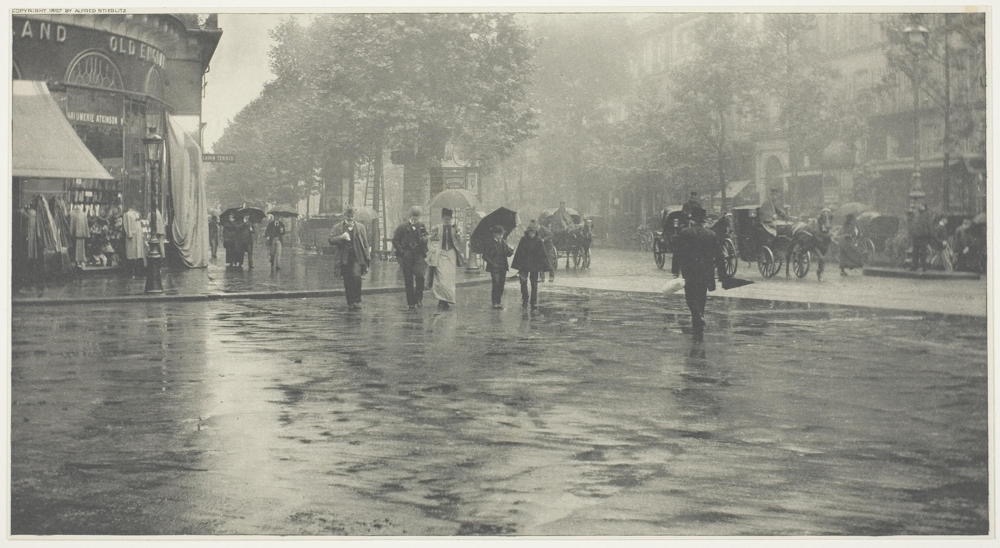
Alfred Stieglitz: A Wet Day on the Boulevard, Paris (1894, printed c. 1897)
"Becoming seems to be what we really are when we insist that we are anything at all."
Defining "done" was one enduring difficulty every project I ever worked on, led, or consulted with experienced. Some adopted the curious First Customer Shipped metric, which insisted that the project was done when the first customer's order was free on board a truck. Others presumed that the project had successfully tested fixes for and integrated all critical bug reports. In actual experience, though, the project team inevitably continued their efforts long after the designated completion date, for that first customer, upon receiving the first instance of the final product, would experience unanticipated difficulties that only the development team could resolve and additional critical bugs would emerge even after testing and integration were successfully completed. Eventually, the end product would be more or less integrated into the finished product maintenance stream, though members of the original development team might only partially divorce themselves from the product.
I learned that whatever the product developed, it never left a state of becoming.


